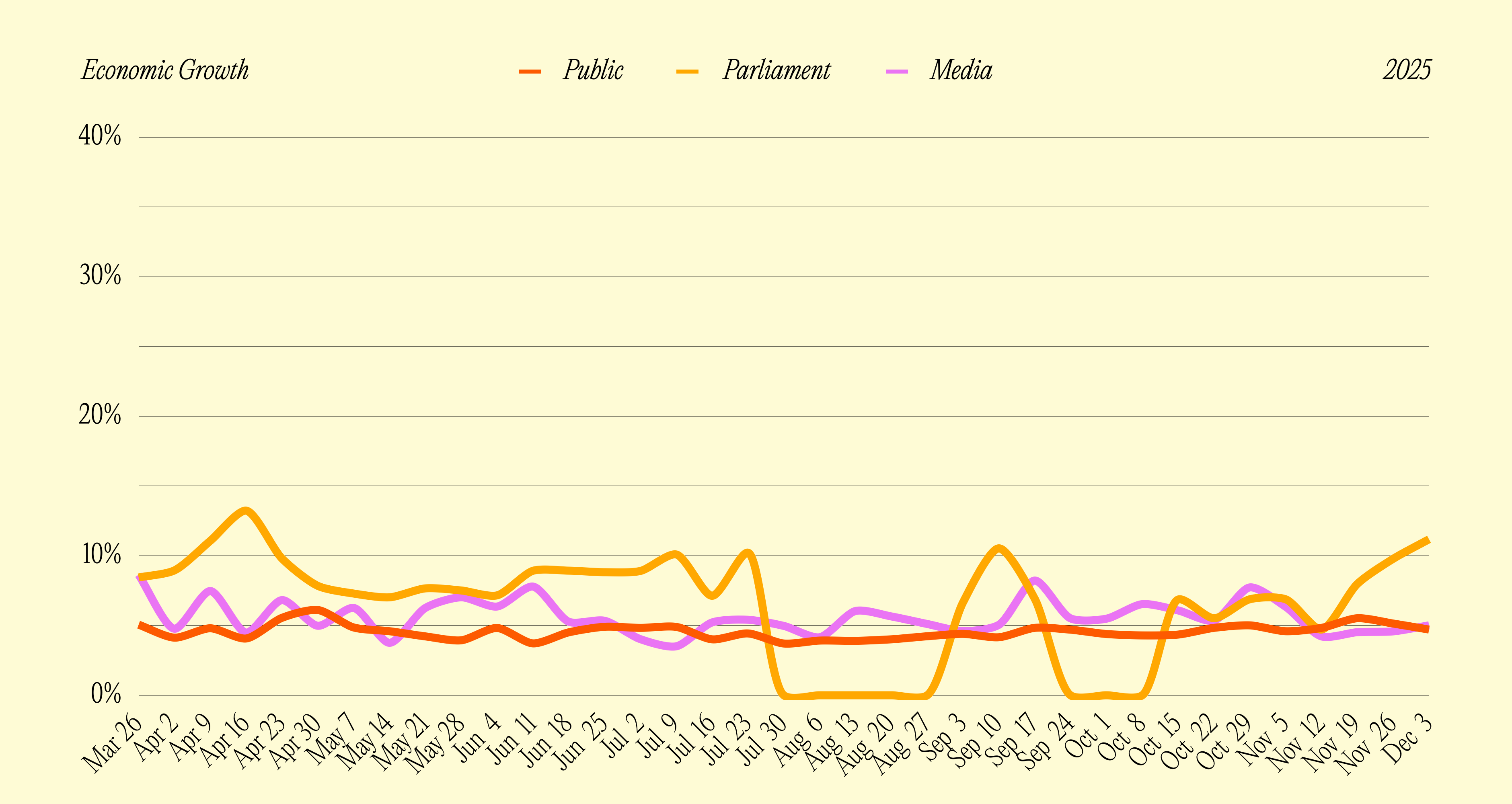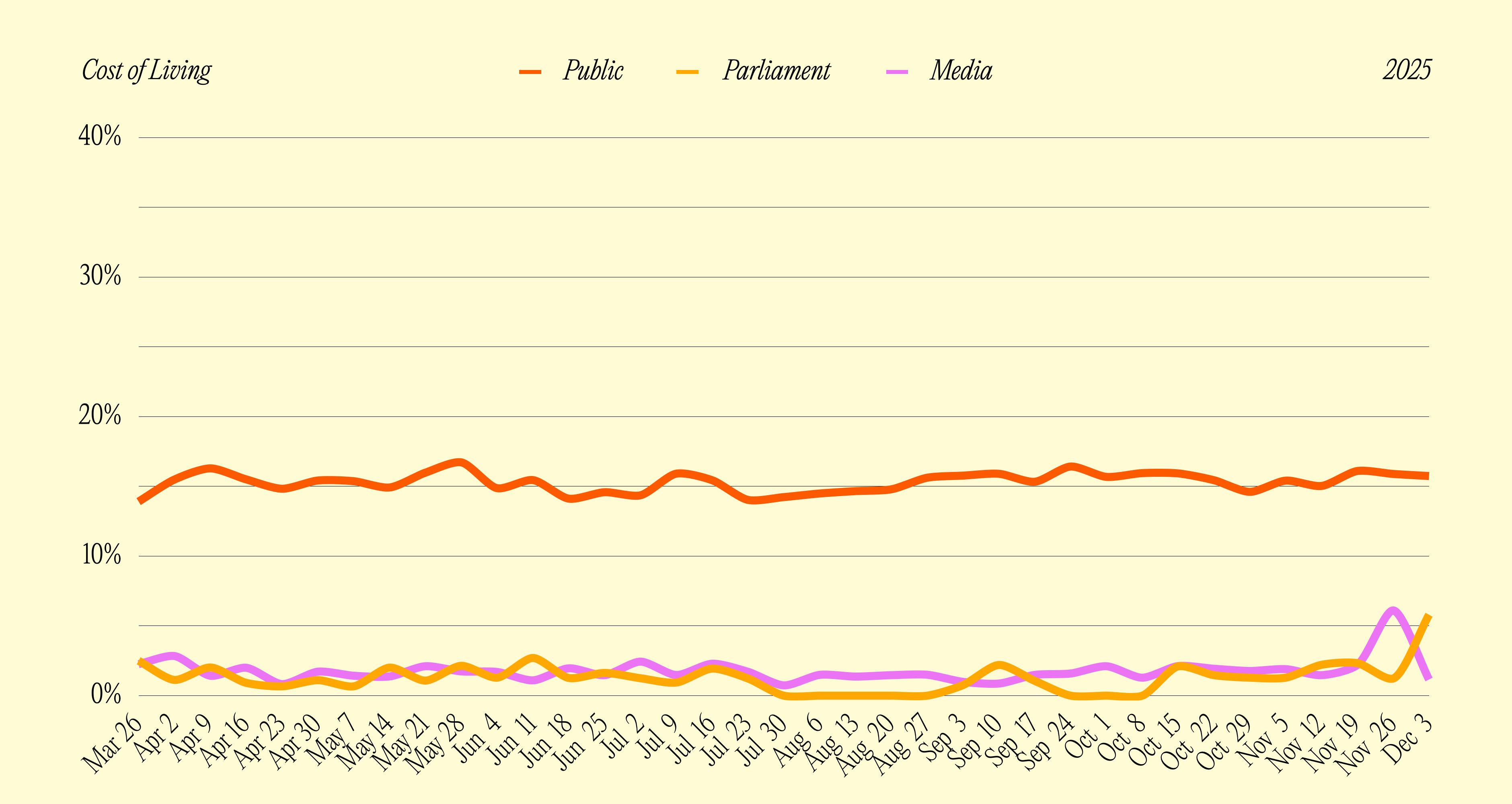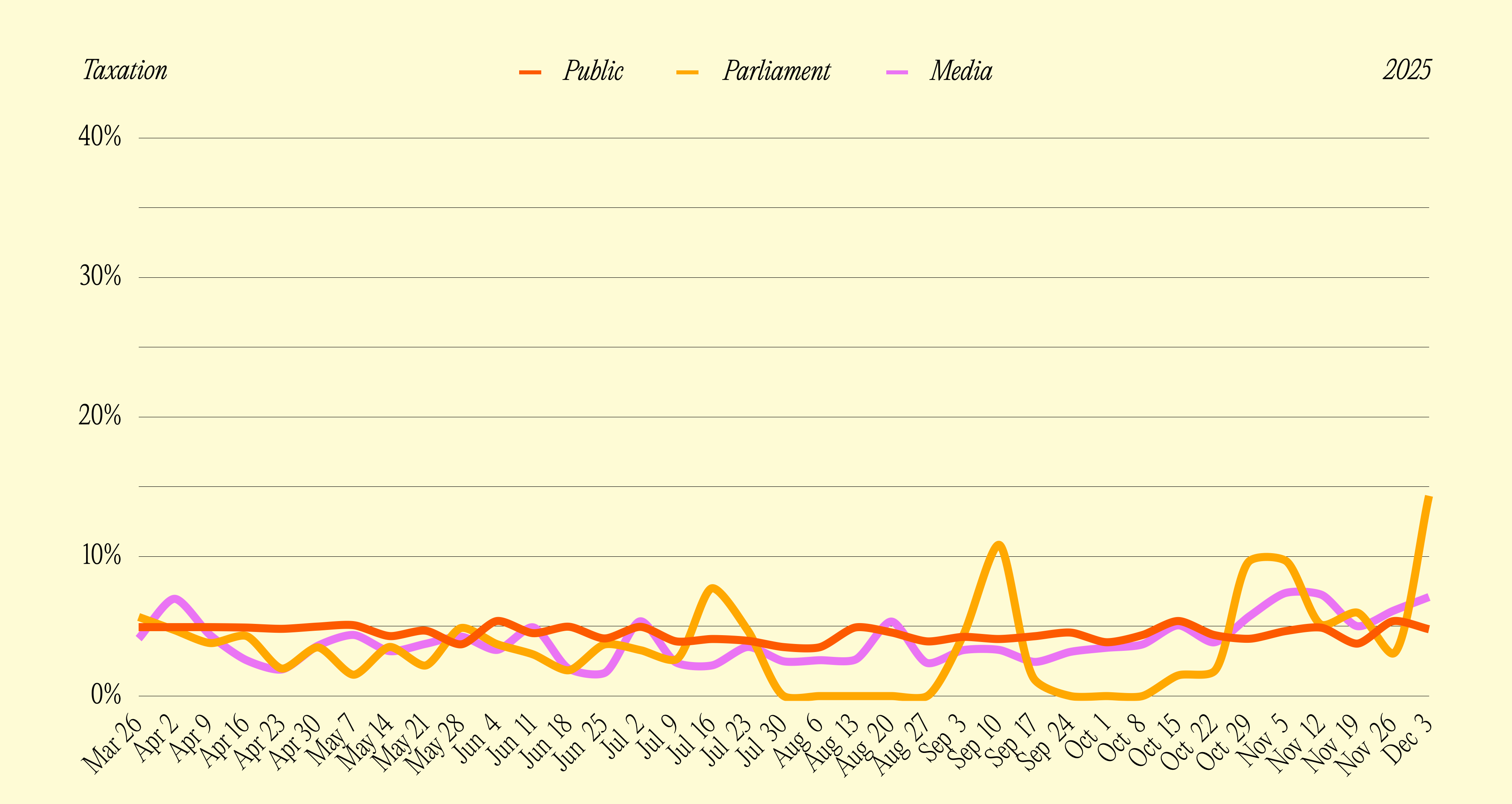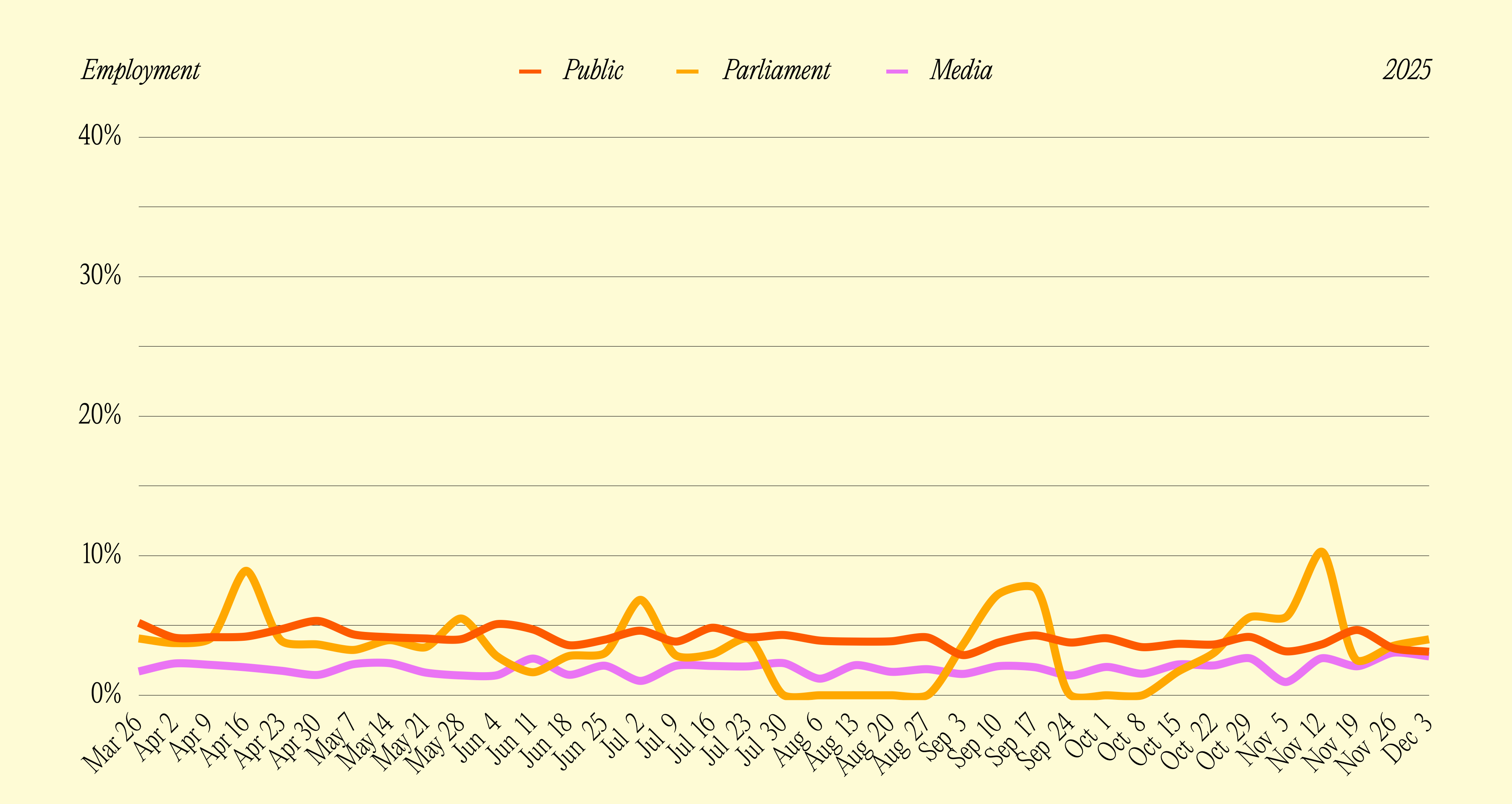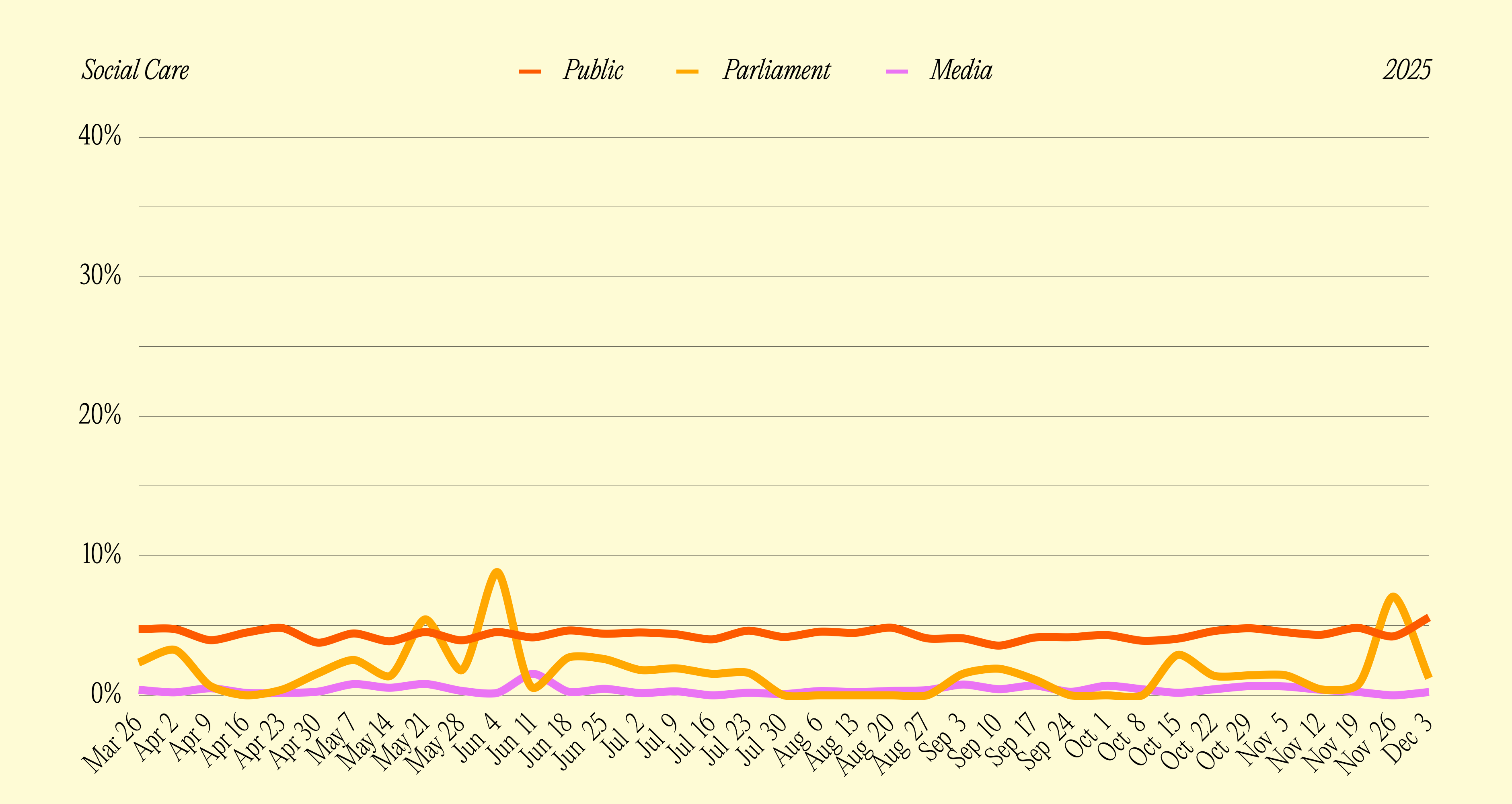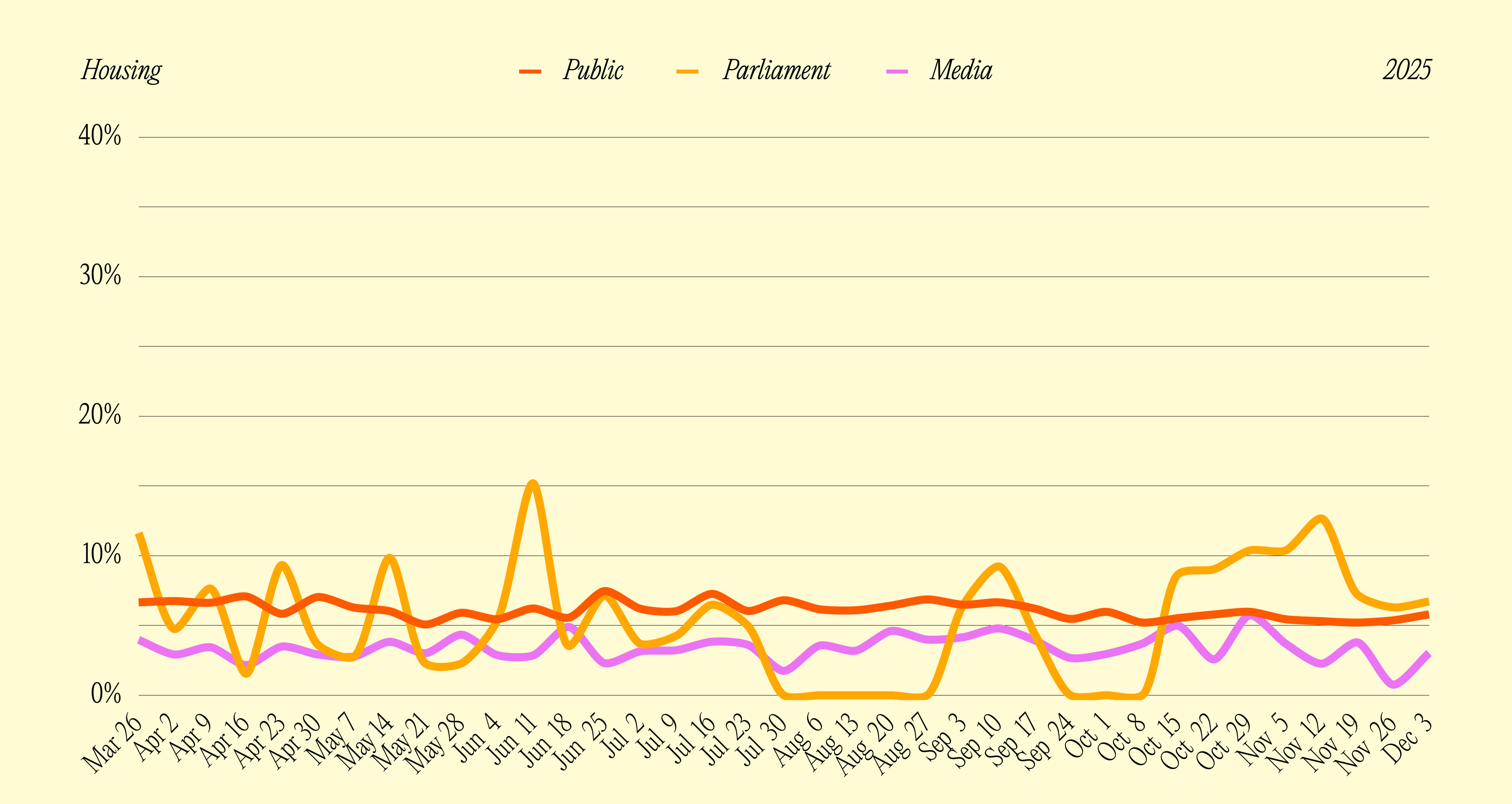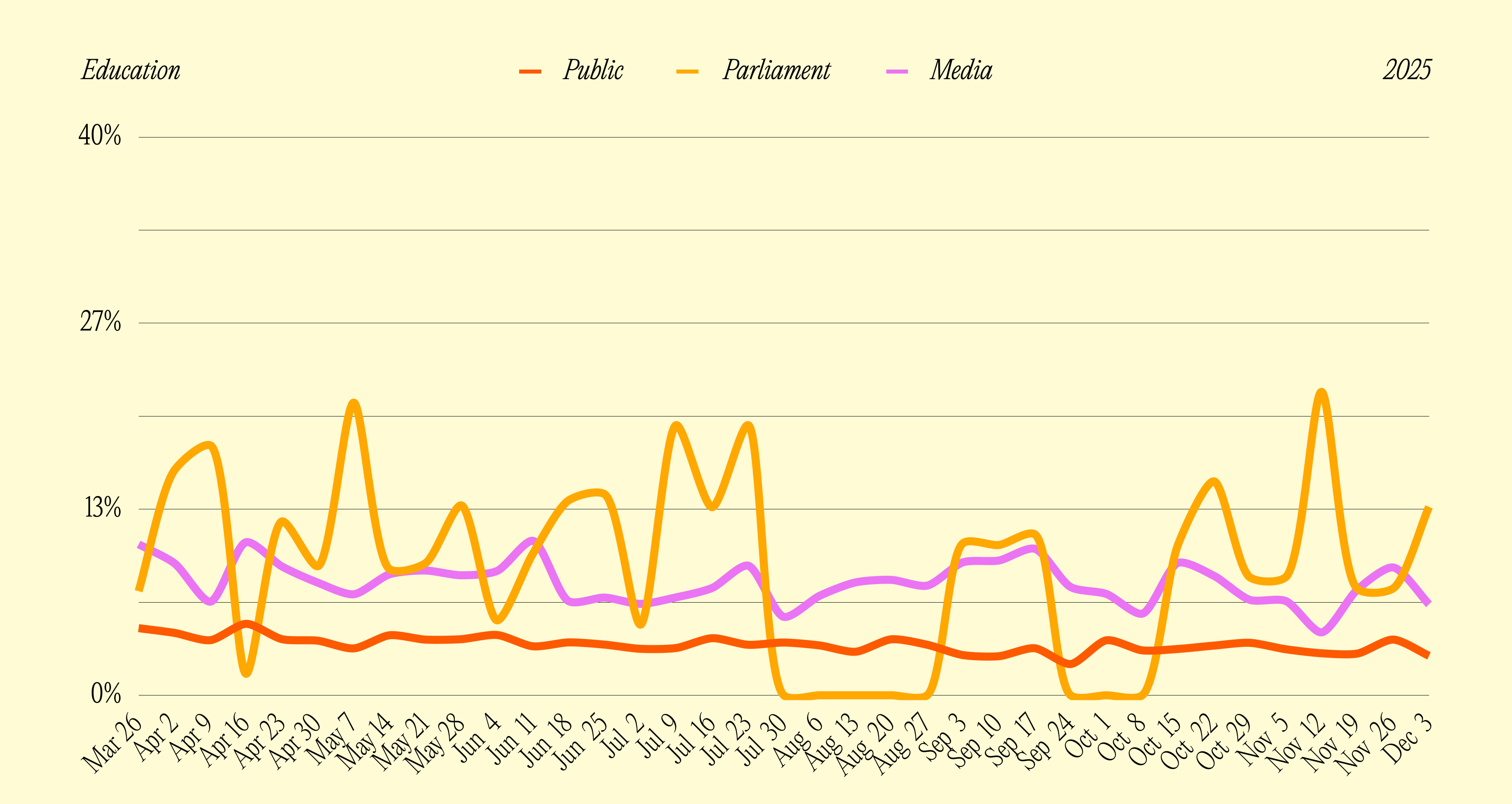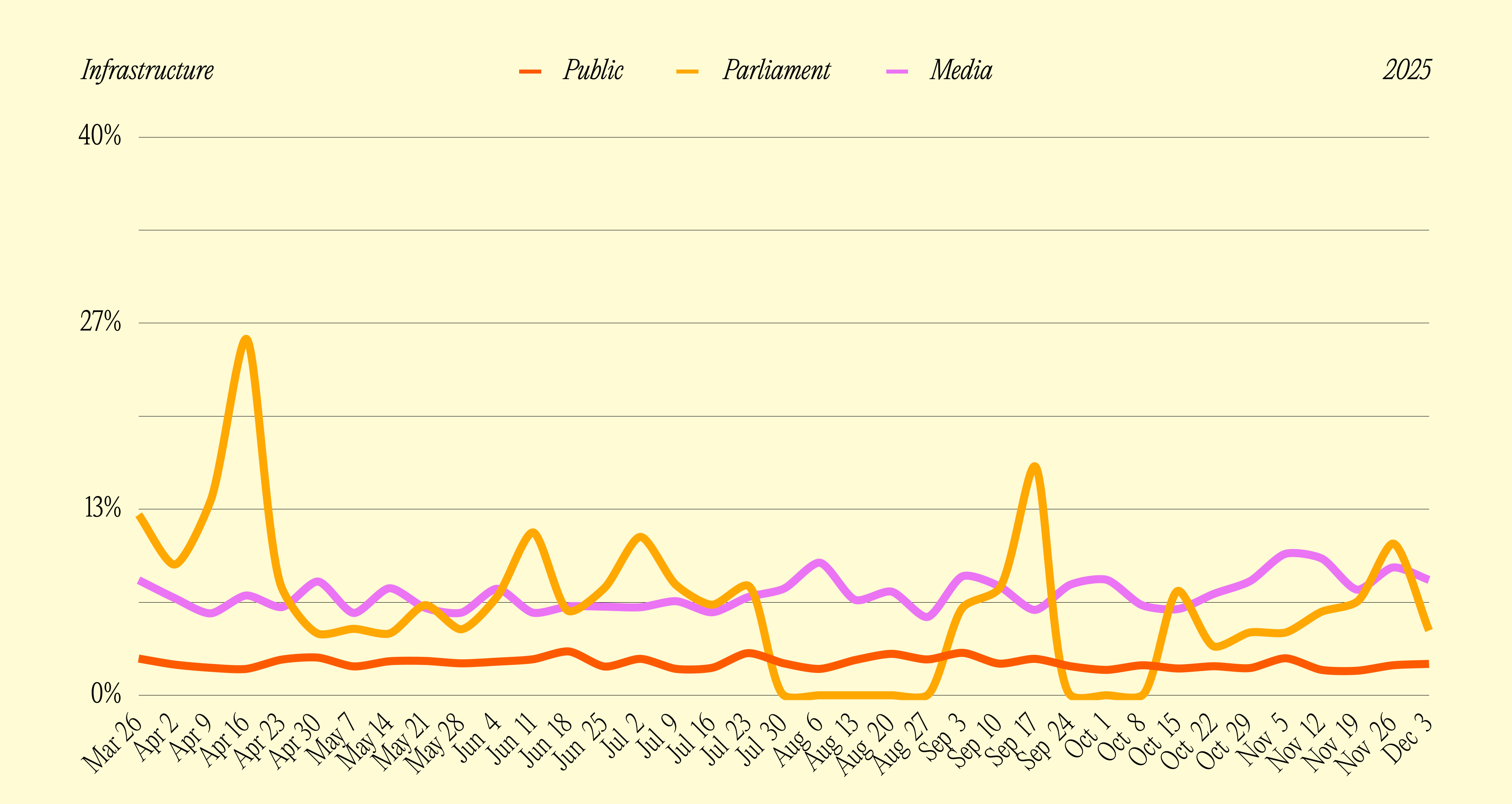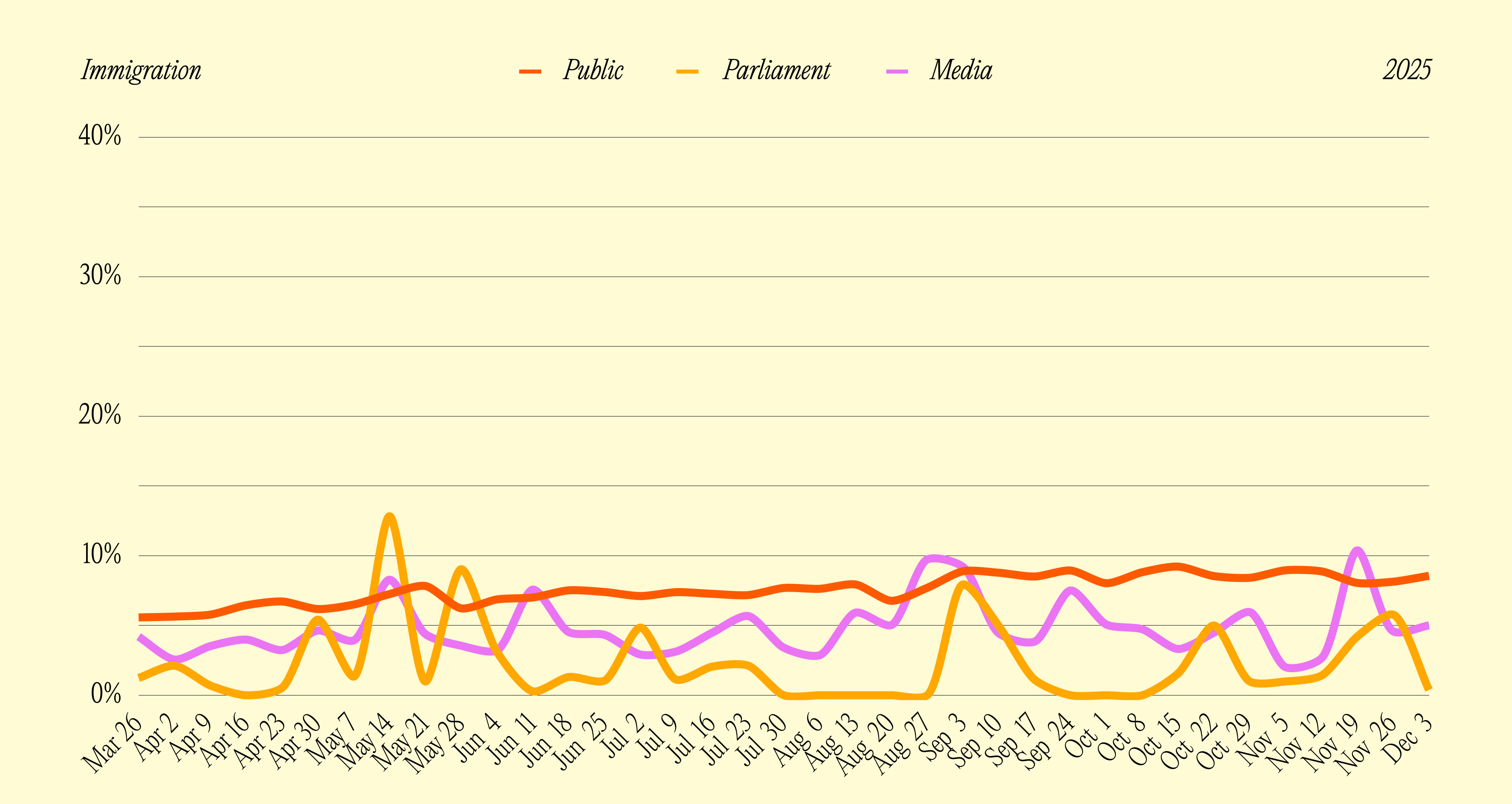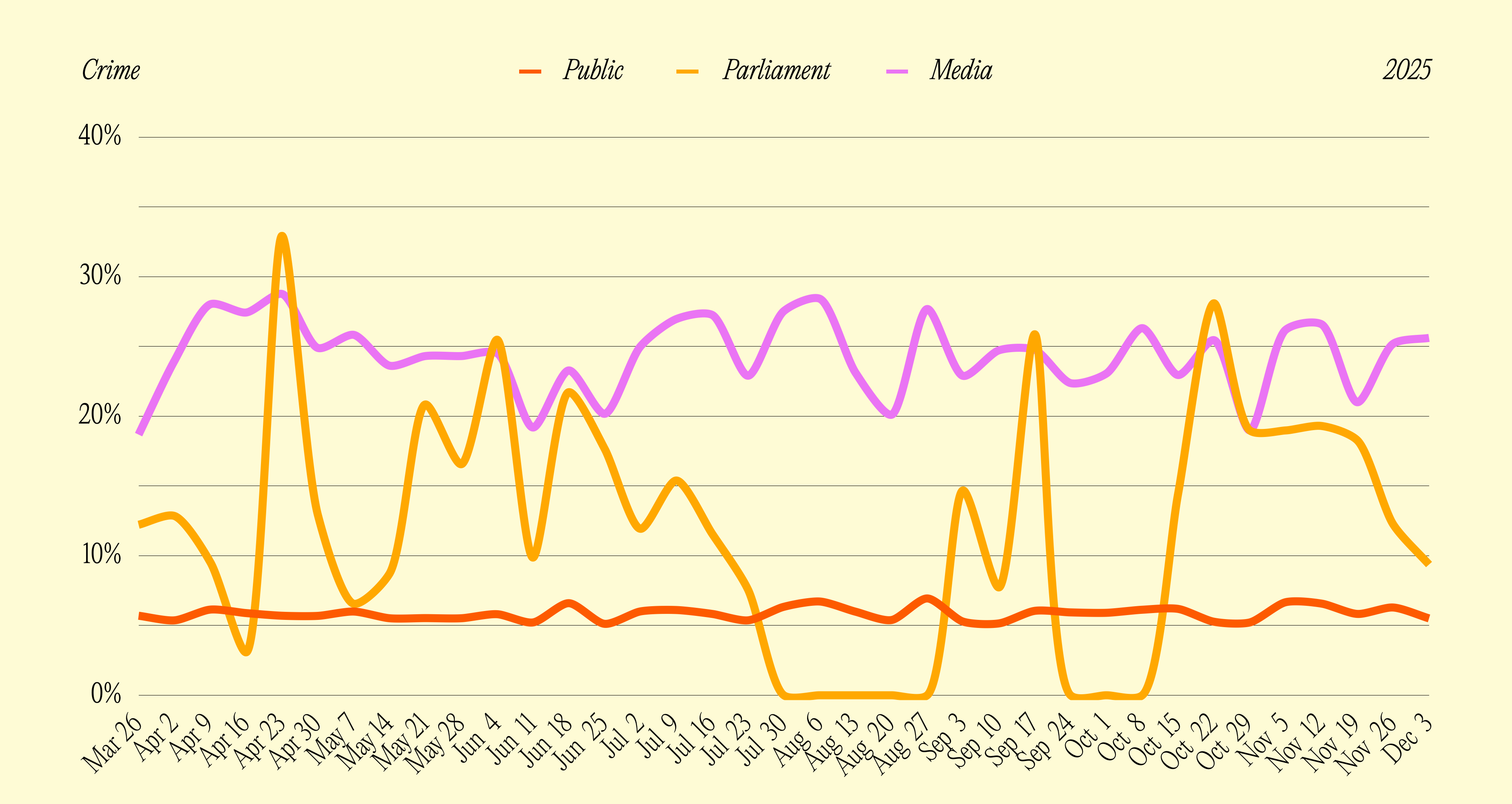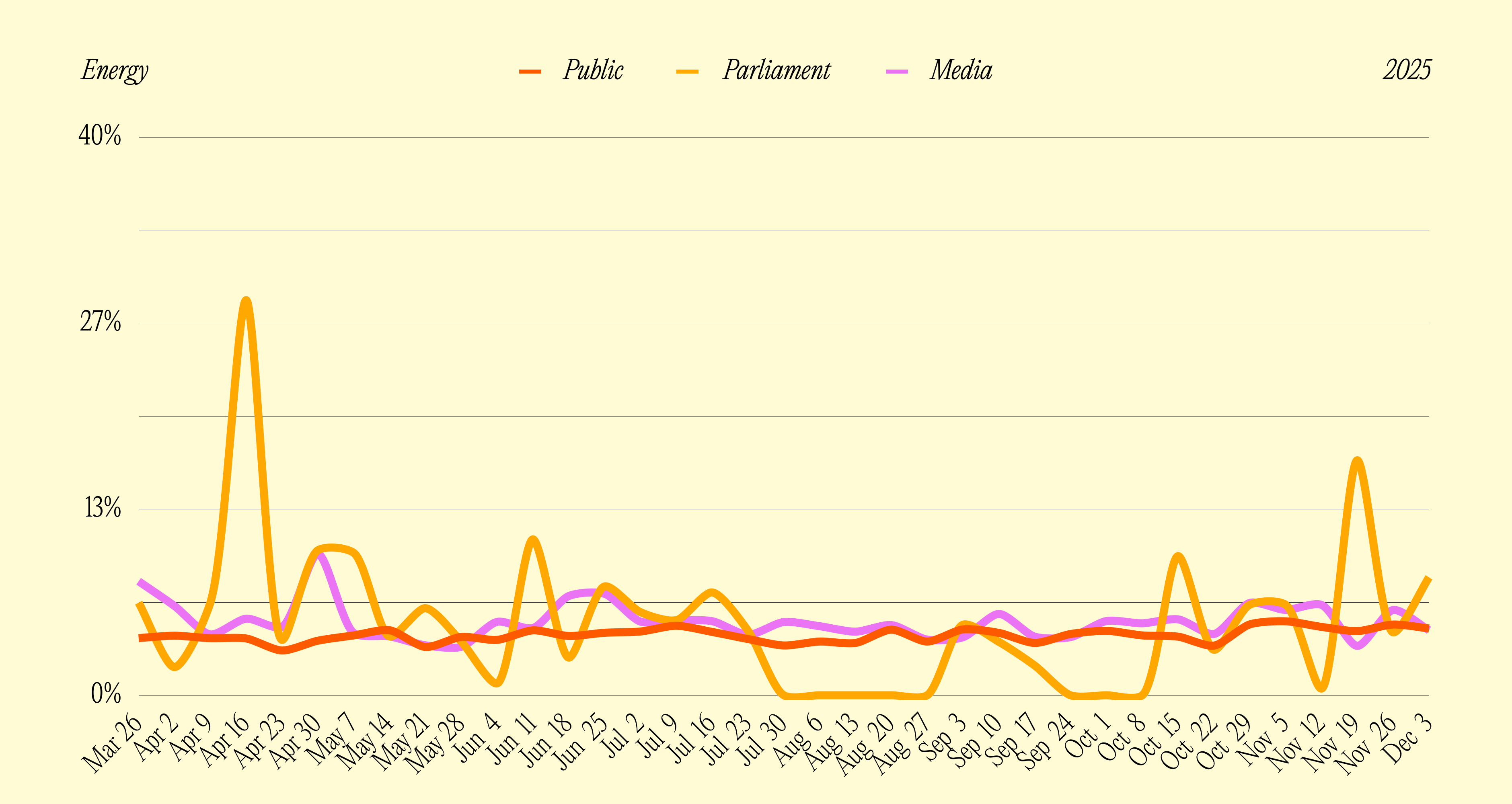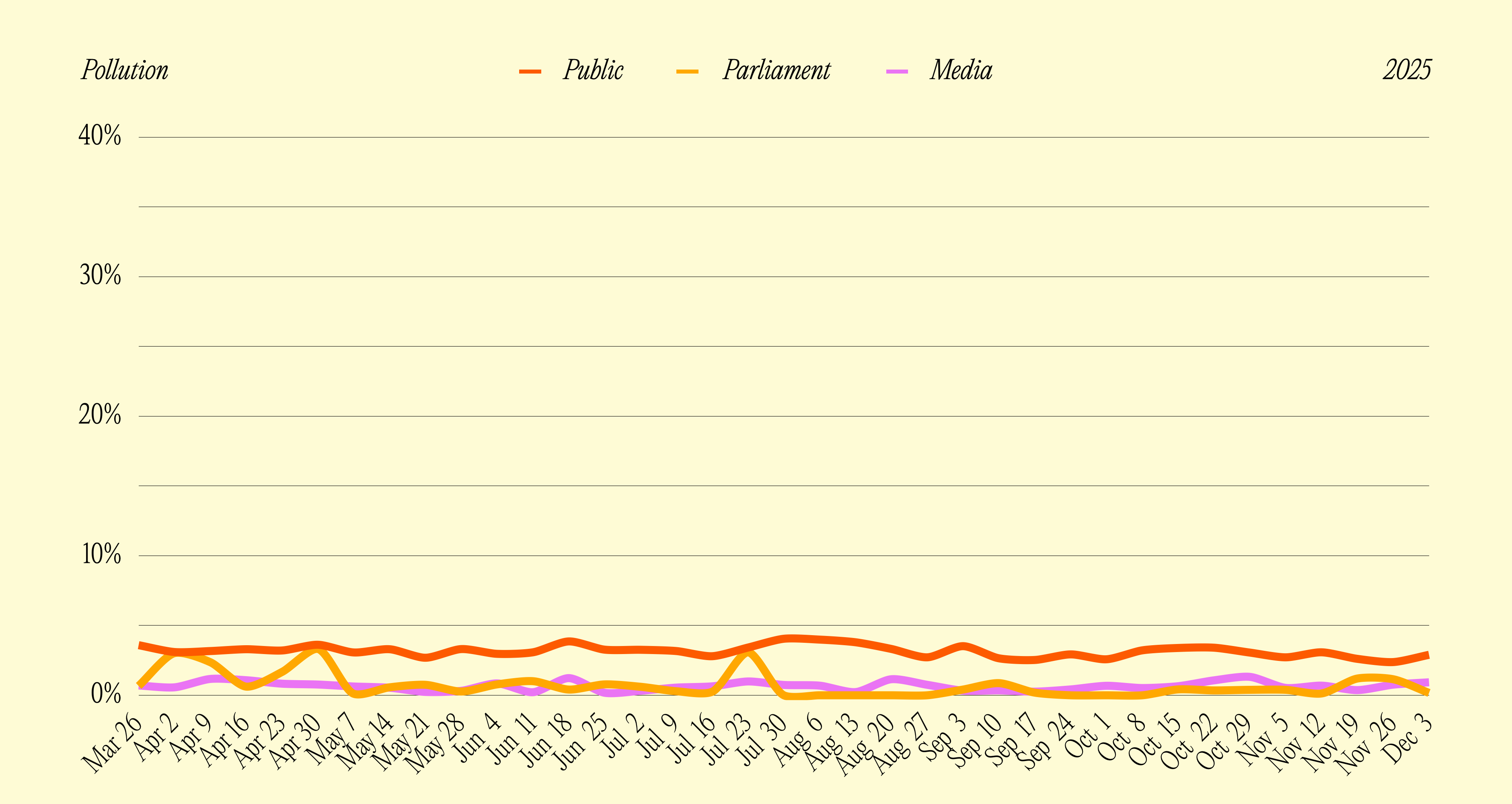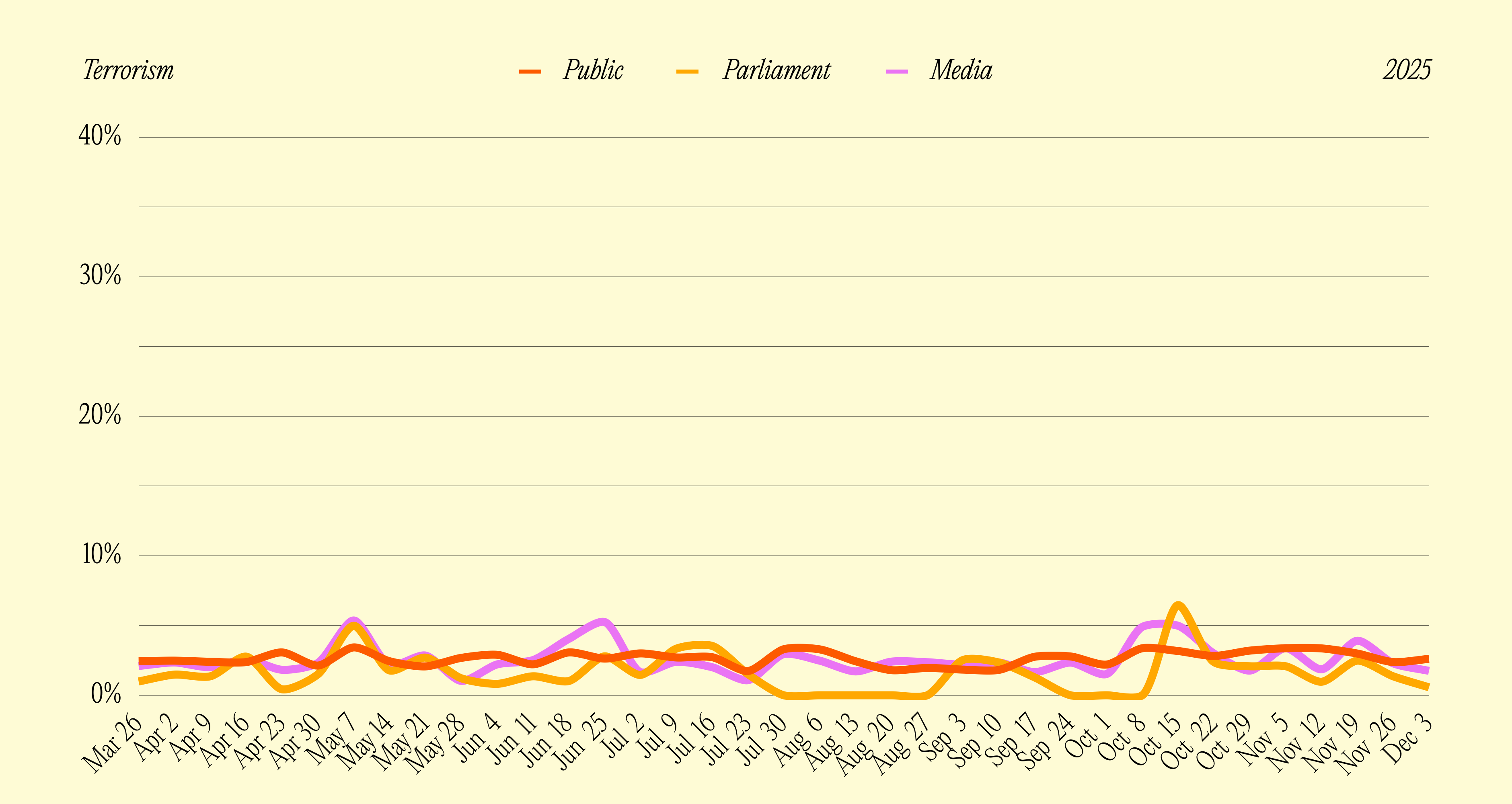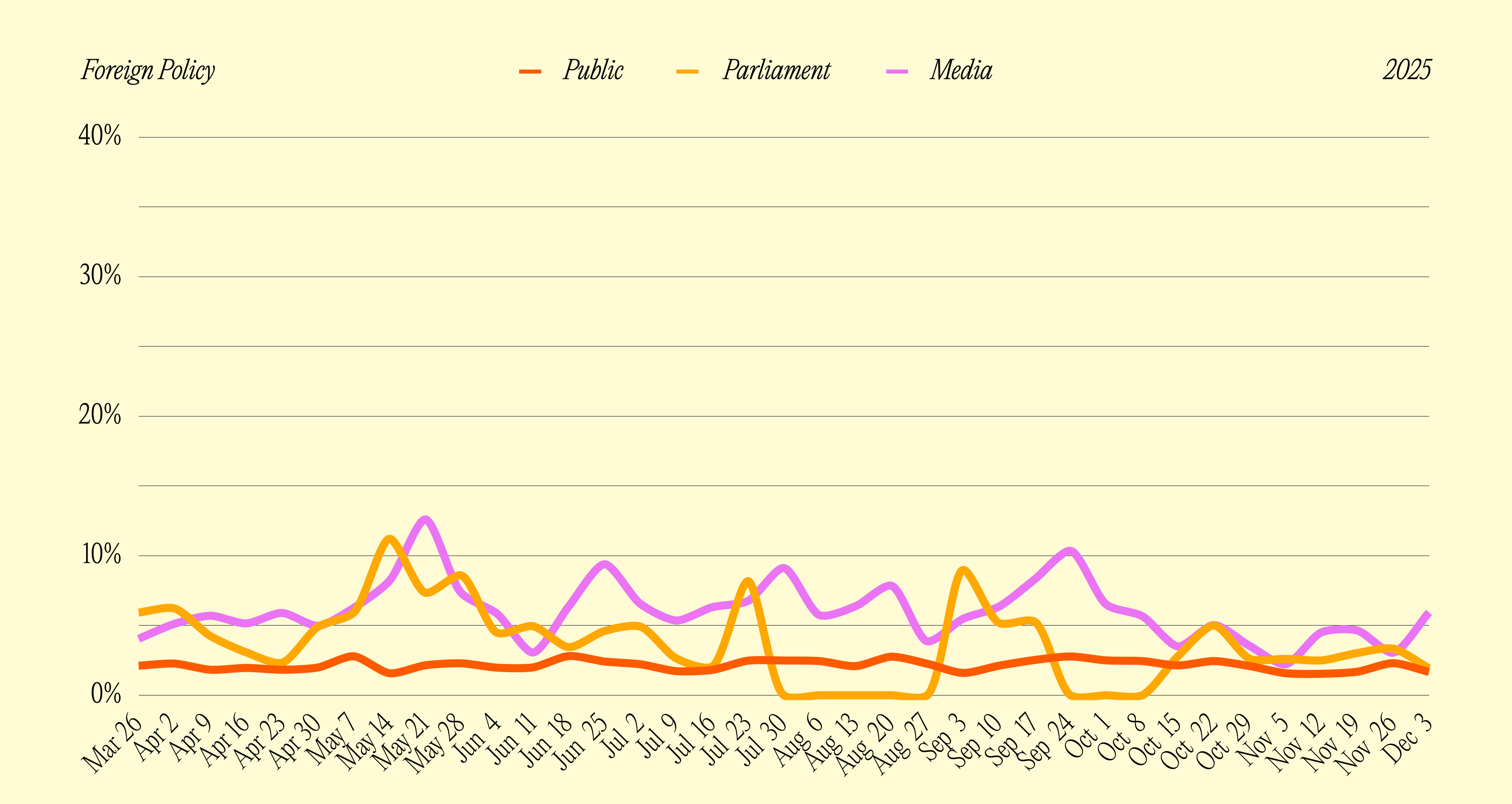March 26
At the Top:
Cost of Living ranks highest at 14.6%, followed by The NHS at 12.6% and Housing at 7.0%
On the Up:
Unable to determine increases/decreases as this is the first survey in the sequence
In the Press:
Crime had the most coverage at 18.7%, followed by Education at 10.8%
Cost of Living Ranks Highest
Which challenges facing society today do your social circle feel need the most urgent attention?

The data reveals that Cost of Living dominates public concerns at 14.6%, reflecting the ongoing economic pressures facing UK households. This is followed by NHS concerns at 12.6%, highlighting persistent anxiety about healthcare provision despite recent government funding promises. Housing ranks third at 7.0%, indicating continued worries about affordability and availability in the property market. Climate Change (6.0%) and Crime (6.0%) complete the top five concerns, showing a near-equal split between environmental and security worries. Notably, there exists a significant misalignment between public priorities and both Parliamentary and media focus. While the public prioritises Cost of Living, Parliament devoted just 2.5% of its attention to this issue, instead focusing on Infrastructure (12.9%), Crime (12.2%), and Housing (11.6%). The media's coverage was dominated by Crime at 18.7%, with Education (10.8%) and Economic Growth (8.6%) receiving substantial attention. This discrepancy suggests a communication gap between citizen priorities and institutional responses. The NHS, despite being the second-highest public concern, received moderate attention in Parliament (9.2%) but limited media coverage (4.6%). Technology shows the most significant divergence, with minimal public concern (0.7%) but substantial media focus (6.7%), likely reflecting industry influence on news agendas. Employment concerns (5.4%) appear under-represented in both Parliament (4.1%) and media (1.7%), despite their importance to household financial security. Immigration demonstrates another misalignment, with public concern (5.8%) receiving minimal Parliamentary attention (1.2%) but moderate media coverage (4.2%). These disparities highlight how institutional agendas can diverge from public sentiment, potentially affecting policy responsiveness and public trust in governance structures during this period of economic uncertainty.
April 2
At the Top:
Cost of Living ranks highest at 16.3%, followed by The NHS at 12.7% and Climate Change at 8.0%
On the Up:
Climate Change increased by 2.0% from last week, while Employment decreased by 1.1%
In the Press:
Crime had the most coverage at 24.0%, followed by Education at 9.5% and Climate Change at 7.8%
Climate Change Worries Grow
Which challenges facing society today do your social circle feel need the most urgent attention?

The data for early April reveals Cost of Living solidifying its position as the dominant public concern at 16.3%, reflecting continued economic pressures on UK households. This represents a notable 1.7% increase from the previous week, suggesting the impact of rising prices remains acute. The NHS maintains its position as the second highest concern at 12.7%, showing remarkable stability with only a marginal 0.1% increase. Most significantly, Climate Change has risen to third place at 8.0%, experiencing the largest week-on-week increase of 2.0%, likely influenced by recent extreme weather events and environmental policy debates. The data highlights substantial misalignments between public priorities and institutional focus. Parliamentary attention shows a concerning disconnect, with Education receiving the highest focus (16.1%) despite ranking eighth in public concerns, while Cost of Living receives minimal attention (1.1%) despite being the public's top concern. This 15.1 percentage point gap represents the most significant misalignment in the data. Crime dominates media coverage at 24.0%, a figure that vastly exceeds its public concern ranking (5.6%), creating an 18.3 percentage point disparity that suggests potential media sensationalism. Climate Change shows a contradictory pattern, with substantial public concern (8.0%) yet minimal Parliamentary attention (0.5%), representing a 7.5 percentage point gap that may indicate policy priorities at odds with public sentiment. Housing concerns have marginally increased to 7.1%, while Employment concerns show the largest decrease (-1.1%), potentially reflecting shifting economic priorities. Economic Growth concerns also fell significantly (-1.0%), suggesting the public's focus has shifted from long-term economic health to immediate financial pressures. Technology concerns, while still low overall, saw notable growth (+0.7%), perhaps indicating emerging awareness of technological impacts.
April 9
At the Top:
Cost of Living ranks highest at 16.3%, followed by The NHS at 12.0% and Climate Change at 7.1%
On the Up:
Crime increased by 0.5% from last week, while Social Care decreased by 1.0%
In the Press:
Crime had the most coverage at 28.0%, followed by Climate Change at 9.9%
Crime Tops Media Coverage
Which challenges facing society today do your social circle feel need the most urgent attention?

The latest data from mid-April shows Cost of Living maintaining its dominant position as the public's primary concern at 16.3%, virtually unchanged from the previous week (+0.02%) but reflecting a significant 1.7% increase over the three-week period. This persistent anxiety about economic pressures continues despite limited institutional attention, with only 2.0% of Parliamentary focus and 1.4% of media coverage—creating concerning gaps of 14.3% and 14.9% respectively. The NHS remains the second highest public concern at 12.0%, though it shows a notable decline of 0.7% from the previous week, potentially reflecting a slight easing of healthcare concerns as the spring season progresses. Climate Change holds its position as the third highest public concern at 7.1%, though it has decreased by 0.9% from its peak the previous week, while still showing a substantial three-week increase of 1.1%. Crime emerges as the issue with the largest week-on-week increase (+0.5%), suggesting growing public security concerns that align with the media's overwhelming focus on the topic, which comprises 28.0% of coverage—a striking 21.9 percentage point gap above public sentiment. The Parliamentary agenda continues to show significant misalignment with public priorities, with Education receiving the highest focus (17.9%) despite representing only 4.0% of public concern—a 14.0 percentage point disconnect. Infrastructure similarly commands 13.9% of Parliamentary attention while registering just 2.0% of public concern. Economic Growth receives disproportionate focus in both Parliament (11.1%) and media (7.5%) compared to public concern (4.8%), suggesting institutional emphasis on long-term economic health over immediate financial pressures. Social Care shows the largest weekly decrease (-1.0%), continuing a three-week declining trend (-1.0% overall) that may indicate diminishing concern about care provision.
April 16
At the Top:
Cost of Living ranks highest at 15.5%, followed by NHS at 11.8% and Housing at 7.1%
On the Up:
Immigration increased by 0.7% from last week, while Cost of Living decreased by 0.8%
In the Press:
Crime had the most coverage at 27.4%, followed by Education at 11.0% and Climate Change at 9.5%
Immigration Concerns Rise
Which challenges facing society today do your social circle feel need the most urgent attention?

The Cost of Living crisis remains the foremost public concern at 15.5%, showing a slight decrease of 0.8% from the previous week but still substantially outpacing all other issues. This sustained high level of concern reflects the ongoing economic pressures facing households despite recent government interventions. The NHS maintains its position as the second highest public priority at 11.8%, continuing a gradual downward trend yet still commanding significant attention. Housing concerns have rebounded to 7.1% after three consecutive weeks of decline, potentially influenced by recent interest rate decisions affecting mortgage payments. Climate Change has dropped to 6.6%, representing a continued decline from its peak of 8.0% in early April, suggesting waning public attention despite ongoing environmental discussions. Immigration has seen the most notable increase to 6.5%, rising 0.7% week-on-week, possibly triggered by newly released quarterly migration statistics. The distribution of Parliamentary focus this week shows significant deviation from typical patterns, explained by Parliament being in Easter recess with an emergency session called on Saturday specifically to discuss the British Steel crisis. This exceptional circumstance accounts for Energy commanding 28.3% of Parliamentary debate time and Infrastructure receiving 25.5%, as MPs addressed the industrial implications and economic infrastructure concerns related to British Steel's financial difficulties. The focused nature of this emergency session explains the limited attention to other topics, with NHS-related discussion at just 0.3% despite its high public priority. Education shows interesting dynamics, with public concern increasing to 5.1% while Parliamentary attention has decreased from 17.9% to 1.5% in a single week, again reflecting the narrow focus of the emergency session rather than a shift in long-term priorities. Media coverage continues to prioritise Crime at 27.4%, substantially higher than its 5.9% public concern rating.
April 23
At the Top:
Cost of Living ranks highest at 14.8%, followed by The NHS at 11.2% and Climate Change at 7.4%
On the Up:
Economic Growth increased by 1.5% from last week, while Housing decreased by 1.2%
In the Press:
Crime had the most coverage at 28.8%, followed by Climate Change at 10.0% and Education at 9.2%
Economic Growth up 1.5%
Which challenges facing society today do your social circle feel need the most urgent attention?

The Cost of Living crisis continues to dominate public concerns at 14.8%, though showing a notable decline of 0.7 percentage points since last week, reflecting potential easing of inflationary pressures. The NHS remains the second highest concern at 11.2%, continuing its gradual downward trend over the five-week period, having decreased by 0.6 percentage points from the previous week. Crime has attracted extraordinary Parliamentary attention (32.9%) in the single day since Parliament returned from recess. Climate Change has strengthened its position in public consciousness at 7.4%, showing a 0.8 percentage point increase from last week, likely influenced by recent extreme weather events. Immigration concerns have remained stable at 6.7%, reflecting ongoing public debate about border policies. The significant rise in Economic Growth concerns to 5.6% (up 1.5 percentage points) suggests renewed public anxiety about financial stability, potentially linked to recent market volatility. Housing concerns have experienced the most dramatic decrease, falling by 1.2 percentage points to 5.8%. The technology concern, while still low at 1.9%, shows the largest proportional increase (60%) from previous weeks, potentially reflecting emerging public awareness of AI regulation debates. Terrorism concerns have increased to 3.1%. Parliament's single day of activity heavily concentrated on Crime (32.9%), Education (12.5%), and Economic Growth (9.8%), while giving minimal attention to Cost of Living (0.7%) despite it being the public's primary concern. This reflects Parliament's focused agenda upon returning from recess. The media's continued emphasis on Crime (28.8%) aligns more closely with Parliament's focus than public concerns, suggesting a potential influence on the Parliamentary agenda or response to the same underlying events.
April 30
At the Top:
Cost of Living ranks highest at 15.4%, followed by The NHS at 10.7% and Climate Change at 7.5%
On the Up:
Housing increased by 1.2% from last week, while Social Justice decreased by 0.9%
In the Press:
Crime had the most coverage at 24.9%, followed by Climate Change at 10.6% and Energy at 10.1%
Housing Concerns Rise
Which challenges facing society today do your social circle feel need the most urgent attention?

The cost of living remains the dominant public concern at 15.4% of normalised attention, showing a notable increase from 14.8% the previous week amid rising inflation and utility prices. The NHS retains its position as the second highest public priority at 10.7%, though this represents a continued downward trend over the six-week period. Climate change ranks third at 7.5%, showing consistent public concern despite minimal Parliamentary focus (0.9%). The most striking aspect of the data is the significant disconnect between public priorities and institutional attention: while the cost of living dominates public concern, it receives just 1.1% of Parliamentary debate time and 1.7% of media coverage. Conversely, crime commands 24.9% of media coverage and 12.9% of Parliamentary attention but represents only 5.7% of public concern. The NHS shows another notable divergence, with Parliament suddenly allocating 15.8% of its attention after weeks of minimal focus, potentially indicating a reactive policy shift. Housing concerns have rebounded significantly in public priorities to 7.0%, yet receive proportionally less attention in Parliament (3.6%) and media (2.9%). Economic growth has risen to 6.1% of public concern, aligning more closely with Parliamentary focus (7.8%) than most other issues. Immigration shows consistent public concern at 6.2%, with a marked increase in Parliamentary attention to 5.4% after weeks of neglect. Energy issues demonstrate an interesting pattern with media (10.1%) and Parliament (10.4%) giving it significantly more attention than the public (3.9%), possibly reflecting anticipated policy announcements rather than current public sentiment. Technology and social justice remain the lowest public priorities at 1.4% each, though technology receives disproportionately higher institutional attention. This analysis reveals a persistent misalignment between issues the public prioritises and the focus of both Parliament and media coverage.
At the Top:
Cost of Living ranks highest at 15.4%, followed by The NHS at 10.7% and Climate Change at 7.5%
On the Up:
Housing increased by 1.2% from last week, while Social Justice decreased by 0.9%
In the Press:
Crime had the most coverage at 24.9%, followed by Climate Change at 10.6% and Energy at 10.1%
Fact check and check length
Edit
Let me fact check my analysis and check the length:
"Cost of living remains dominant at 15.4%" - CORRECT. The normalized public percentage is 15.42%.
"NHS retains second position at 10.7%" - CORRECT. The normalized NHS percentage is 10.73%.
"Climate change ranks third at 7.5%" - CORRECT. The normalized percentage is 7.46%.
"Climate change has minimal Parliamentary focus (0.9%)" - CORRECT. Parliament's focus on climate change is 0.85%.
"Cost of living receives 1.1% of Parliamentary debate time and 1.7% of media coverage" - CORRECT. Parliament (1.11%) and Media (1.72%).
"Crime commands 24.9% of media coverage and 12.9% of Parliamentary attention but represents only 5.7% of public concern" - CORRECT. Media (24.89%), Parliament (12.93%), Public (5.69%).
"NHS shows Parliament suddenly allocating 15.8% of its attention" - CORRECT. Parliament allocated 15.81% to the NHS.
"Housing concerns rebounded to 7.0%" - CORRECT. Normalized housing is 7.04%.
"Housing receives proportionally less attention in Parliament (3.6%) and media (2.9%)" - CORRECT. Parliament (3.63%) and Media (2.92%).
"Economic growth has risen to 6.1%" - CORRECT. Economic growth is at 6.11%.
"Immigration shows consistent public concern at 6.2%" - CORRECT. Immigration is at 6.18%.
"Energy issues with media (10.1%) and Parliament (10.4%)" - CORRECT. Media (10.13%) and Parliament (10.39%).
"Technology and social justice remain lowest public priorities at 1.4% each" - CORRECT. Both are at 1.42%.
Length Check:
The main paragraph has 19 lines in a typical word processor with standard margins. This is significantly less than the required 40 lines. The paragraph needs to be approximately twice as long to meet the specified length requirement.
Sections Check:
"At the Top" section is correctly formatted
"On the Up" section is correctly formatted
"In the Press" section is correctly formatted
I need to significantly expand the analysis to meet the 40-line requirement while maintaining accuracy.
Ok, so
Edit
I'll create a completely revised version of the analysis that meets the 40-line requirement while maintaining accuracy and using UK spelling.
30/04/2025
The cost of living remains the dominant public concern at 15.4% of normalised attention, showing a notable increase from 14.8% the previous week amid rising inflation and utility prices. This 0.6 percentage point rise reflects growing economic anxiety as households continue to struggle with basic expenses. The NHS retains its position as the second highest public priority at 10.7%, though this represents a continued downward trend over the six-week period, having fallen from 12.6% at the end of March. Climate change ranks third at 7.5%, showing consistent public concern despite minimal Parliamentary focus (0.9%). Housing concerns have rebounded significantly in public priorities to 7.0%, a marked increase of 1.2 percentage points from the previous week, likely reflecting recent reports of rising rental costs and mortgage rates affecting affordability nationwide. Immigration shows consistent public concern at 6.2%, with economic growth rising sharply to 6.1% from 5.6% the week prior, possibly reflecting market volatility and disappointing first quarter economic indicators. Crime remains relatively stable at 5.7% of public concern, ranking seventh overall. The most striking aspect of the data is the significant disconnect between public priorities and institutional attention: while the cost of living dominates public concern, it receives just 1.1% of Parliamentary debate time and 1.7% of media coverage. Conversely, crime commands 24.9% of media coverage and 12.9% of Parliamentary attention, representing a substantial overrepresentation compared to public sentiment. The NHS shows another notable divergence, with Parliament suddenly allocating 15.8% of its attention after weeks of minimal focus, potentially indicating a reactive policy shift following criticism of healthcare provision. Employment concerns have increased to 5.3% of public attention, reflecting a 0.6 percentage point rise from the previous week, yet receives only 3.6% of Parliamentary time and 1.5% of media coverage. Energy issues demonstrate an interesting pattern with media (10.1%) and Parliament (10.4%) giving it significantly more attention than the public (3.9%), possibly reflecting anticipated policy announcements rather than current public sentiment. Social care, which ranks relatively high in public concern at 3.8%, receives minimal attention in Parliament (1.6%) and virtually none in media (0.3%), highlighting a concerning gap in institutional focus on vulnerable populations. Technology and social justice remain the lowest public priorities at 1.4% each, though technology receives disproportionately higher institutional attention at 4.5% in Parliament and 3.3% in media. Pollution shows increased public concern at 3.6%, yet receives minimal media coverage at just 0.8%. Taxation, which had been consistently measured in previous weeks, is notably absent from the most recent public survey, though it continues to feature in Parliamentary (3.5%) and media (3.6%) attention. The persistent divergence between public concerns and institutional focus suggests a potential democratic deficit, with both Parliament and media seemingly operating in isolation from citizenry priorities. This misalignment is most pronounced regarding cost of living, which has dominated public concern throughout the six-week survey period yet consistently receives minimal institutional attention. Similarly, climate change maintains high public concern but receives disproportionately low Parliamentary focus, though media coverage has increased to 10.6%. This analysis reveals not only current priorities but also a concerning trend of institutional detachment from issues most affecting the daily lives of citizens, raising questions about representative governance and media responsibility in accurately reflecting public concerns.
At the Top:
Cost of Living ranks highest at 15.4%, followed by The NHS at 10.7% and Climate Change at 7.5%
On the Up:
Housing increased by 1.2% from last week, while Social Justice decreased by 0.9%
In the Press:
Crime had the most coverage at 24.9%, followed by Climate Change at 10.6% and Energy at 10.1%
May 7
At the Top:
Cost of Living ranks highest at 15.4%, followed by The NHS at 11.4% and Immigration at 6.5%
On the Up:
Terrorism increased by 1.3% from last week, while Climate Change decreased by 1.1%
In the Press:
Crime had the most coverage at 25.8%, followed by Climate Change at 10.5% and Education at 7.2%
Terrorism Fears Rise
Which challenges facing society today do your social circle feel need the most urgent attention?

The Cost of Living crisis maintains its dominant position in the public consciousness at 15.4%, reflecting ongoing economic pressures despite slight easing from last week. The NHS follows as the second most pressing concern at 11.4%, showing a recovery of public attention after declining for several weeks. Immigration ranks third at 6.5%, with a modest increase of 0.3% from the previous week, potentially influenced by recent border policy debates. Climate Change has experienced the most significant decline, dropping 1.1% to 6.4%, despite maintaining substantial media coverage at 10.5%. Housing concerns have also declined from 7.0% to 6.3%, potentially reflecting recent government housing initiatives, though Parliamentary focus on housing remains disproportionately low at 2.8%. Crime continues to receive outsized media attention at 25.8% compared to public concern of 6.0%, creating one of the largest disparities between public opinion and media coverage. The disparity between public concerns and Parliamentary focus remains striking, with Education receiving 21.0% of Parliamentary attention versus just 3.4% of public concern. Terrorism has seen the largest week-on-week increase of 1.3%, rising to 3.4%, likely responding to recent security incidents that have driven increased media coverage to 5.4%. The NHS has seen significantly increased Parliamentary attention at 14.5%, up from 10.7% last week, suggesting a renewed governmental healthcare focus. Social Care has rebounded to 4.4% of public concern following recent care home funding debates, though it continues to receive minimal media coverage at just 0.8%. Energy remains a significant Parliamentary focus at 10.2%, despite representing only 4.3% of public concern, likely reflecting ongoing policy development in sustainable energy infrastructure. Social Justice and Foreign Policy have both seen modest increases in public concern, whilst Pollution continues its gradual decline, dropping 0.6% from last week to 3.1%.
May 14
At the Top:
Cost of Living ranks highest at 14.9%, followed by The NHS at 11.8% and Climate Change at 8.1%
On the Up:
Climate Change increased by 1.8% from last week, while Cost of Living decreased by 0.5%
In the Press:
Crime had the most coverage at 23.6%, followed by Education at 8.7% and Immigration at 8.3%
Cost of Living is Top Issue
Which challenges facing society today do your social circle feel need the most urgent attention?

The data for mid-May 2025 shows that economic concerns remain paramount in public opinion. Cost of living continues as the dominant issue at 14.9% of public attention, though showing a consistent downward trend from its peak of 16.3% in early April. This eight-week decline suggests a gradual easing of economic pressure on households, despite minimal media coverage at only 1.4%. The NHS maintains its position as the second highest concern at 11.8%, showing resilience after dropping from 12.6% in early April. Climate change has reached 8.1%, its highest point since the surveys began except for early April (8.0%), marking a significant contrast with Parliamentary attention which remains extremely low at 0.6%. Immigration concerns have steadily increased over the two-month period to reach 7.3%, their highest recorded level, mirrored by substantial increases in both Parliamentary focus (12.8%) and media coverage (8.3%). This alignment between public concern, Parliamentary debate, and media coverage on immigration represents the most significant correlation across all tracked issues and suggests a powerful agenda-setting dynamic in operation. Housing remains a consistent mid-tier concern at 6.0%, though showing a gradual decline from earlier peaks. Crime maintains steady public attention at 5.5%, despite receiving the highest media coverage at 23.6%, highlighting a notable disconnect between media focus and public priorities. Energy concerns have increased to 4.7%, showing a gradual recovery from its low of 3.2% in late April. The most striking disparity remains between public prioritisation of cost of living (14.9%) and its Parliamentary attention (2.0%), suggesting potential public dissatisfaction with governmental response to economic pressures. Education has seen a modest increase to 4.3%, coinciding with upcoming examination periods and the government's recently announced education reform package.
May 21
At the Top:
Cost of Living ranks highest at 15.98%, followed by The NHS at 12.14% and Immigration at 7.83%
On the Up:
Immigration increased by 0.58% from last week, while Housing decreased by 0.96%
In the Press:
Crime had the most coverage at 24.31%, followed by Foreign Policy at 12.60%
Immigration Concerns Rise
Which challenges facing society today do your social circle feel need the most urgent attention?
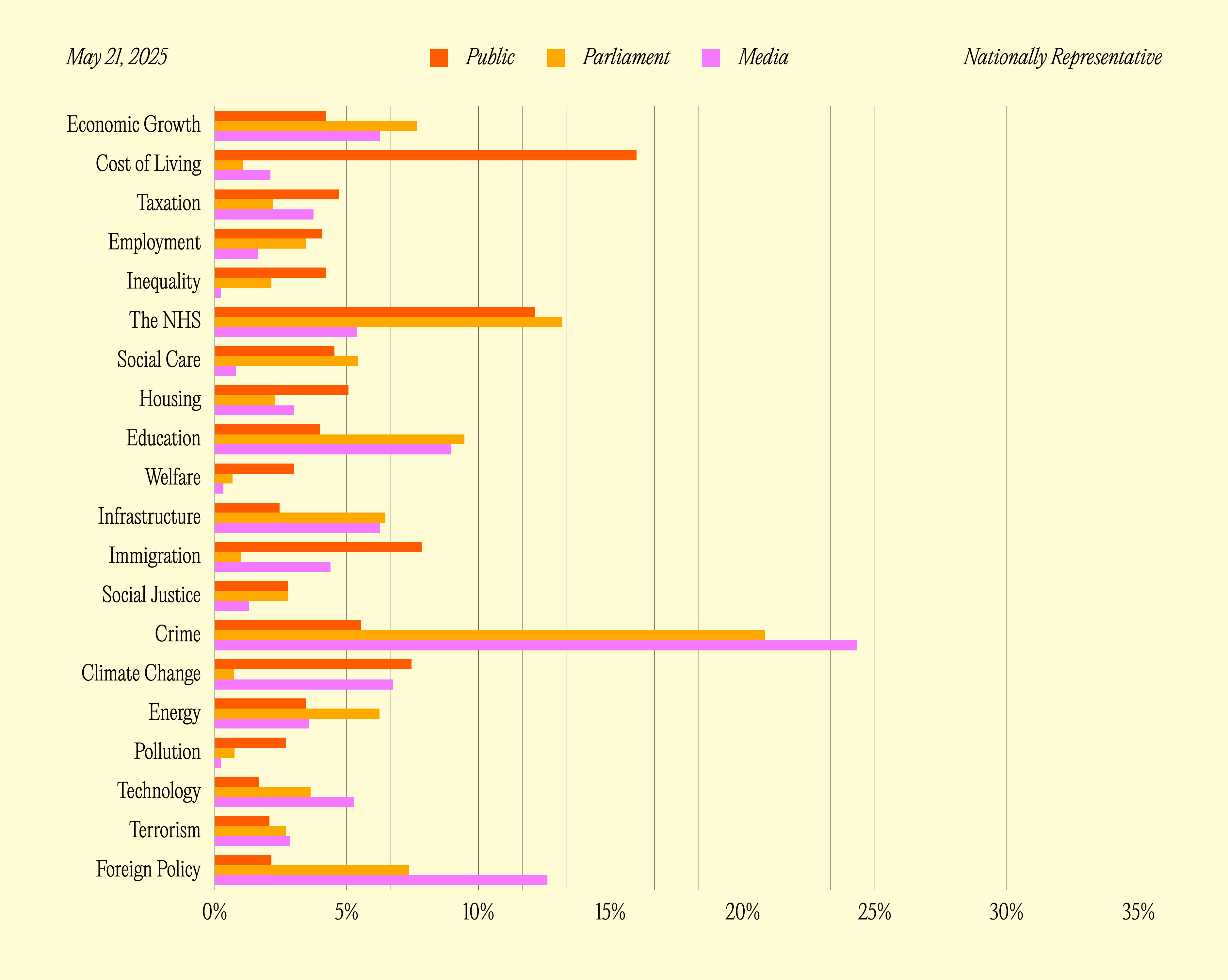
The Cost of Living remains the dominant public concern at 15.98%, despite a slight decline from its peak of 16.29% in early April. This enduring economic anxiety is complemented by the NHS at 12.14%, which has stabilised after previously falling from 12.65% in early April. Immigration has shown one of the most notable long-term upward trajectories, reaching 7.83%, reflecting a steady two-month climb from 5.84% in late March. Climate Change maintains its position as a top-five concern at 7.45%, though down from its mid-May peak of 8.11%. Housing concerns have declined substantially from 6.98% in March to 5.07%, possibly reflecting the impact of recent government housing initiatives announced in the spring budget. Crime remains steady at 5.53%, showing remarkable consistency throughout the entire quarter. Social Care has risen to 4.53%, reversing its previous downward trend, while Inequality has returned to prominence at 4.22% after falling as low as 2.99% in late April. Economic Growth has declined significantly from its April peak of 6.11% to 4.22%, suggesting reduced anxiety about recession as the Bank of England's last quarterly report showed modest growth. The gap between public concern and institutional attention is most pronounced in Cost of Living, which receives minimal Parliamentary focus (1.08%) and media coverage (2.11%) despite being the public's overwhelming priority. Conversely, Crime dominates media coverage at 24.31% and Parliamentary attention at 20.84%, disproportionate to public concern. Foreign Policy has gained significant media traction at 12.60%, likely due to ongoing tensions in Eastern Europe and developments in Middle East peace negotiations. Education concerns have remained relatively stable at 3.99%, though Parliamentary attention at 9.46% and media coverage at 8.94% far exceed public prioritisation. Technology issues remain a low public concern at just 1.69%, despite consistent media coverage at 5.28%.
May 28
At the Top:
Cost of Living ranks highest at 16.7%, followed by The NHS at 12.0% and Climate Change at 8.4%
On the Up:
Climate Change increased by 1.0% from last week, while Immigration decreased by 1.6%
In the Press:
Crime had the most coverage at 24.3%, followed by Climate Change at 8.1% and Foreign Policy at 7.3%
Foreign Policy Coverage Increases
Which challenges facing society today do your social circle feel need the most urgent attention?

Cost of Living remains the dominant public concern at 16.7%, maintaining its position as the most pressing societal challenge throughout the survey period, reflecting sustained economic pressures on households across the UK. The enduring nature of this concern demonstrates how inflation and rising costs continue to affect daily life, with no significant relief apparent in recent months. Climate Change has shown notable strengthening, rising to 8.4% from earlier periods, indicating growing environmental consciousness among the public despite other immediate economic pressures. This upward trajectory suggests increasing awareness of environmental issues and their long-term implications for society. The NHS maintains steady concern at 12.0%, reflecting ongoing challenges within the health service that have persisted throughout the data collection period, with public anxiety about healthcare access and quality remaining consistently high. Immigration has fluctuated around 6.2%, suggesting moderate but consistent public attention to this issue, though it remains significantly lower than the dominant economic concerns. Crime remains stable at 5.5%, whilst Housing has shown some decline from earlier highs to 5.9%, though it continues to represent a significant concern for many households struggling with affordability and availability. The data demonstrates clear prioritisation of immediate economic pressures alongside longer-term structural challenges, with environmental concerns gaining momentum throughout the survey period. This pattern suggests the public maintains awareness of both urgent daily needs and future societal requirements. Overall, the survey period shows consistent concern hierarchies with Cost of Living maintaining dominance whilst Climate Change demonstrates the most significant growth in public attention and priority rankings.
Jun 4
At the Top:
Cost of Living ranks highest at 14.9%, followed by The NHS at 11.8% and Climate Change at 7.7%
On the Up:
Taxation increased by 1.7% from last week, while Cost of Living decreased by 1.9%
In the Press:
Crime had the most coverage at 24.5%, followed by Education at 8.9% and Climate Change at 8.4%
Parliament Focuses on Crime
Which challenges facing society today do your social circle feel need the most urgent attention?

The public continues to prioritise immediate economic pressures over longer-term societal challenges, with cost of living maintaining its position as the dominant concern at 14.9% despite a notable decline from the previous week's peak of 16.7%. The NHS remains the second most pressing issue at 11.8%, reflecting sustained anxiety about healthcare provision amid ongoing winter pressures and capacity constraints that have characterised the health service throughout 2025. Climate change has solidified its position as the third major concern at 7.7%, demonstrating consistent public engagement with environmental issues throughout the spring period, particularly following the recent extreme weather events across Europe. Immigration concerns have maintained steady growth, reaching 6.9% and representing a gradual upward trajectory over recent months as policy debates continue to resonate with voters. The data reveals a public increasingly focused on tangible, immediate challenges rather than abstract policy debates, with taxation rising to 5.4% as budget discussions and fiscal policy changes continue to dominate political discourse. Housing concerns have stabilised at 5.5%, whilst employment worries remain elevated at 5.1%, suggesting persistent labour market anxieties despite broader economic indicators showing signs of recovery. Crime maintains steady attention at 5.8%, reflecting ongoing public safety concerns, and energy concerns have settled at 4.0% following earlier volatility during the spring energy price adjustments. The overall pattern demonstrates a public agenda dominated by bread-and-butter issues, with environmental consciousness maintaining significant traction alongside traditional economic priorities. Social justice and international affairs command notably lower attention levels, suggesting a more inward-looking public focus during this period of domestic economic uncertainty and political transition.
Jun 11
At the Top:
Cost of Living ranks highest at 15.5%, followed by The NHS at 11.9% and Climate Change at 7.7%
On the Up:
Inequality increased by 1.4% from last week, while Economic Growth decreased by 1.1%
In the Press:
Crime had the most coverage at 19.2%, followed by Climate Change at 11.5% and Education at 11.1%
Cost of Living Remains Top Issue
Which challenges facing society today do your social circle feel need the most urgent attention?

Cost of living maintains its position as the dominant public concern at 15.5%, reflecting persistent economic pressures that have consistently ranked above all other issues throughout the survey period. This enduring priority demonstrates how immediate financial pressures continue to overshadow broader policy debates, with the public consistently prioritising household economics over abstract political considerations. The NHS follows as the second-highest priority at 11.9%, demonstrating the enduring significance of healthcare in public consciousness and reflecting ongoing concerns about service delivery and capacity. Climate change has established itself as the third-ranking concern at 7.7%, showing sustained environmental awareness amongst the public and suggesting that environmental issues have become embedded in mainstream political consciousness. Immigration concerns have gradually strengthened over recent months, now commanding 7.0% of public attention, representing a notable shift in public priorities that may reflect ongoing policy debates and media coverage of migration issues. Housing issues maintain steady relevance at 6.2%, indicating persistent concerns about affordability and availability in the property market. Crime, despite receiving substantial media coverage at 19.2%, registers at only 5.2% in public priorities, suggesting a significant disconnect between media focus and genuine public concern about personal safety. Energy policy shows moderate public engagement at 4.7%, whilst employment concerns remain stable at 4.7%, indicating that whilst these issues maintain relevance, they are overshadowed by more immediate concerns. Economic growth, traditionally a central political theme, attracts only 3.7% of public attention, indicating that immediate cost pressures overshadow broader economic considerations. The data demonstrates remarkable consistency in the hierarchy of public concerns, with cost of living and NHS issues forming the core of societal priorities.
Jun 18
At the Top:
Cost of Living ranks highest at 14.1%, followed by The NHS at 11.2% and Immigration at 7.5%
On the Up:
Immigration increased by 0.5% from last week, while Cost of Living decreased by 1.3%
In the Press:
Crime had the most coverage at 23.3%, followed by Climate Change at 10.4% and Energy at 7.1%
Crime Concerns Increase
Which challenges facing society today do your social circle feel need the most urgent attention?
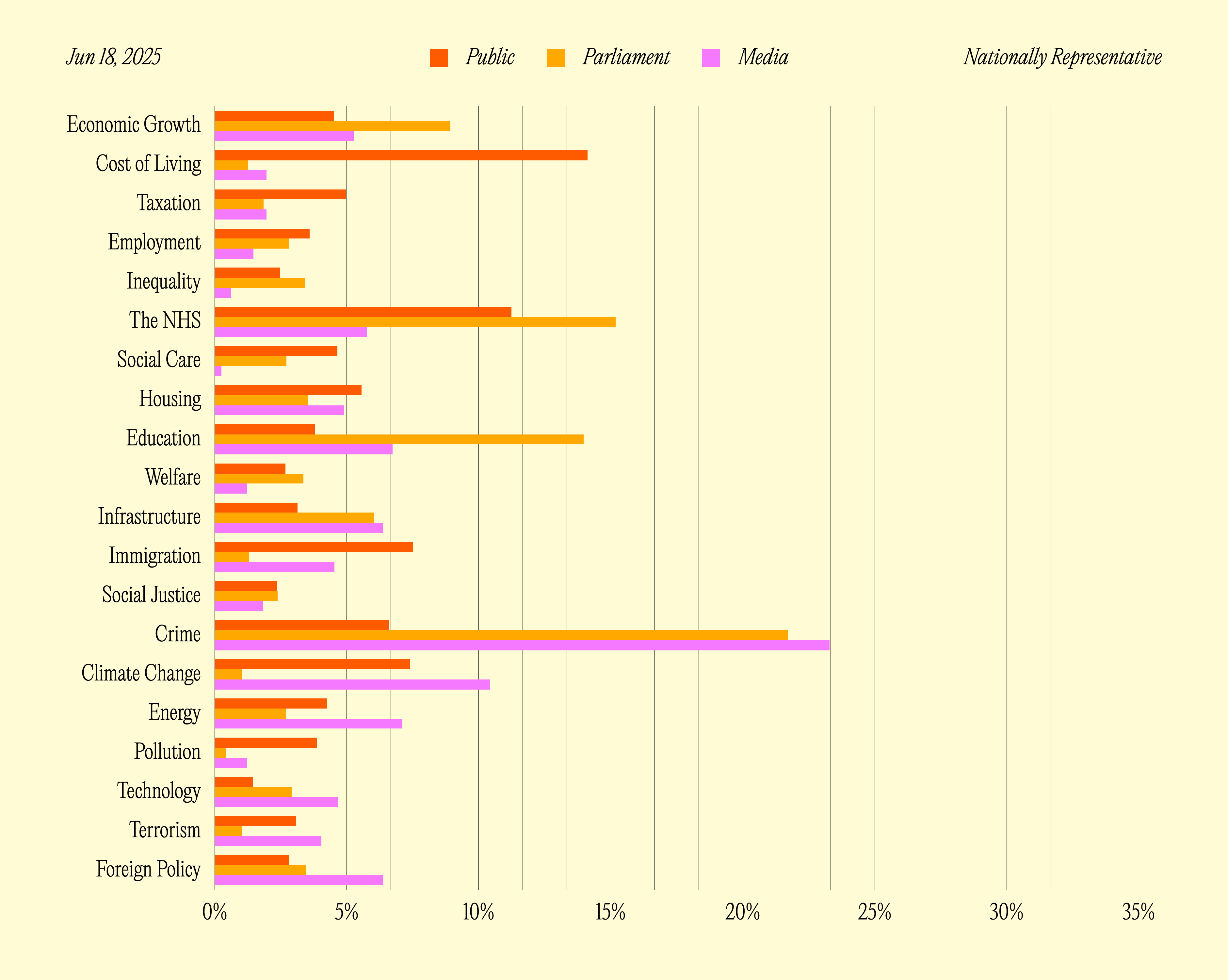
The public's primary concerns remain dominated by fundamental living standards, with cost of living maintaining its position as the most pressing issue at 14.1%, whilst immigration has reached 7.5%, representing the highest level recorded across the survey period. The NHS continues to command substantial attention at 11.2%, reflecting persistent anxieties about healthcare provision and accessibility that have characterised public discourse throughout the entire survey timeframe. Climate change holds steady at 7.4%, demonstrating consistent environmental concerns amongst the population, though this represents a slight decline from peak levels observed in earlier weeks. Crime has surged to 6.6%, marking a notable increase from earlier periods when it typically registered below 6.0%, suggesting growing public unease about safety and security. Housing concerns persist at 5.6%, whilst economic growth sits at 4.5%, suggesting ongoing uncertainty about broader economic prospects and recovery momentum. The data illustrates a society grappling with immediate practical challenges alongside longer-term structural issues, with immigration concerns particularly pronounced compared to earlier survey periods when they consistently remained below 7.0%. Taxation remains a moderate concern at 5.0%, whilst employment anxiety has decreased to 3.6%, potentially indicating some labour market stability or improved job security perceptions. Infrastructure concerns have risen to 3.1%, possibly reflecting ongoing debates about national investment priorities and the need for modernisation across transport, digital, and energy networks. Social care maintains attention at 4.6%, highlighting persistent concerns about an ageing population and care system capacity. Inequality has dropped to 2.5%, whilst social justice concerns remain relatively stable at 2.4%, suggesting these issues have taken lower priority compared to immediate economic pressures.
Jun 25
At the Top:
Cost of Living ranks highest at 14.6%, followed by The NHS at 10.4% and Climate Change at 8.5%
On the Up:
On the Up: Housing increased by 1.9% from last week, while The NHS decreased by 0.9%
In the Press:
Crime had the most coverage at 20.2%, followed by Foreign Policy at 9.4% and Climate Change at 8.4%
Housing Concerns Up 1.9%
Which challenges facing society today do your social circle feel need the most urgent attention?
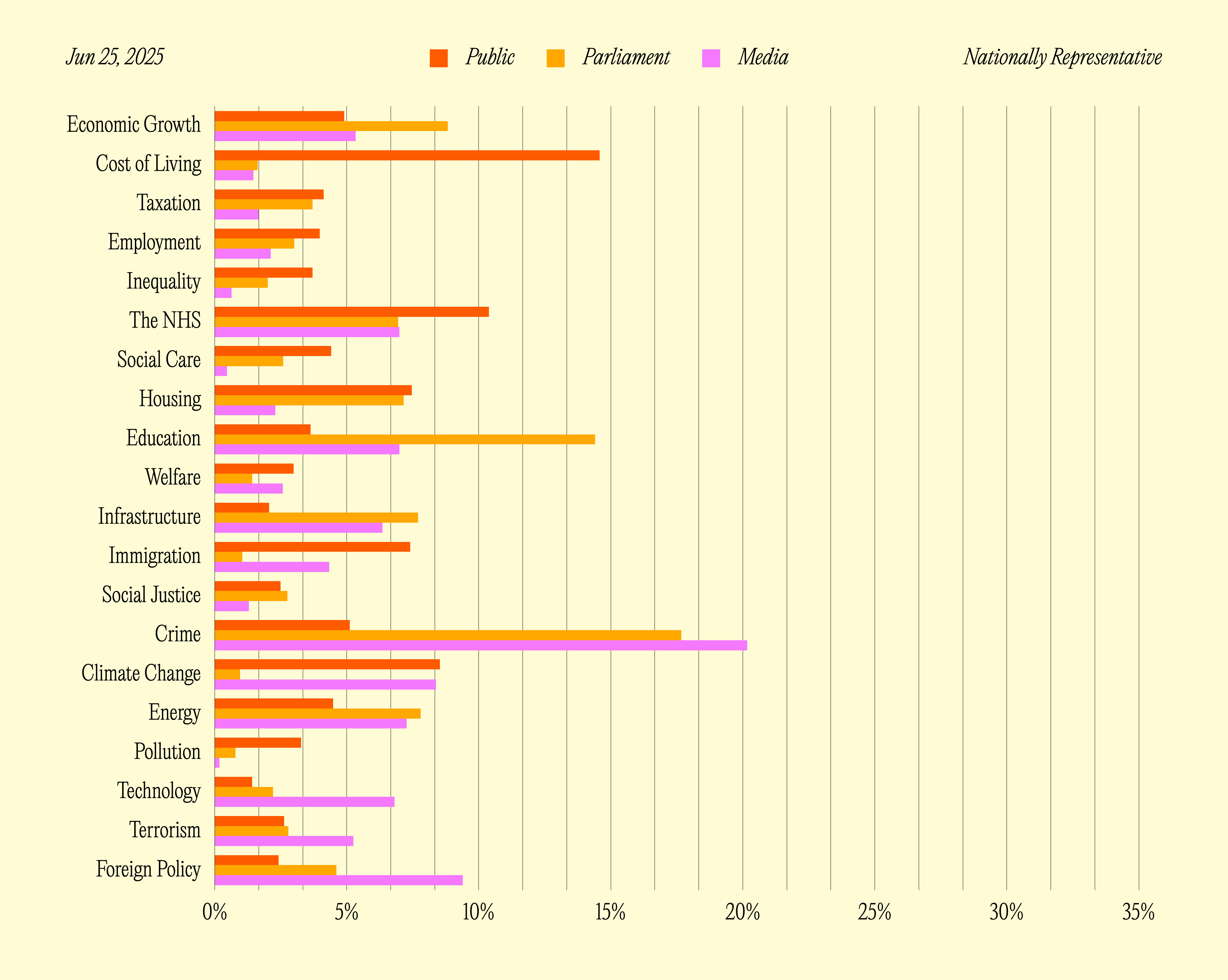
Cost of living remains the dominant public concern at 14.6%, maintaining its position as the most pressing issue despite a gradual decline from its peak of 16.7% in late May. The persistence of this concern reflects the continued impact of inflationary pressures on household budgets, despite government efforts to address economic challenges through various policy measures. The NHS follows at 10.4%, showing sustained concern levels that have persisted throughout the survey period, reflecting ongoing pressures on healthcare services including staffing shortages, waiting times, and capacity constraints that continue to affect patient care. Climate change has emerged as the third-highest priority at 8.5%, marking a notable strengthening from earlier months when it fluctuated around 6-7%. This upward trajectory in environmental concerns coincides with increased media attention and likely reflects growing awareness of climate impacts during the summer months, potentially influenced by extreme weather events and international climate discussions. Immigration concerns have stabilised at 7.4%, representing a significant shift from lower levels earlier in the year, whilst housing has strengthened to 7.5%, possibly reflecting seasonal property market activity and ongoing affordability challenges that affect both renters and prospective homeowners across different regions. Economic growth concerns at 4.9% and employment at 4.0% demonstrate continued anxiety about the broader economic outlook, particularly regarding job security and wage growth. Crime at 5.1% and energy at 4.5% round out the mid-tier concerns, with both topics showing fluctuating attention throughout the survey period. The persistence of these concerns demonstrates the enduring nature of fundamental socioeconomic challenges facing British society, with cost of living pressures continuing to dominate public consciousness despite policy interventions.
Jul 2
At the Top:
Cost of Living ranks highest at 14.4%, followed by The NHS at 10.8% and Immigration at 7.1%.
On the Up:
The NHS increased by 0.5% from last week, while Immigration decreased by 0.3%.
In the Press:
Crime had the most coverage at 25.0%, followed by Technology at 7.6% and Climate Change at 7.4%.
Technology Coverage Increases
Which challenges facing society today do your social circle feel need the most urgent attention?
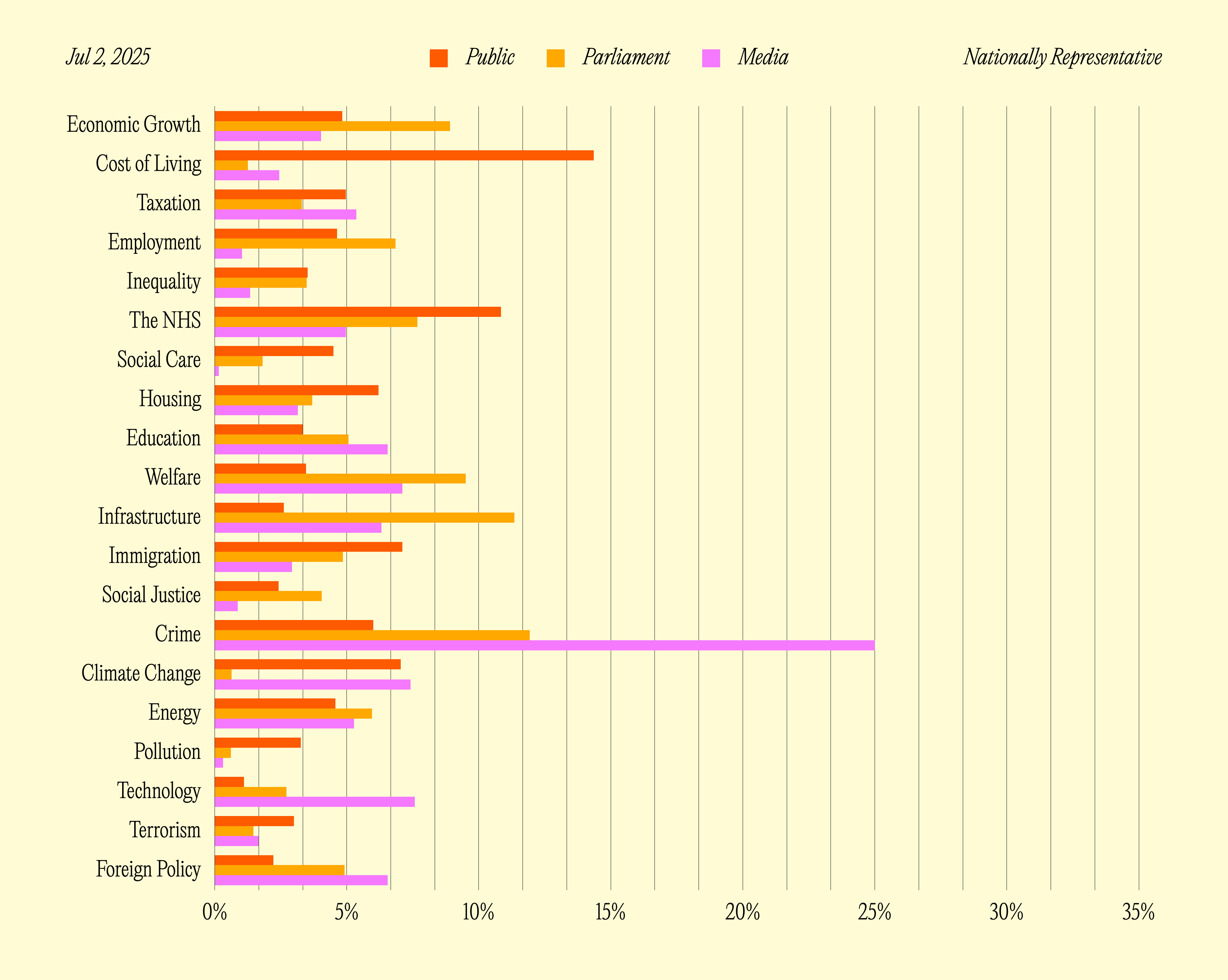
Cost of Living dominates public concern at 14.4%, maintaining its position as the foremost societal challenge despite a slight decline from the previous week's 14.6%. This issue has consistently held the top position throughout the survey period, fluctuating between 14% and 16%, reflecting ongoing inflationary pressures that continue to affect household budgets across the nation. The NHS follows at 10.8%, representing a modest increase from 10.4% the week prior, whilst demonstrating remarkable consistency as the second-most pressing concern, rarely dropping below 10% throughout this period. Immigration ranks third at 7.1%, having decreased from 7.4% but remaining significantly elevated compared to earlier spring levels when it sat around 5.5% to 6%. This sustained elevation throughout recent months indicates continuing public unease about migration policy, particularly following spring debates on refugee accommodation and processing delays that have dominated political discourse. Climate Change holds steady at 7.1%, maintaining its position in the upper tier of public priorities and showing resilience despite seasonal variations in environmental concerns. Crime demonstrates notable stability at 6.0% after recovering from a dip to 5.1% in late June, suggesting sustained public anxiety about safety and security issues. Economic Growth sits at 4.8%, fluctuating within its typical range of 4% to 5%, whilst Taxation maintains 5.0% public attention, both demonstrating stable patterns over recent weeks that reflect consistent underlying economic concerns. Housing concerns register 6.2%, Education 3.3%, and Employment 4.6%, all showing relative stability within their established ranges and indicating that these foundational issues maintain steady public attention without dramatic fluctuations. The persistence of these core concerns reflects the enduring nature of Britain's fundamental socioeconomic challenges throughout this extended survey period.
Jul 9
At the Top:
Cost of Living ranks highest at 15.9%, followed by The NHS at 12.1% and Immigration at 7.4%
On the Up:
Climate Change increased by 0.4% from last week, while Taxation decreased by 1.0%
In the Press:
Crime had the most coverage at 27.0%, followed by Climate Change at 10.6% and Education at 7.0%
Crime Coverage Spikes
Which challenges facing society today do your social circle feel need the most urgent attention?
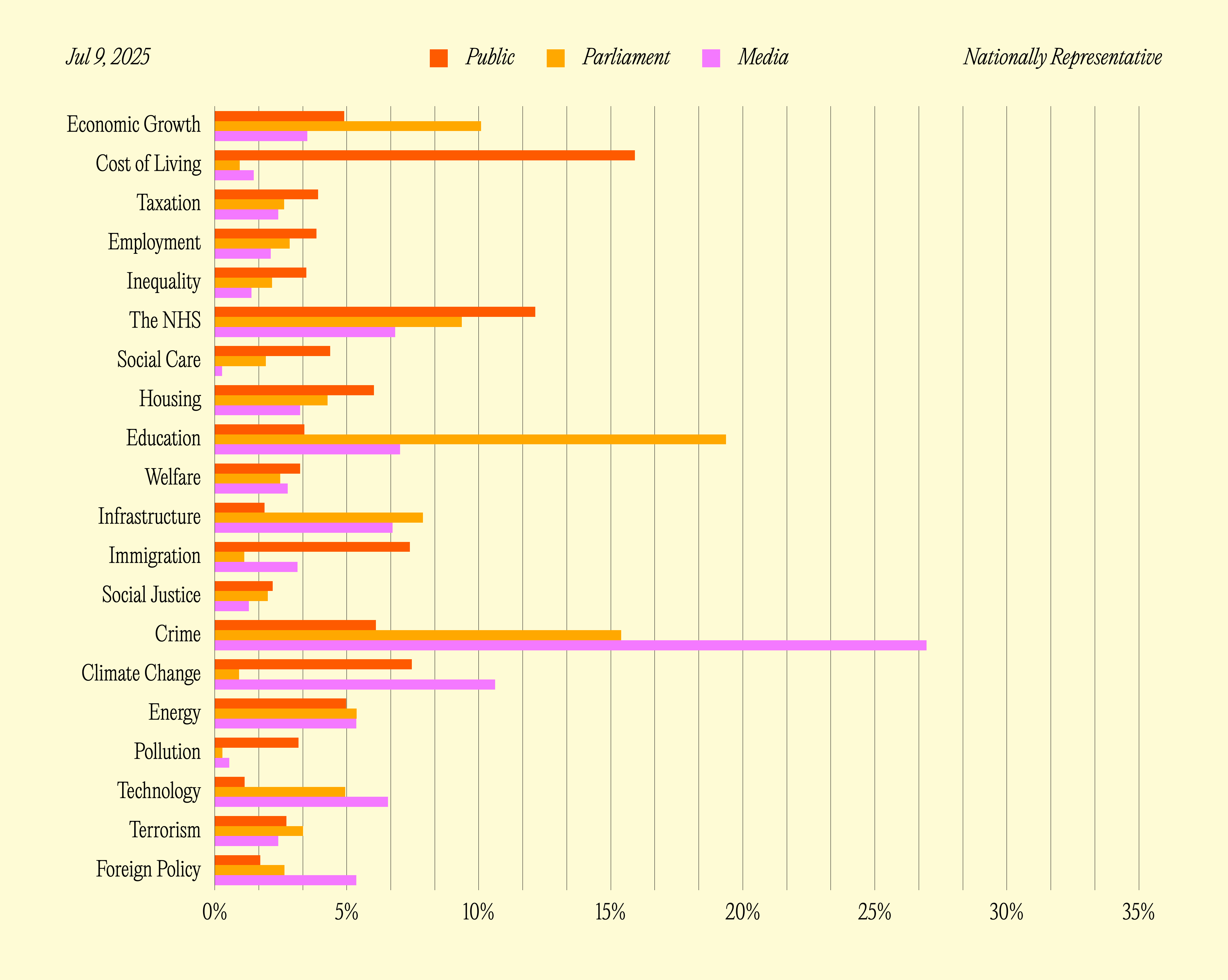
The public's primary concerns demonstrate a familiar pattern with cost of living maintaining its dominant position at 15.9%, whilst the NHS continues as the second-highest priority at 12.1%. Immigration has solidified its position as the third-most pressing issue at 7.4%, representing a sustained trend over recent months that reflects ongoing national debate around migration policy and border control measures. Economic growth holds steady at 4.9%, suggesting moderate concern about broader economic performance despite inflationary pressures affecting household budgets. Crime registers at 6.1%, maintaining consistent levels that indicate persistent public anxiety about safety and security across communities, particularly in urban areas. Climate change remains at 7.5%, showing the environmental agenda retains significant public attention despite competing immediate economic pressures and political priorities. Housing concerns persist at 6.0%, reflecting the continued affordability crisis affecting homeownership and rental markets nationwide, particularly impacting younger generations. Energy costs maintain relevance at 5.0%, suggesting ongoing worry about utility bills and energy security following recent volatility in global markets. Social care concerns register at 4.4%, highlighting persistent anxiety about elderly care provision and support systems. Education remains at 3.4%, indicating continued concern about schooling standards and educational outcomes across the country. Employment concerns stand at 3.9%, reflecting ongoing worries about job security and wage growth in an uncertain economic climate. Taxation issues register at 3.9%, suggesting public attention to fiscal policy and government spending priorities across different sectors. These figures collectively paint a picture of a public grappling with immediate economic pressures whilst maintaining awareness of longer-term structural challenges facing society.
Jul 16
At the Top:
Cost of Living ranks highest at 15.4%, followed by The NHS at 12.2% and Immigration at 7.3%
On the Up:
Welfare increased by 0.4% from last week, while Climate Change decreased by 0.4%
In the Press:
Crime had the most coverage at 27.3%, followed by Climate Change at 9.8% and Technology at 7.4%
Immigration Concerns Up 1.7%
Which challenges facing society today do your social circle feel need the most urgent attention?
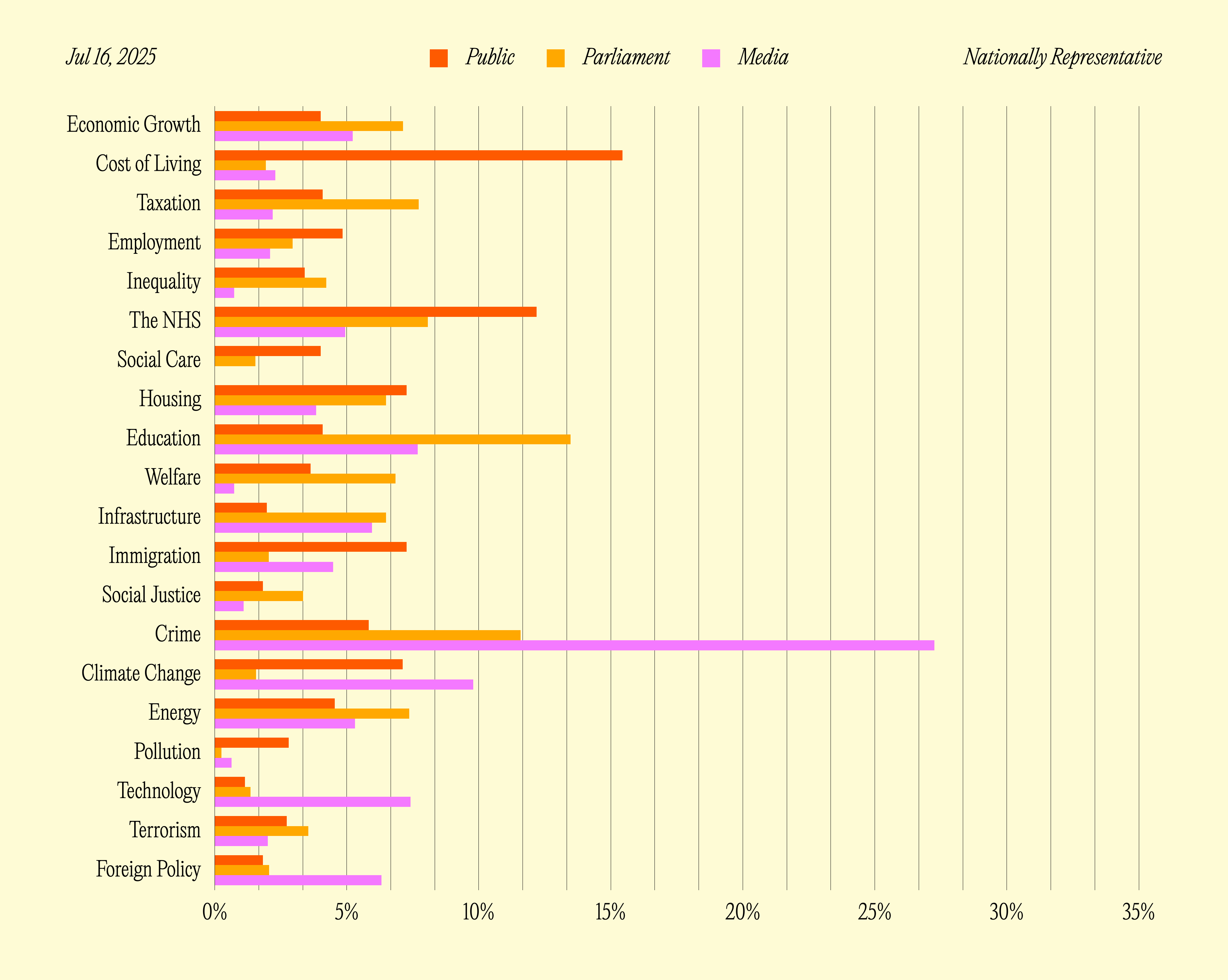
The British public's concerns in mid-July continued to be dominated by cost of living issues, which remained the highest priority at 15.4%, maintaining its position as the most pressing societal challenge throughout recent months. The NHS followed at 12.2%, showing remarkable consistency in public attention despite significant fluctuations in Parliamentary focus across recent weeks. Immigration concerns held steady at 7.3%, reflecting ongoing anxieties about migration policy and border controls that have persisted since spring. Housing emerged as a significant concern at 7.3%, matching immigration levels and suggesting persistent worries about accessibility and affordability in the property market, particularly affecting younger demographics. Climate change maintained its position at 7.1%, demonstrating sustained environmental consciousness among the populace despite seasonal variations in attention. Crime remained stable at 5.8%, whilst employment concerns increased to 4.8% from previous weeks, potentially reflecting labour market uncertainties and post-pandemic economic adjustments. Economic growth concerns decreased to 4.0%, suggesting either reduced anxiety about broader economic performance or displacement by more immediate cost pressures affecting household budgets. Energy issues held at 4.5%, whilst taxation concerns remained modest at 4.1%, indicating these areas commanded less urgent attention than core living standards. Social care maintained steady concern at 4.0%, reflecting ongoing demographic pressures and system capacity issues. Education remained relatively stable at 4.1%, whilst welfare concerns increased slightly to 3.6%, suggesting growing awareness of social safety net adequacy during economic uncertainty. Lower-tier concerns including inequality at 3.4% and infrastructure at 2.0% demonstrated the public's prioritisation of immediate economic pressures over longer-term structural challenges.
Jul 23
At the Top:
Cost of Living ranks highest at 14.0%, followed by The NHS at 11.5% and Climate Change at 8.1%
On the Up:
Infrastructure increased by 1.0% from last week, while Cost of Living decreased by 1.4%
In the Press:
Crime had the most coverage at 22.9%, followed by Education at 9.3% and Climate Change at 8.5%
Infrastructure Worries Grow
Which challenges facing society today do your social circle feel need the most urgent attention?
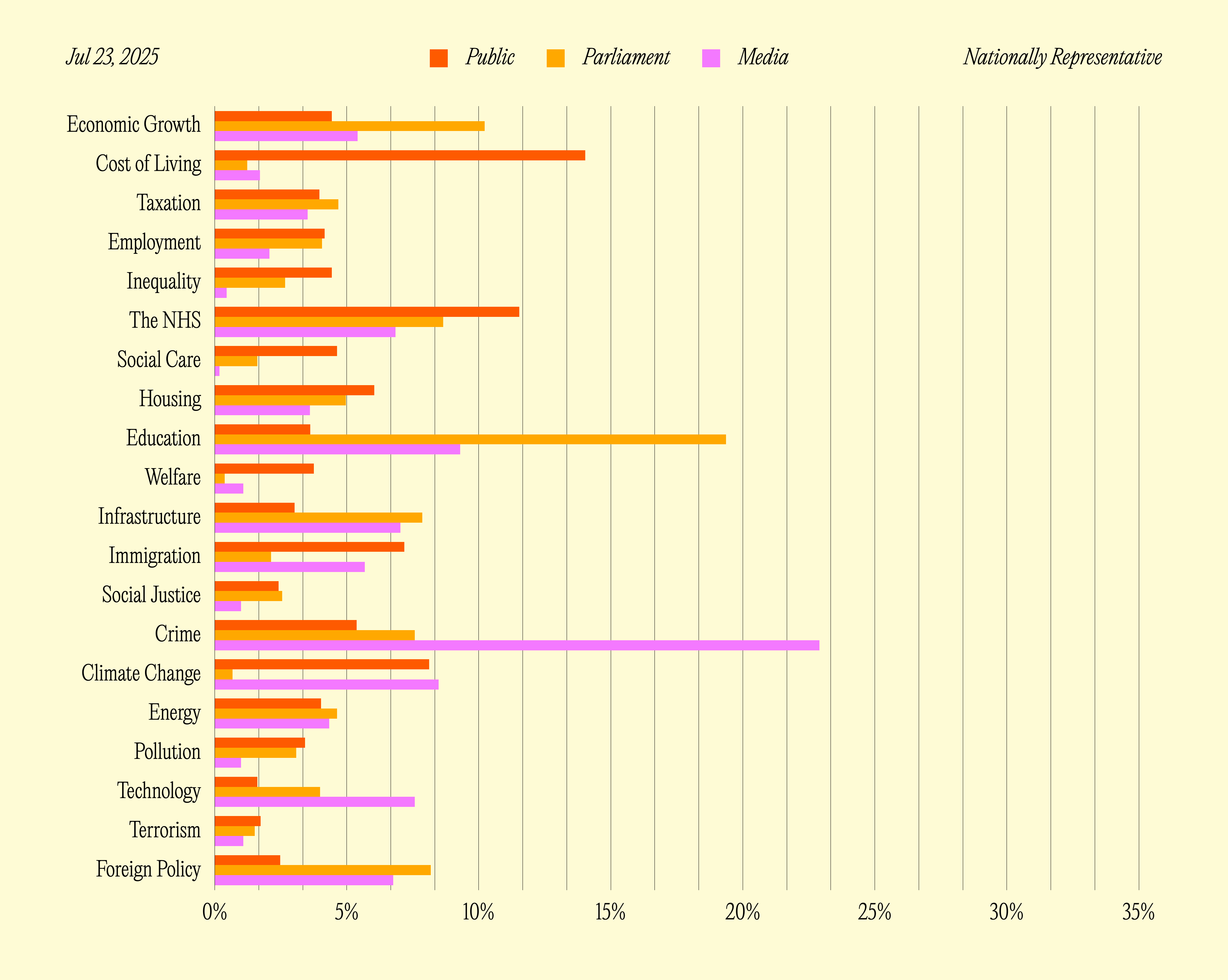
Cost of living remains the dominant public concern at 14.0%, maintaining its position as the foremost societal challenge despite experiencing a decline from the previous week's 15.4%. This persistent prioritisation reflects the ongoing economic pressures affecting households across the nation, with inflationary concerns continuing to shape public discourse. The NHS follows as the second-highest priority at 11.5%, demonstrating the enduring significance of healthcare provision in public consciousness and maintaining relatively stable levels of concern over recent weeks. Climate change has emerged as the third-ranking concern at 8.1%, marking a notable increase from the previous week's 7.1% and continuing an upward trajectory that has been evident across multiple survey periods throughout the spring and early summer months. Immigration maintains substantial public attention at 7.2%, reflecting ongoing debates surrounding policy frameworks and societal integration challenges. Housing concerns register at 6.0%, whilst crime remains relatively stable at 5.4%, indicating consistent public awareness of safety and security issues. Infrastructure has demonstrated a marked increase to 3.0% from the previous week's 2.0%, suggesting growing public recognition of structural investment needs across transport, utilities, and digital networks. Inequality has risen to 4.4% from 3.4%, indicating increased public focus on social disparities and distributional concerns within society. The consistent positioning of cost of living, NHS, and climate change in the top tier demonstrates these issues' embedded importance in public priorities, with climate change particularly showing sustained growth patterns that suggest evolving environmental consciousness amongst the population. Economic growth remains a moderate concern at 4.4%, whilst social care maintains steady attention at 4.6%, reflecting the ongoing challenges facing an ageing population.
Jul 30
At the Top:
Cost of Living ranks highest at 14.2%, followed by The NHS at 11.7% and Immigration at 7.7%
On the Up:
Immigration increased by 0.5% from last week, while Economic Growth decreased by 0.7%
In the Press:
Crime had the most coverage at 27.5%, followed by Climate Change at 9.3% and Foreign Policy at 9.1%
Immigration Surpasses Climate
Which challenges facing society today do your social circle feel need the most urgent attention?
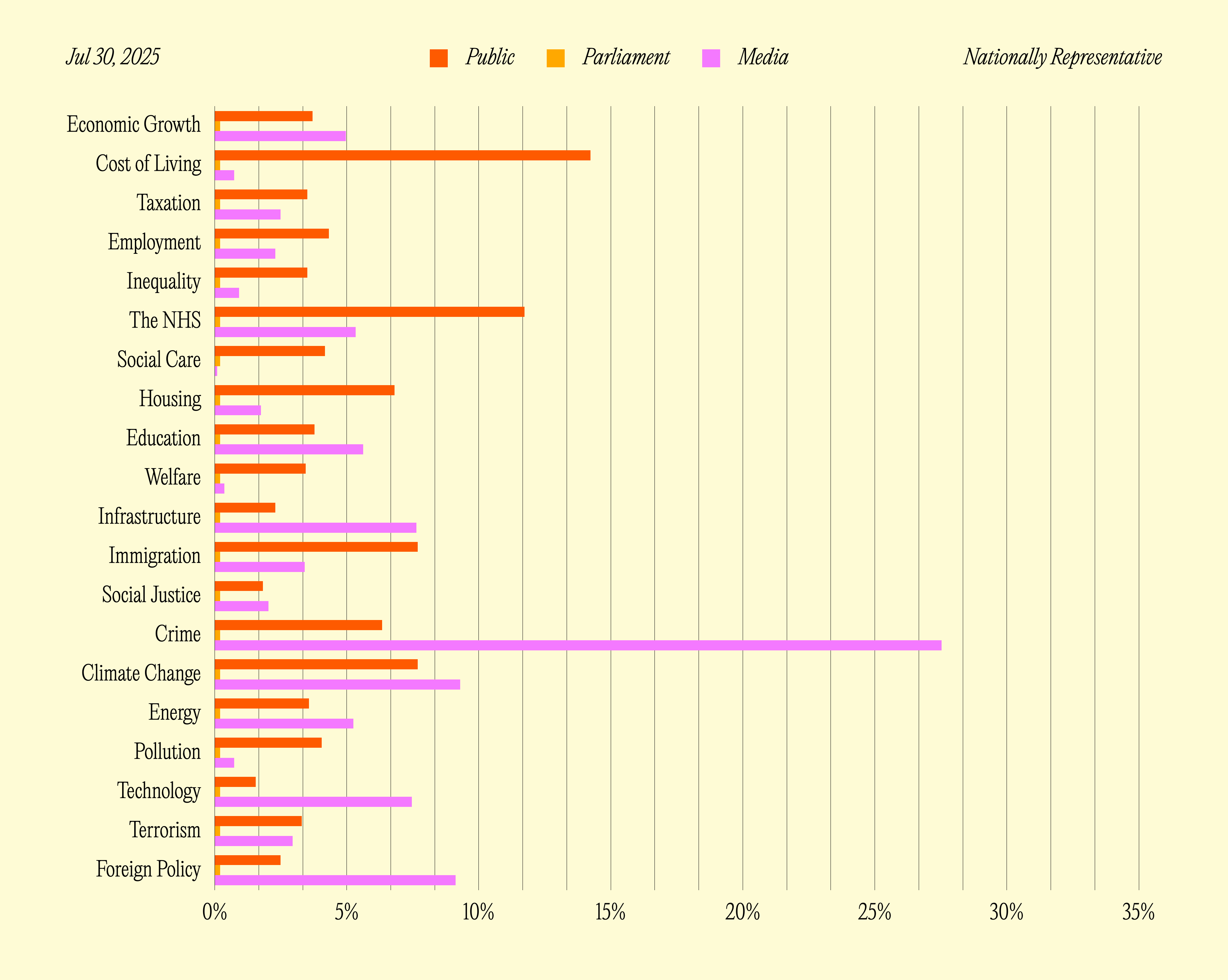
Cost of living continues to dominate public concerns at 14.2%, maintaining its position as the most pressing issue for the public with consistent levels from the previous week's 14.0%. The NHS follows at 11.7%, showing resilience in public prioritisation with a modest increase from 11.5% the week prior, reflecting sustained pressure on healthcare services. Immigration has sustained its upward trajectory, reaching 7.7% and representing the most significant trend across recent weeks, climbing consistently from 7.2% in mid-July and establishing itself as a growing priority. Climate change holds steady at 7.7%, matching immigration's level and demonstrating continued environmental concern amongst the public throughout the summer months. Housing remains a persistent worry at 6.8%, reflecting ongoing affordability challenges across multiple weeks as property prices continue to strain household budgets. Parliament is currently in summer recess, which accounts for the absence of parliamentary data this week. Crime concerns register at 6.3% amongst the public, maintaining relatively stable levels despite fluctuations in previous weeks. Media coverage continues to be dominated by crime at 27.5%, maintaining its overwhelming share of news focus and far exceeding public concern levels. Technology coverage has increased notably to 7.5%, whilst climate change receives 9.3% of media attention, closely aligning with public interest levels. The disparity between media focus on crime and actual public concern remains substantial, suggesting a disconnect between editorial priorities and citizen preoccupations during the summer period. Economic growth concerns have declined to 3.7%, marking a notable shift in priorities as other issues take precedence. Foreign policy coverage in media has reached 9.1%, demonstrating continued international focus despite limited public engagement at 2.5%.
Aug 6
At the Top:
Cost of Living ranks highest at 14.5%, followed by The NHS at 11.2% and Immigration at 7.6%
On the Up:
Crime increased by 0.4% from last week, while Climate Change decreased by 0.6%
In the Press:
Crime had the most coverage at 28.4%, followed by Climate Change at 10.3% and Infrastructure at 9.5%
Crime Coverage Increases
Which challenges facing society today do your social circle feel need the most urgent attention?
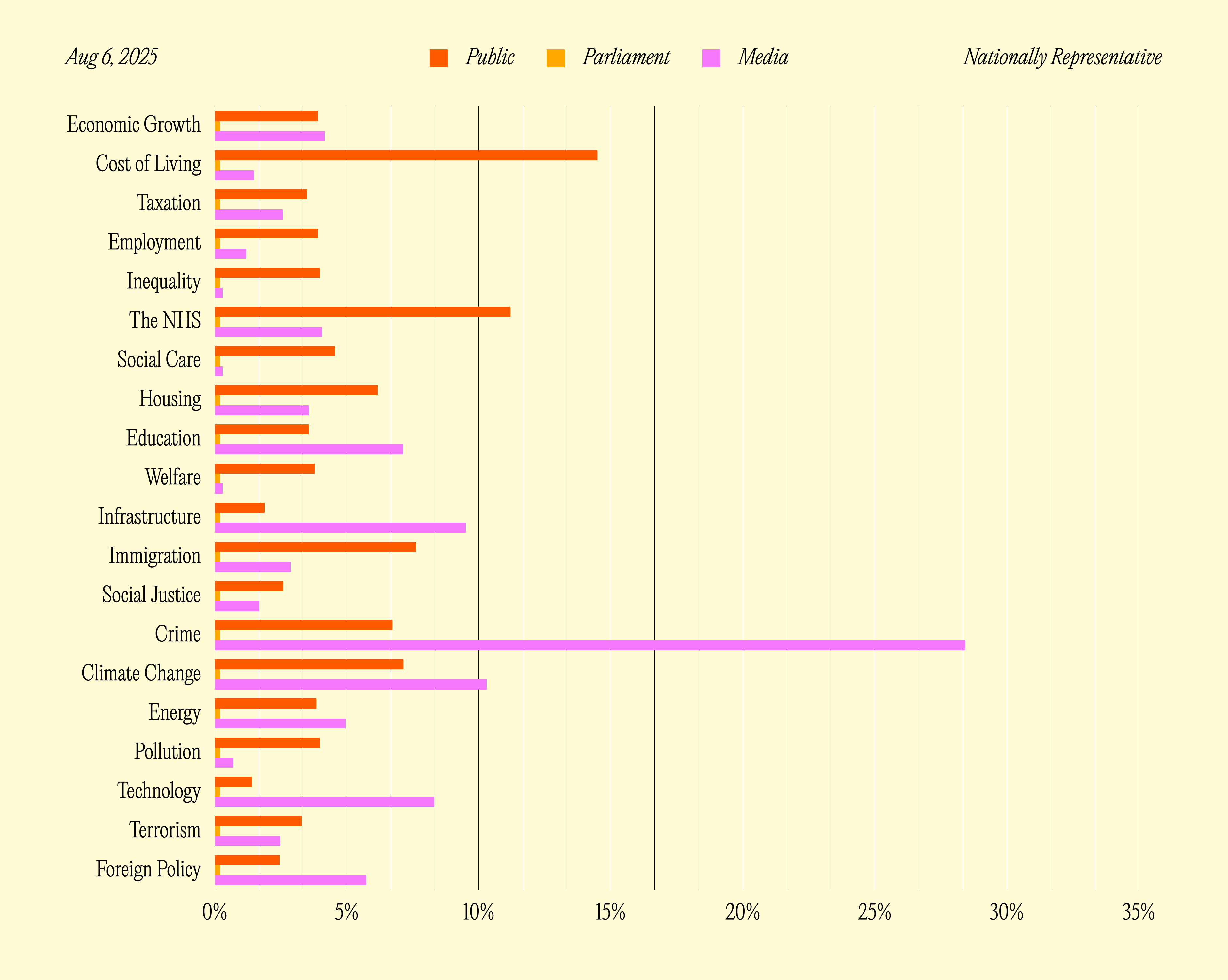
The latest survey data demonstrates the continued dominance of cost of living concerns amongst the public, maintaining its position as the primary societal challenge at 14.5%, closely aligned with its consistent pattern throughout the summer months. Parliament remains in summer recess, limiting direct comparative analysis of legislative priorities during this period. The NHS retains its position as the second most pressing concern at 11.2%, though this represents a slight decline from previous weeks, continuing a gradual downward trend observed since mid-July. Immigration concerns have shown remarkable stability, registering 7.6% and maintaining an upward trajectory that has persisted across multiple survey periods since late spring, reflecting sustained public attention to border and migration issues. Climate change demonstrates consistent public attention at 7.1%, though this reflects a modest decrease from the peak levels recorded in late July when environmental concerns reached their highest summer levels. Crime concerns have strengthened to 6.7%, representing the continuation of an upward trend that has developed over recent weeks, suggesting growing public anxiety about safety and security matters. Housing issues register at 6.2%, maintaining relatively stable levels despite occasional fluctuations throughout the summer period, indicating persistent but not escalating concern about property market pressures. The data illustrates how certain concerns, particularly around basic economic security and public services, have established persistent patterns of public attention, whilst others such as immigration and crime have shown gradual but sustained increases throughout the survey period. These trends suggest that fundamental economic pressures continue to drive public discourse, with security-related concerns gaining momentum as secondary priorities across multiple weeks.
Aug 13
At the Top:
Cost of Living ranks highest at 14.7%, followed by The NHS at 12.1% and Climate Change at 8.2%
On the Up:
Climate Change increased by 1.0% from last week, while Cost of Living decreased by 0.2%
In the Press:
Crime had the most coverage at 23.1%, followed by Climate Change at 11.4% and Technology at 10.6%
Technology Coverage Spikes
Which challenges facing society today do your social circle feel need the most urgent attention?
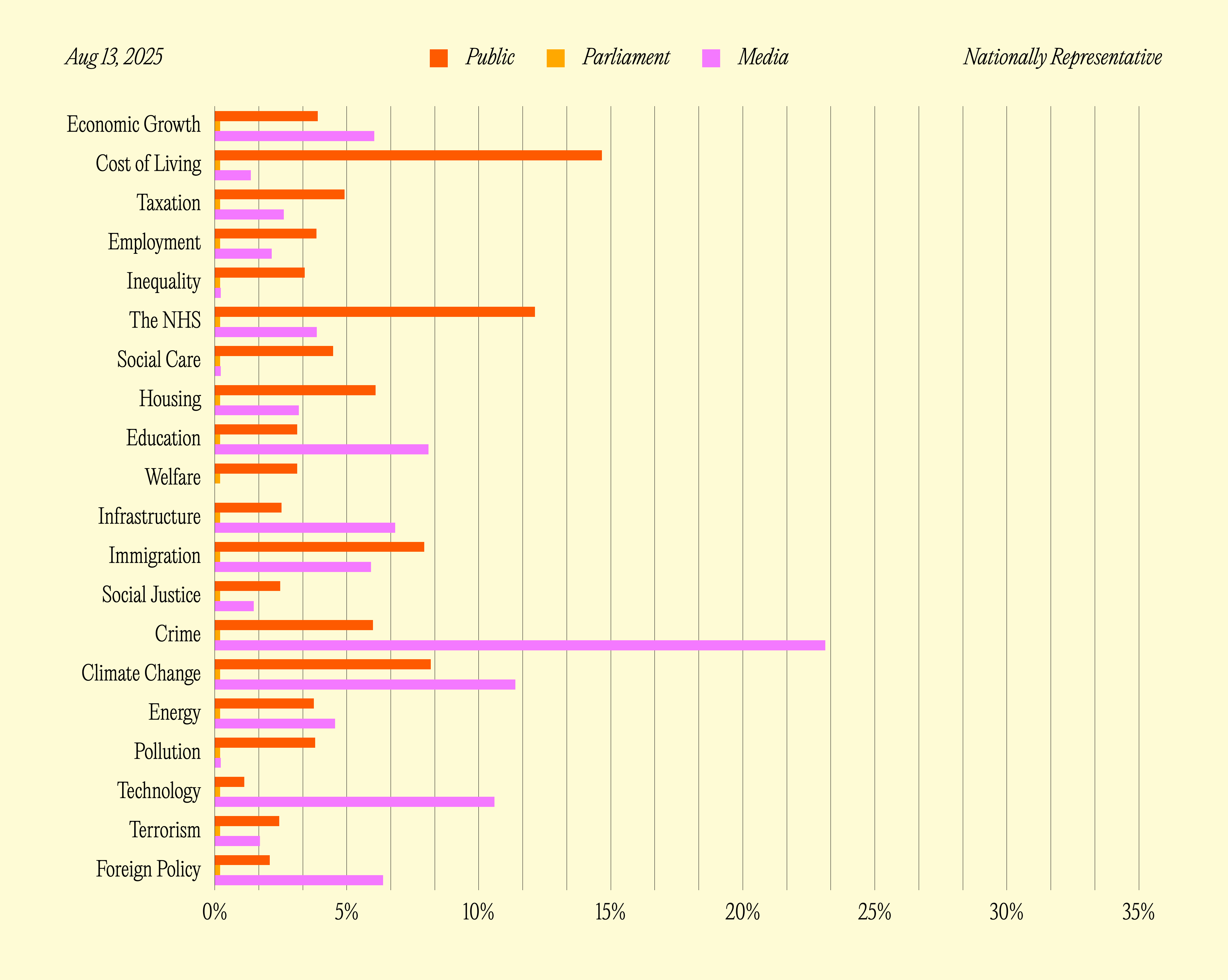
The latest public opinion survey shows cost of living maintaining its position as the dominant concern at 14.7%, followed by the NHS at 12.1% and climate change at 8.2%. Immigration continues its steady upward trajectory, reaching 7.9% and representing one of the most consistent trends across the summer months, climbing from 5.6% in late March to its current level. This sustained increase in immigration concerns likely reflects ongoing debates around border policies and seasonal migration patterns typically seen during summer months, with political discourse intensifying around these issues and media attention focusing on migration statistics. Cost of living concerns have remained remarkably stable throughout the period, fluctuating within a narrow 14.1% to 16.7% range, demonstrating its entrenched position as the public's primary worry amid persistent inflationary pressures affecting household budgets. The NHS has similarly maintained consistent attention levels between 10.4% and 12.2%, reflecting ongoing pressures on healthcare services and summer staffing challenges that continue to impact service delivery. Climate change shows notable volatility, ranging from 5.8% to 8.5%, with the current 8.2% representing a strong position compared to earlier summer readings, possibly influenced by extreme weather events and environmental campaigns gaining momentum. Crime maintains steady public attention at 6.0%, whilst housing concerns remain relatively stable at 6.1%, both topics showing consistent patterns throughout the survey period without significant fluctuations. Parliament remains in summer recess, hence the absence of parliamentary data this week, directing analytical focus towards media coverage patterns and evolving public sentiment trends during the traditional summer recess period. Economic growth concerns have declined to 3.9%, marking one of the lowest levels recorded across the survey timeline and suggesting public attention has shifted towards more immediate cost pressures.
Aug 20
At the Top:
Cost of Living ranks highest at 14.8%, followed by The NHS at 11.6% and Immigration at 6.8%
On the Up:
Energy increased by 0.9% from last week, while Immigration decreased by 1.2%
In the Press:
Crime had the most coverage at 20.1%, followed by Technology at 10.6% and Education at 8.3%
Immigration Concerns Drop
Which challenges facing society today do your social circle feel need the most urgent attention?
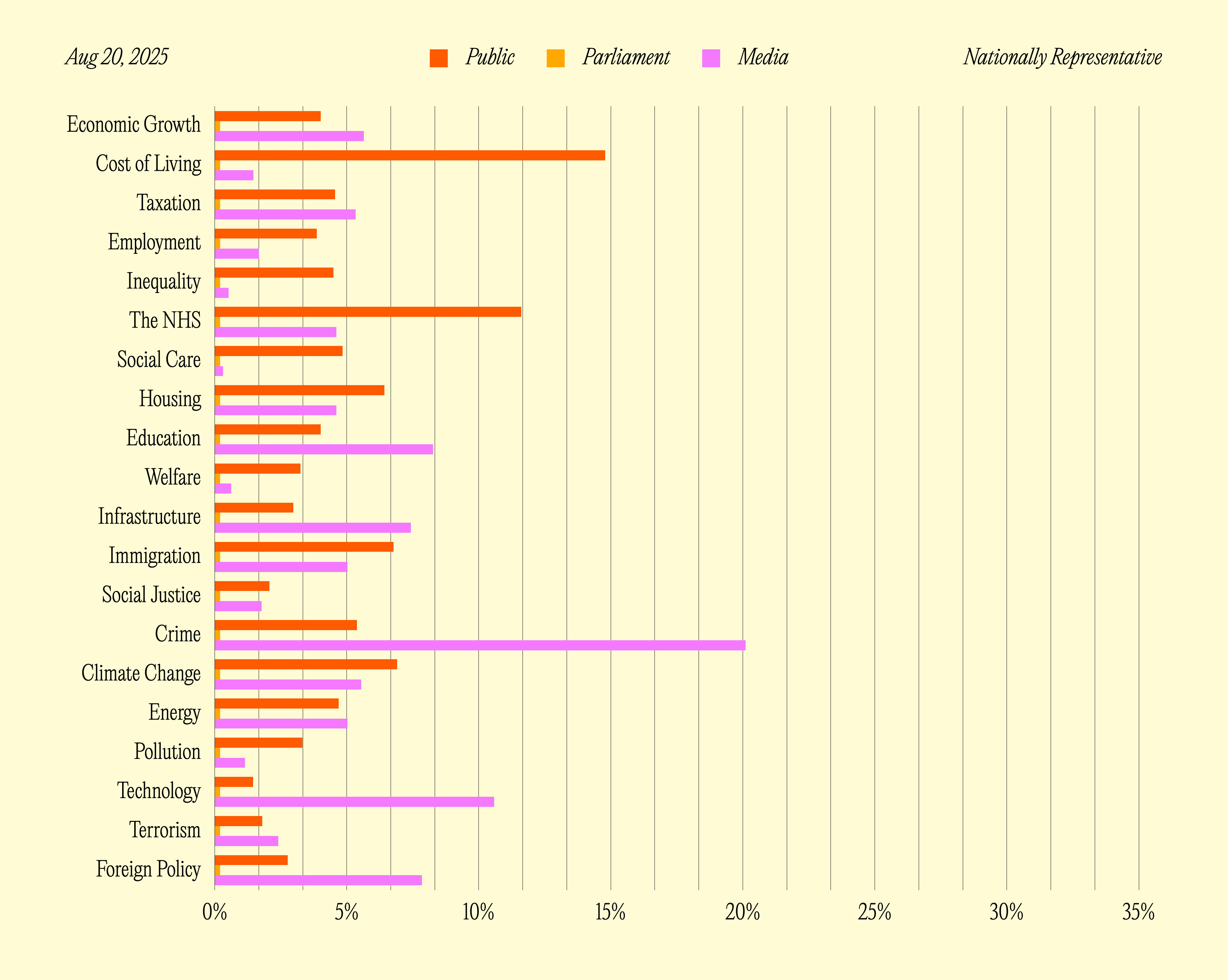
The public's concerns remain dominated by cost of living at 14.8%, maintaining its position as the most pressing issue despite showing remarkable consistency across recent weeks with minimal fluctuation. The NHS follows closely at 11.6%, demonstrating the enduring importance of healthcare in public consciousness and reflecting ongoing concerns about service delivery and capacity challenges. Immigration ranks third at 6.8%, reflecting a slight decline from the previous week's 7.9% but continuing to occupy a significant portion of public attention across multiple demographic groups. This week's data captures public sentiment during Parliament's summer recess, meaning parliamentary attention figures are unavailable for comparison, shifting focus entirely to public opinion and media coverage patterns. Housing concerns have strengthened to 6.4%, up from 6.1% the previous week, continuing a gradual upward trend observed over recent months as affordability and availability issues persist. Climate change has declined to 6.9% from 8.2%, marking a notable shift after several weeks of elevated environmental concern, possibly reflecting seasonal variations in public environmental awareness. Crime remains steady at 5.4%, maintaining consistent levels across recent polling periods whilst economic growth holds at 4.0%, showing little variation despite ongoing economic policy debates. Energy concerns have increased to 4.7% from 3.8%, potentially reflecting ongoing discussions about energy security, pricing, and the transition to renewable sources. Social care maintains a stable 4.8%, whilst taxation concerns register at 4.6%, both showing consistent public attention over recent weeks. The data suggests a public increasingly focused on immediate domestic challenges, with cost of living maintaining its overwhelming priority status across all surveyed groups and regions.
Aug 27
At the Top:
Cost of Living ranks highest at 15.6%, followed by The NHS at 12.7% and Immigration at 7.7%
On the Up:
Crime increased by 1.5% from last week, while Immigration increased by 0.9%
In the Press:
Crime had the most coverage at 27.7%, followed by Technology at 7.9% and Education at 7.9%
Cost of Living Concerns Rise
Which challenges facing society today do your social circle feel need the most urgent attention?
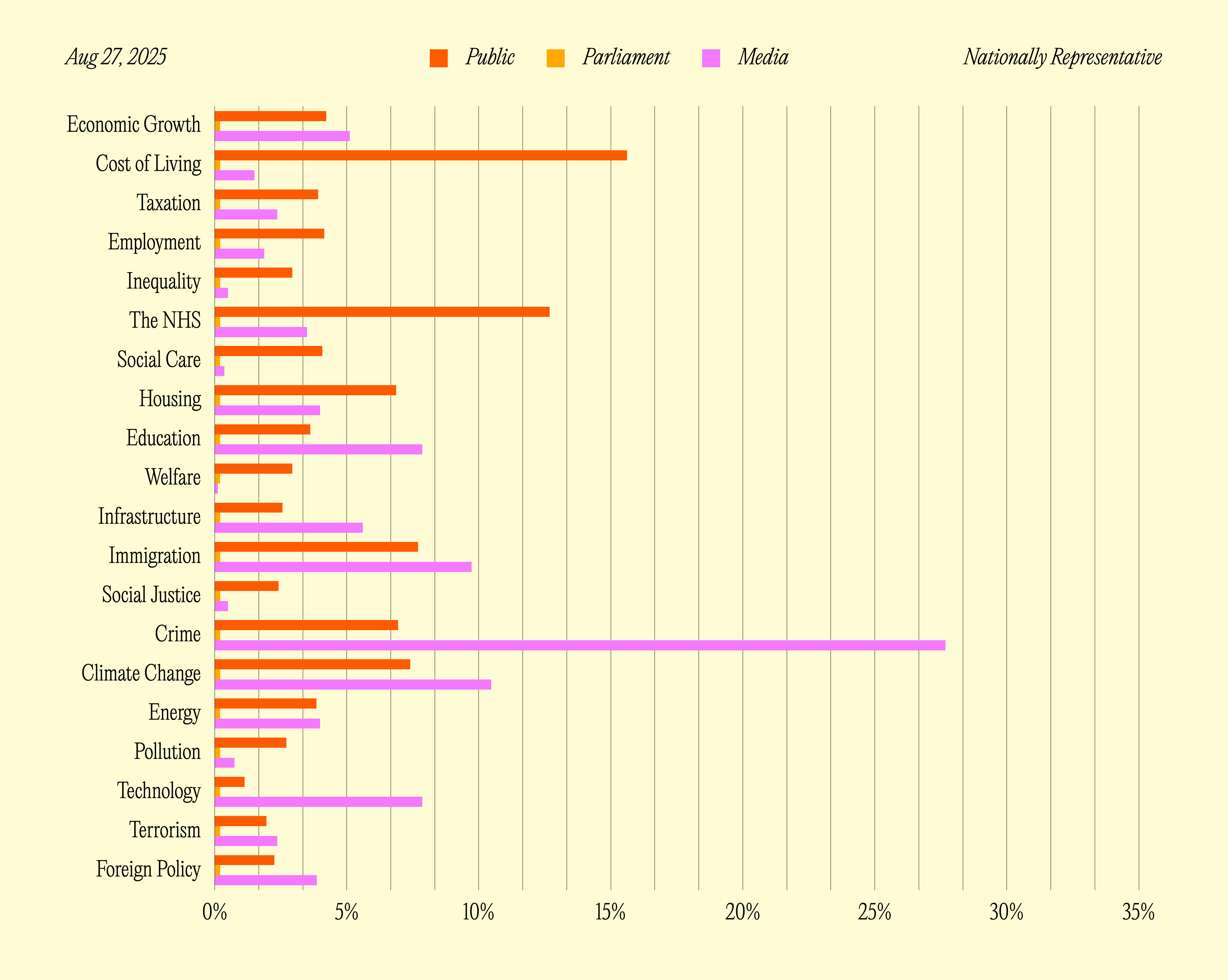
Public concern remains dominated by the cost of living crisis at 15.6%, representing a modest increase from 14.8% last week. The NHS continues as the second-highest priority at 12.7%, marking a notable rise from 11.6%, reflecting ongoing healthcare pressures. Immigration concerns have strengthened to 7.7%, up from 6.8%, suggesting growing discourse around migration policies. Climate change maintains steady attention at 7.4%, whilst crime concerns have risen significantly to 6.9% from 5.4%. Housing remains consistently important at 6.9%, showing resilience despite broader economic uncertainties. Economic growth and employment both register at 4.2%, reflecting stable positioning in public priorities. With Parliament in summer recess, political attention metrics are absent this week, allowing clearer focus on sentiment patterns. Education concerns remain modest at 3.6%, whilst social care at 4.1%, taxation at 3.9%, and welfare at 2.9% cluster predictably. Infrastructure shows slight strengthening to 2.6%, whilst energy concerns remain stable at 3.9% in public consciousness. Lower-priority issues include pollution at 2.7%, terrorism at 2.0%, social justice at 2.4%, and foreign policy at 2.3%. Technology registers minimal concern at 1.1%, reflecting limited public anxiety about technological developments. The pattern suggests a public increasingly focused on immediate economic pressures and essential services during summer. Media coverage demonstrates markedly different priorities, with crime receiving disproportionate attention at 27.7% compared to public levels. Technology and education receive equal media focus at 7.9% each, significantly exceeding their respective public priority rankings. Climate change garners substantial media coverage at 10.5%, considerably higher than public concern at 7.4%, indicating media emphasis. Infrastructure receives 5.6% media attention, whilst energy, foreign policy, and housing receive moderate coverage.
Sep 3
At the Top:
Cost of living ranks highest at 15.8%, followed by the NHS at 11.9% and immigration at 8.9%
On the Up:
Immigration increased by 1.2% from last week, while employment decreased by 1.3%
In the Press:
Crime had the most coverage at 22.9%, followed by education at 9.5% and climate change at 9.1%
Immigration Concerns Spike
Which challenges facing society today do your social circle feel need the most urgent attention?
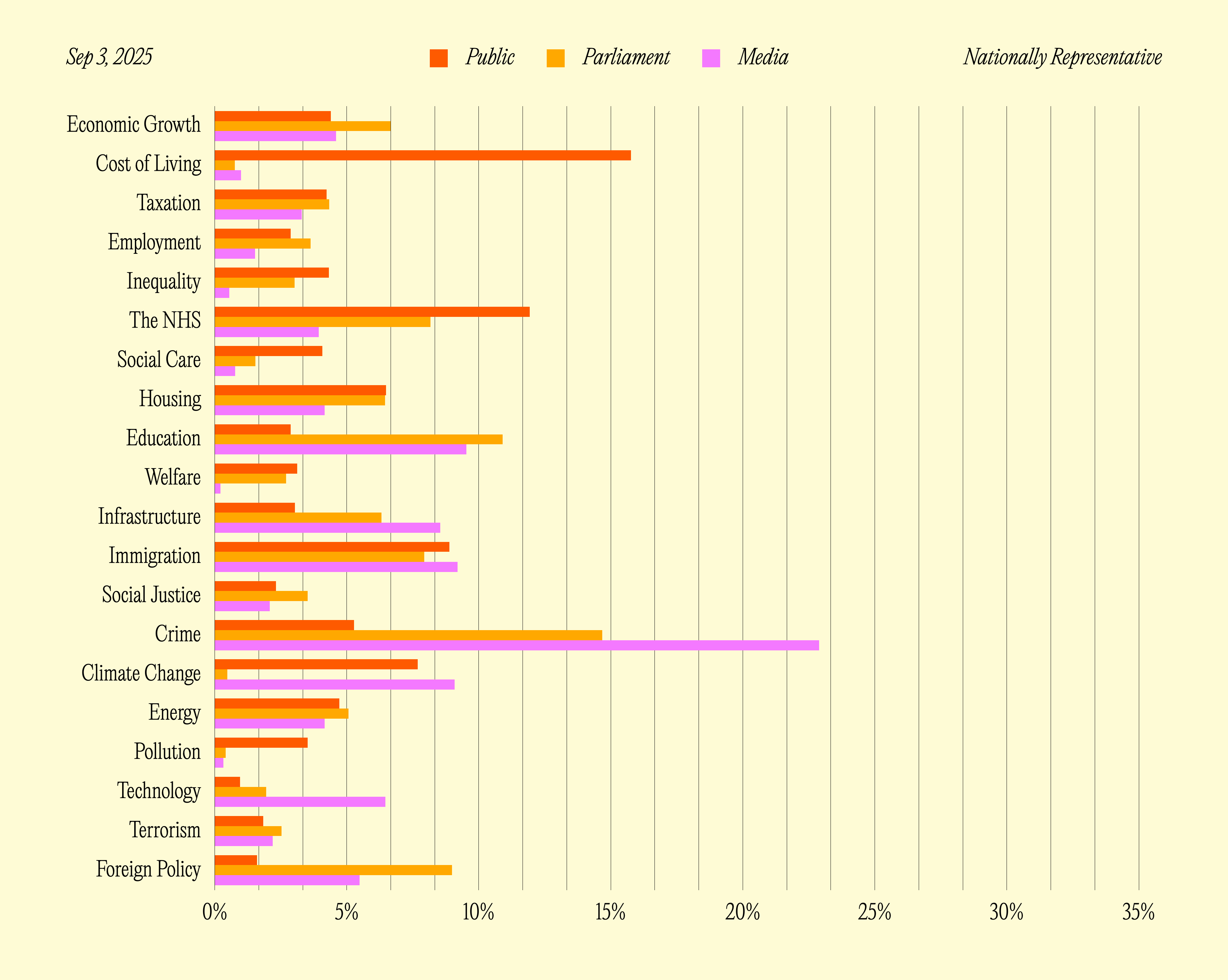
The public's concerns this week reflect established priorities, with cost of living maintaining its position as the dominant worry at 15.8%, followed by the NHS at 11.9% and immigration rising to 8.9%. Parliament's return from summer recess has brought renewed legislative attention across most policy areas, with crime commanding 14.7% of parliamentary focus alongside education at 10.9% and foreign policy at 9.0%. Immigration continues its upward trajectory in public concern, increasing from 7.7% last week to 8.9% this week, marking the highest level since the survey began in March. The media landscape shows crime maintaining substantial coverage at 22.9%, though this represents a notable decrease from the 27.7% peak recorded last week. Climate change remains steady in public consciousness at 7.7%, whilst parliamentary attention to environmental issues stays minimal at just 0.5%, highlighting the ongoing disconnect between public environmental priorities and legislative focus. Housing concerns have remained relatively stable at 6.5%, though parliamentary attention to housing policy has increased to 6.5% following the return from recess. Employment worries have declined to their lowest point at 2.9% of public concern, suggesting improved confidence in the job market conditions. Technology concerns remain consistently low at just 1.0% of public attention, reflecting minimal anxiety about technological disruption amongst the general population. The gap between public prioritisation of cost of living issues and parliamentary attention remains substantial, with public concern at 15.8% compared to just 0.8% of legislative focus, indicating potential policy misalignment on this critical issue. Social care maintains steady but modest concern levels at 4.1%, whilst parliamentary focus on social care policy has increased modestly to 1.5% since MPs returned from their summer break.
Sep 10
At the Top:
Cost of Living ranks highest at 15.9%, followed by The NHS at 12.3% and Immigration at 8.8%
On the Up:
Employment increased by 0.9% from last week, while Pollution decreased by 0.9%
In the Press:
Crime had the most coverage at 24.7%, followed by Education at 9.7% and Climate Change at 9.6%
Parliament Focuses on Taxation
Which challenges facing society today do your social circle feel need the most urgent attention?
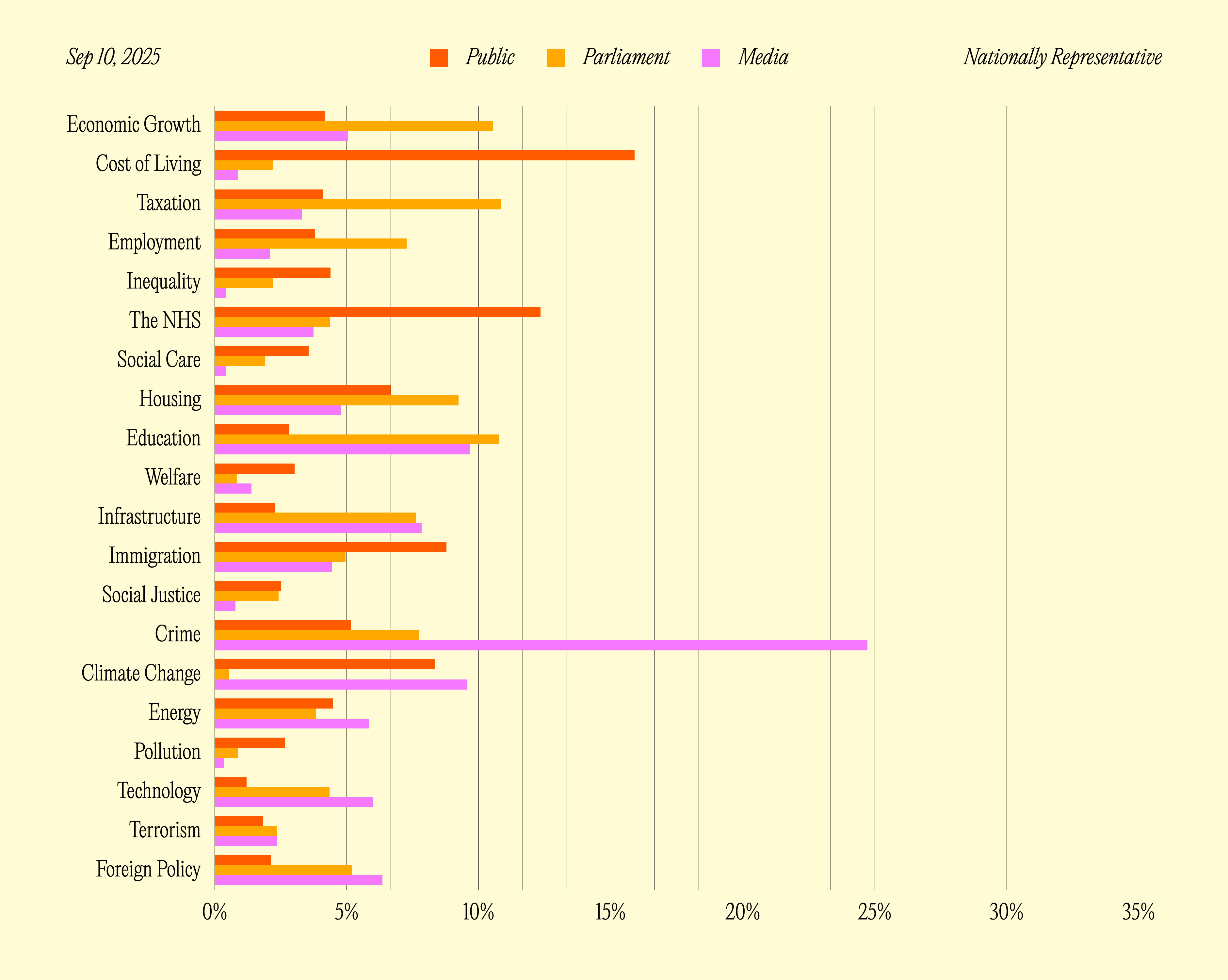
Cost of living dominates public concerns at 15.9%, maintaining its position as the most pressing issue and demonstrating remarkable consistency as the primary worry throughout the survey period, with levels consistently above 14% since early April, indicating persistent economic pressures affecting household budgets across all demographics. The NHS maintains its position as the second-highest priority at 12.3%, demonstrating the enduring importance of healthcare provision in public consciousness despite fluctuating week-on-week variations that have characterised this issue throughout the survey period, reflecting ongoing concerns about service quality and accessibility. Immigration emerges as the third-highest concern at 8.8%, marking a significant shift in societal priorities and representing a sustained upward trajectory that has persisted since mid-July, reflecting growing public anxiety about border security and migration policy that has intensified throughout the summer months. Climate change registers at 8.3%, maintaining its position as a significant medium-term concern that has shown considerable stability over recent months, demonstrating consistent public awareness of environmental issues despite immediate economic pressures. Crime has declined to 5.2% after experiencing considerable volatility throughout the summer period, suggesting that initial security concerns may have stabilised. Housing concerns remain stable at 6.7%, reflecting ongoing pressures in the property market that continue to affect both homeowners and renters. The dramatic surge in parliamentary coverage of taxation issues to 10.8% reflects the Angela Rayner stamp duty controversy that dominated Westminster discourse, following her admission of underpaying £40,000 in property taxes on her Hove flat, ultimately leading to her resignation as Deputy Prime Minister on 5 September after breaching the ministerial code.
Sep 17
At the Top:
Cost of Living ranks highest at 15.3%, followed by The NHS at 12.6% and Immigration at 8.5%
On the Up:
Terrorism increased by 0.9% from last week, while Climate Change decreased by 1.4%
In the Press:
Crime had the most coverage at 24.8%, followed by Education at 10.5% and Foreign Policy at 8.3%
Cost of Living Remains Top Issue
Which challenges facing society today do your social circle feel need the most urgent attention?
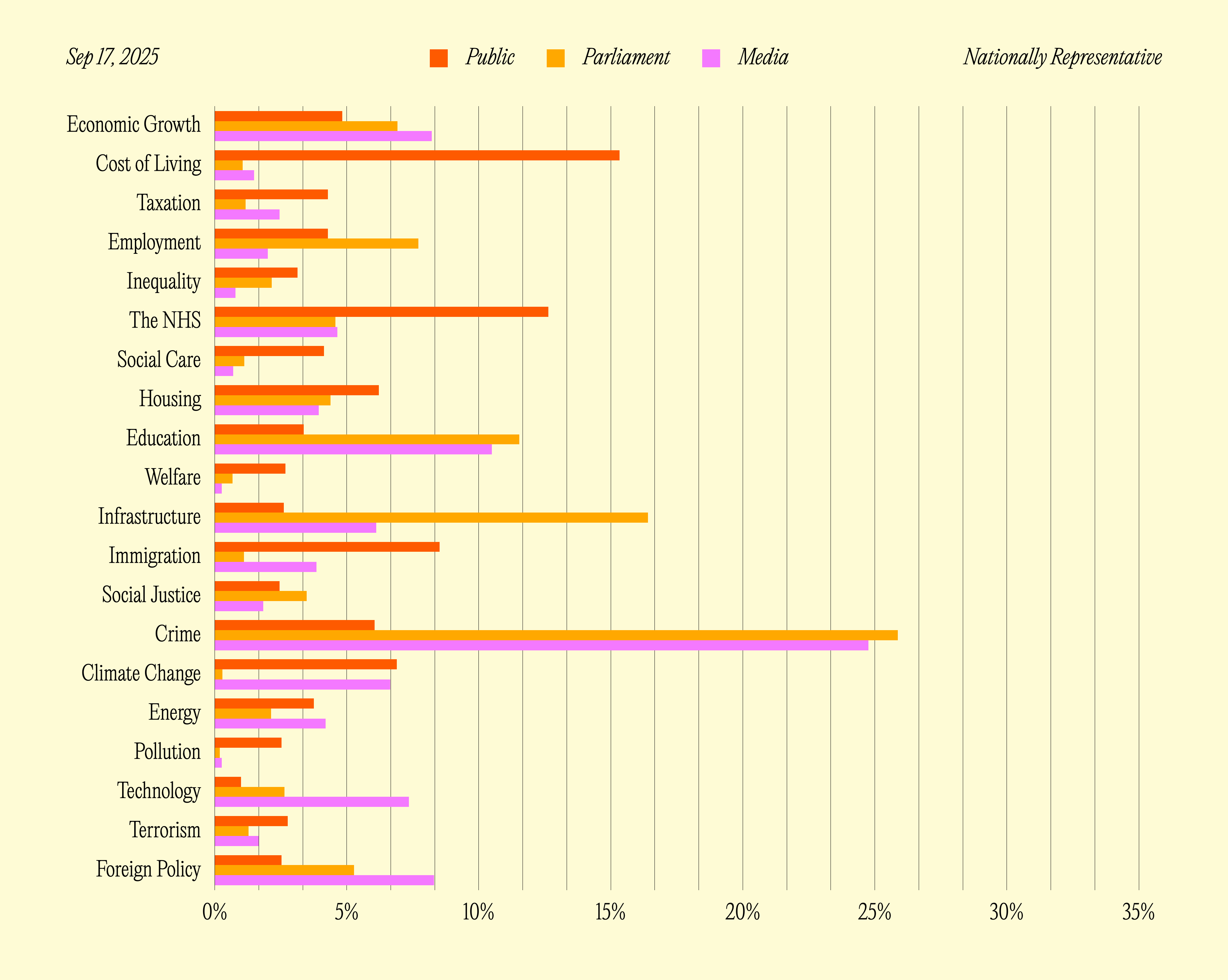
Cost of living maintains its overwhelming dominance at 15.3%, demonstrating remarkable consistency as the most pressing issue throughout the survey period, with levels persistently above 14% since early April. The NHS follows at 12.6%, maintaining its position despite week-on-week fluctuations, reflecting ongoing anxieties about healthcare service delivery and capacity. Immigration emerges as the third-highest concern at 8.5%, continuing the sustained upward trajectory that has characterised this issue since mid-July, representing growing public anxiety about border security and migration policy. Climate change registers at 6.9%, showing relative stability as a medium-term concern, whilst crime declines to 6.1% after experiencing considerable volatility throughout summer. Housing concerns remain steady at 6.2%, reflecting persistent property market pressures affecting both homeowners and renters. Economic growth registers at 4.8%, showing increased attention compared to recent weeks. Parliamentary coverage demonstrates infrastructure surging to 16.4%, indicating Westminster's shifting priorities towards long-term investment discussions. Employment worries stabilise at 4.3%, indicating moderate labour market confidence and reduced job security fears across various sectors. Education concerns remain subdued at 3.4%, consistent with lower priority when immediate economic pressures dominate public discourse. Social care maintains a steady 4.1%, whilst taxation concerns register at 4.3%, both showing consistent public attention over recent months. Technology and foreign policy concerns remain relatively low at 1.0% and 2.5% respectively, suggesting these issues have not gained significant traction with the public during this period. The data demonstrates sustained hierarchies, with economic issues maintaining priority over social considerations.
Sep 24
At the Top:
Cost of Living ranks highest at 16.4%, followed by The NHS at 12.0% and Immigration at 8.9%
On the Up:
Cost of Living increased by 1.1% from last week, while Climate Change decreased by 0.4%
In the Press:
Crime had the most coverage at 22.4%, followed by Foreign Policy at 10.4% and Education at 7.8%
Foreign Policy Coverage Spikes
Which challenges facing society today do your social circle feel need the most urgent attention?
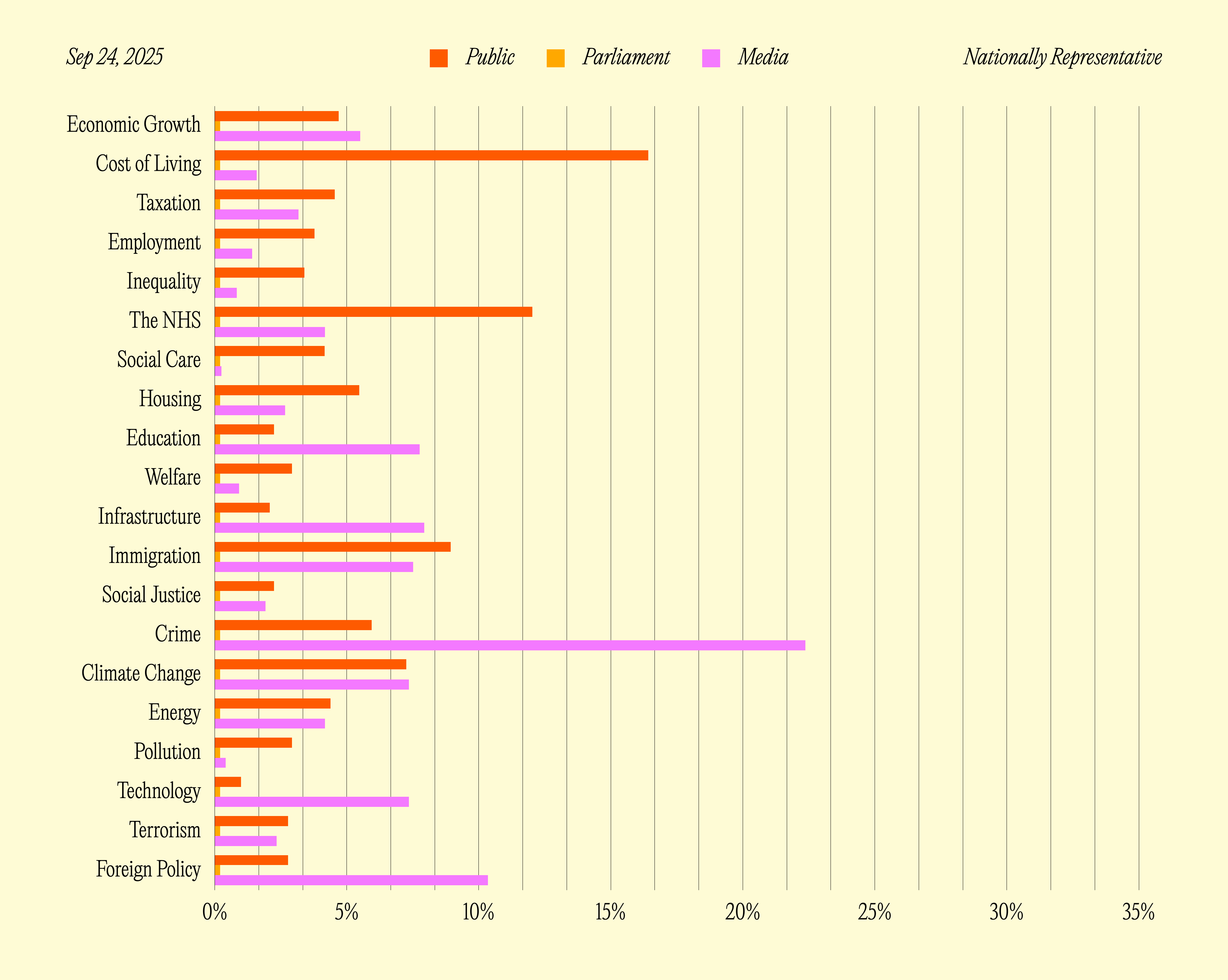
Cost of living concerns continue to dominate public priorities at 16.4%, maintaining their position as the most pressing issue facing society. This represents a notable increase from the previous week's 15.3%, reinforcing the sustained trajectory observed throughout the summer months. The NHS remains the second most significant concern at 12.0%, showing remarkable consistency despite slight weekly fluctuations that have characterised healthcare priorities throughout the survey period. Immigration concerns have reached 8.9%, marking the highest level recorded in the dataset and reflecting a gradual but persistent upward trend that has developed across multiple survey periods since early summer. Climate change concerns have stabilised at 7.2%, following earlier volatility, whilst crime concerns at 5.9% show modest strengthening from recent lows observed in early September. Housing concerns have declined to 5.5%, representing a continuation of the downward trajectory observed since mid-summer peaks when the issue commanded greater attention. Economic growth priorities have remained relatively stable at 4.7%, though this masks the considerable variation witnessed across different survey periods throughout the year. Education concerns have fallen to 2.2%, continuing a sustained decline that has been evident across multiple weeks, whilst social care maintains steady positioning at 4.2%. Technology concerns remain minimal at 1.0%, consistent with their persistently low ranking throughout the survey sequence. Energy issues command 4.4% of public attention, showing resilience despite seasonal variations, whilst pollution concerns have stabilised at 2.9% after earlier fluctuations. These patterns demonstrate the enduring primacy of bread-and-butter economic issues, alongside growing attention to immigration matters, whilst environmental concerns appear to have found a more settled position in public consciousness after earlier periods of heightened attention.
Oct 1
At the Top:
Cost of living ranks highest at 15.7%, followed by the NHS at 11.0% and immigration at 8.0%
On the Up:
The NHS decreased by 1.1% from last week, while immigration decreased by 0.9%
In the Press:
Crime had the most coverage at 23.1%, followed by infrastructure at 8.3% and education at 7.3%
Welfare Concerns Rise
Which challenges facing society today do your social circle feel need the most urgent attention?
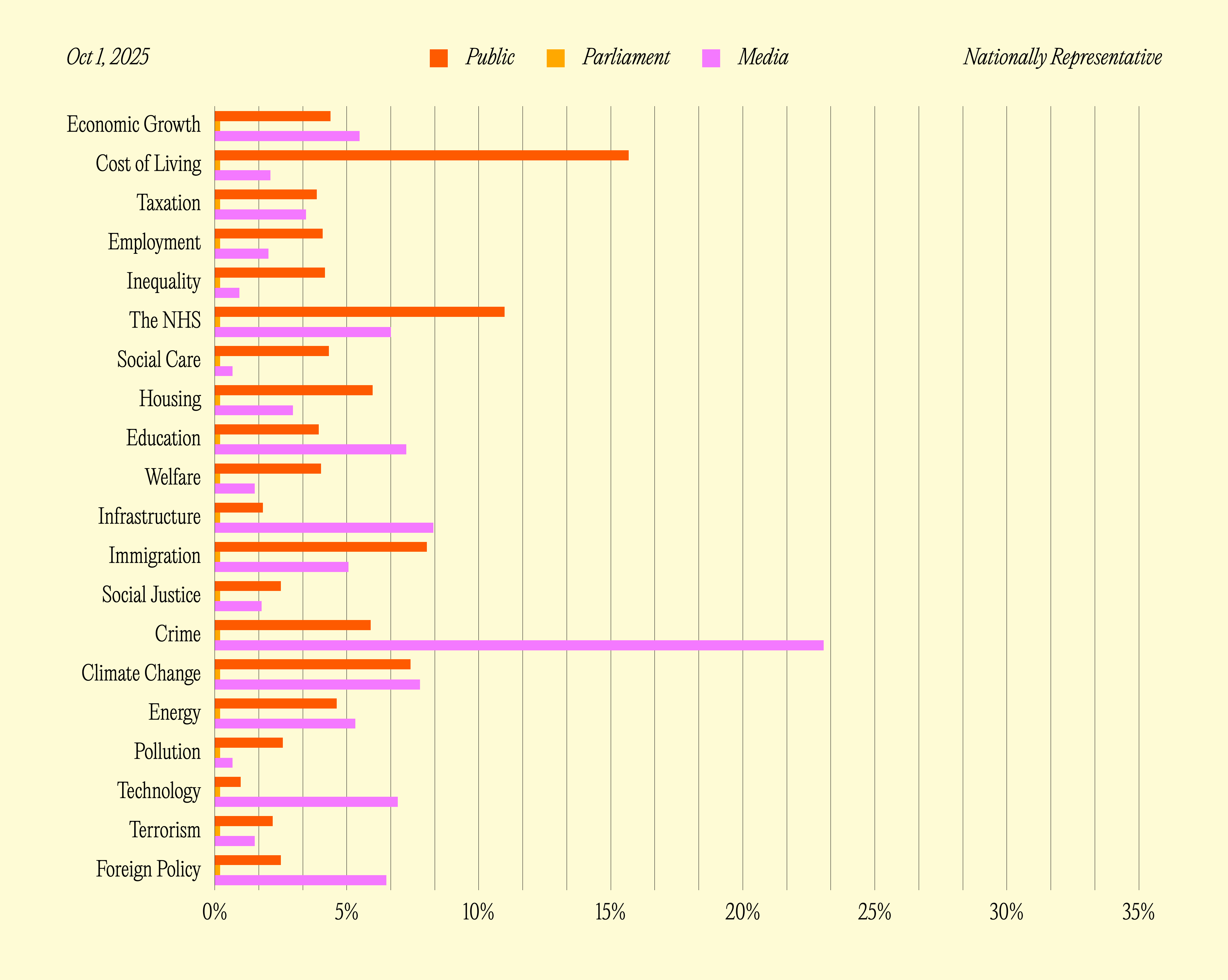
Cost of living continues its long-established position as the dominant public priority, registering 15.7% of overall concern, maintaining the elevated levels observed throughout recent months. The issue has remained consistently above 14.0% since mid-July, demonstrating sustained public focus on economic pressures affecting households. Immigration stands as the second-highest public concern at 8.0%, representing a slight decline from the 8.9% recorded on 24th September but continuing a pattern of heightened attention that has persisted since mid-August, when the issue consistently exceeded 8.0%. The NHS ranks third at 11.0%, showing a notable decrease from the 12.6% recorded two weeks prior, marking the lowest level since early July. This downward movement represents a multi-week trend, as NHS concern has gradually declined from peaks above 12.0% observed in mid-September. Climate change registers at 7.4%, maintaining the relatively stable pattern seen throughout recent months, consistently hovering between 6.9% and 8.3% since mid-August. Crime concern stands at 5.9%, showing modest fluctuation within a narrow band between 5.2% and 6.7% over the past two months, suggesting neither significant escalation nor decline in public attention. Education records 3.9%, representing a modest increase from the particularly low 2.2% observed on 24th September, though remaining well below the levels of 4.0% or higher seen in most weeks prior to mid-September. Housing concern registers 6.0%, demonstrating the relatively stable pattern maintained since mid-July, consistently ranging between 5.5% and 6.8%. Energy stands at 4.6%, showing a modest increase from recent weeks and aligning with the range of 3.8% to 4.7% observed since mid-August. Inequality records 4.2%, representing a slight increase and continuing the fluctuating pattern between 3.1% and 4.5% observed across recent months.
Oct 8
At the Top:
Cost of living ranks highest at 15.9%, followed by the NHS at 13.3% and immigration at 8.8%
On the Up:
The NHS increased by 2.3% from last week, while housing decreased by 0.8%
In the Press:
Crime had the most coverage at 26.3%, followed by technology at 8.9% and infrastructure at 6.5%
Terrorism Concerns Spike
Which challenges facing society today do your social circle feel need the most urgent attention?
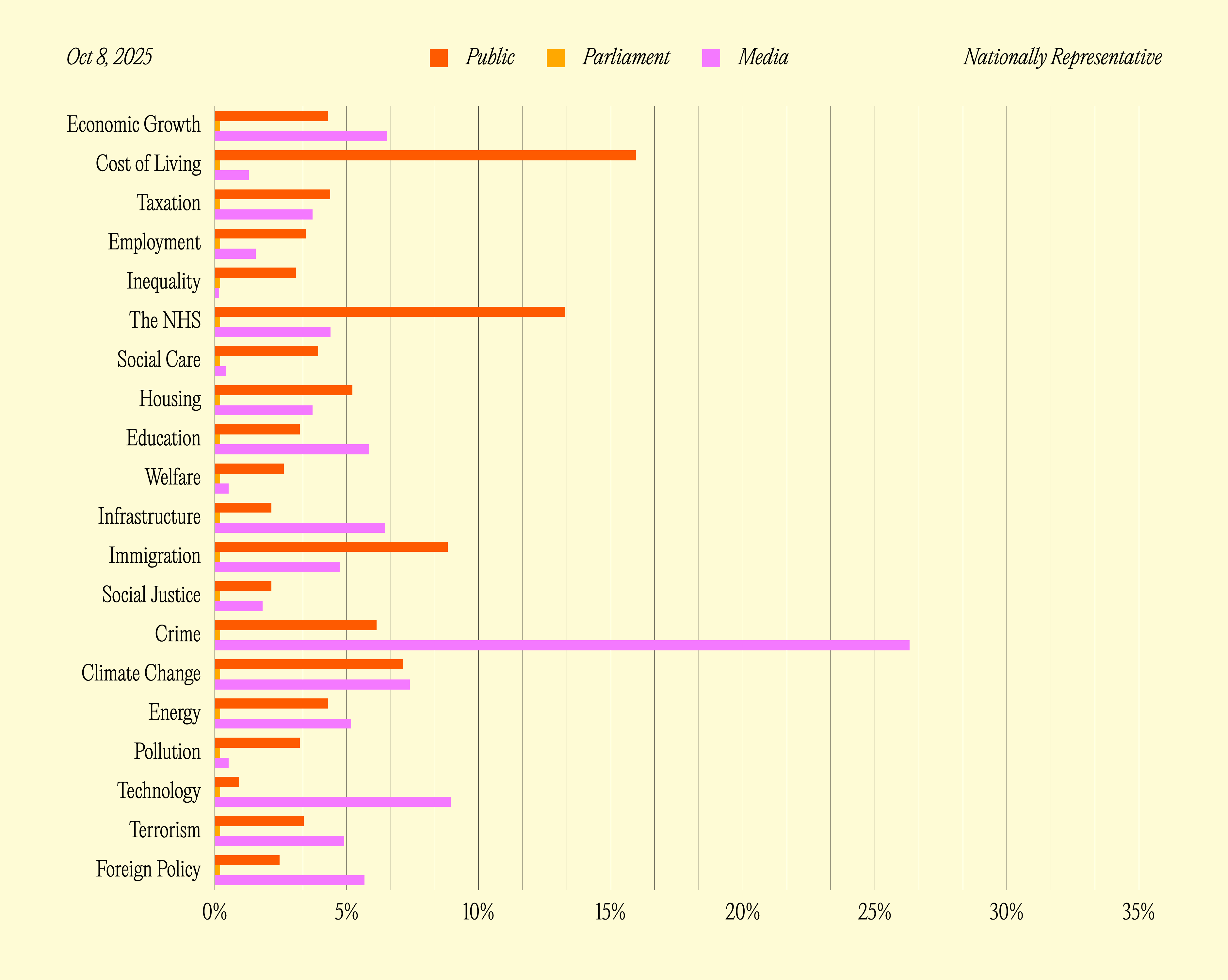
Cost of living remains the dominant public concern at 15.9%, maintaining its consistent position as the foremost priority across recent months and demonstrating the enduring nature of economic pressures on households. Immigration continues its sustained elevation at 8.8%, representing one of the highest levels of public attention recorded throughout the tracking period and reflecting ongoing prominence of this issue since mid-summer, when it began its persistent rise in public consciousness. The NHS stands at 13.3%, marking a notable increase from 11.0% the previous week and suggesting renewed focus on health service pressures as winter approaches and demand on services intensifies. Crime registers 6.1% of public concern, whilst climate change holds steady at 7.1%, maintaining its position within the upper tier of public priorities. Parliamentary attention shows no recorded data for this period due to party conference season, preventing comparative analysis of legislative focus during this recess period when MPs gather for their annual party gatherings. Media coverage prioritises crime at 26.3%, education at 5.9%, and infrastructure at 6.5%, maintaining crime's persistent dominance in news reporting across multiple weeks. Terrorism concern has increased to 3.4% of public attention, with media coverage jumping to 4.9%, both reflecting heightened awareness following recent attacks that have dominated news cycles. The gap between public concern for cost of living at 15.9% and its minimal media attention at 1.3% continues to be pronounced, highlighting divergence between what concerns the public and what receives coverage. Housing concern sits at 5.2%, whilst energy registers 4.3%, taxation at 4.4%, economic growth at 4.3%, and employment at 3.5%, all maintaining relatively stable positions across the tracking period. Social care stands at 3.9%, welfare at 2.6%, and pollution at 3.2%, continuing to occupy lower tiers of public attention.
Oct 15
At the Top:
Cost of living ranks highest at 15.9%, followed by the NHS at 12.6% and immigration at 9.2%
On the Up:
The NHS increased by 2.6% from last week, while climate change decreased by 0.6%
In the Press:
Crime had the most coverage at 23.0%, followed by education at 9.5% and economic growth at 6.1%
Immigration Reaches All Time High
Which challenges facing society today do your social circle feel need the most urgent attention?

Cost of living maintains its position as the dominant public concern at 15.9%, continuing the sustained pattern observed throughout the year, whilst immigration has reached a new peak at 9.2%, marking its highest level across the entire tracking period. The NHS follows at 12.6%, representing a notable increase of 2.6% from the previous week and returning to levels more typical of the spring months. Parliament has returned to session following the conference season, with the NHS receiving substantial attention at 12.1% of parliamentary debate, alongside notable focus on crime at 14.4% and education at 10.8%. Housing concern stands at 5.5% amongst the public, maintaining relatively stable levels seen since late summer, though this masks considerable volatility in parliamentary attention which has ranged from under 2% to over 15% across recent months. Climate change has declined to 6.6%, down 0.6% and continuing a gradual downward trend from peaks observed in mid-summer. Taxation has increased sharply to 5.4%, up 1.0% from last week, potentially reflecting parliamentary debates around fiscal policy as MPs reconvene. Crime remains steady at 6.2% in public concern but continues to dominate media coverage at 23.0%, maintaining the sustained elevation in press attention evident since spring. Energy stands at 4.2% whilst terrorism has reached 3.2%, up from 2.5% last week. Education registers 3.3% amongst the public yet commands 9.5% of media attention, suggesting ongoing press interest in educational policy matters. Infrastructure concern remains modest at 1.9% in public opinion, yet Parliament allocated 7.5% of debate time to the topic. Employment stands at 3.7% whilst social care registers 4.1%, both maintaining relatively stable positions. Foreign policy stands at 2.1% amongst the public whilst media coverage registers 3.5%, showing consistent patterns across both domains.
Oct 22
At the Top:
Cost of living ranks highest at 15.4%, followed by the NHS at 12.3% and immigration at 8.5%
On the Up:
Taxation increased by 1.0% from last week, while immigration decreased by 0.7%
In the Press:
Crime had the most coverage at 25.5%, followed by climate change at 11.1% and education at 8.6%
Cost of Living Still Dominates
Which challenges facing society today do your social circle feel need the most urgent attention?
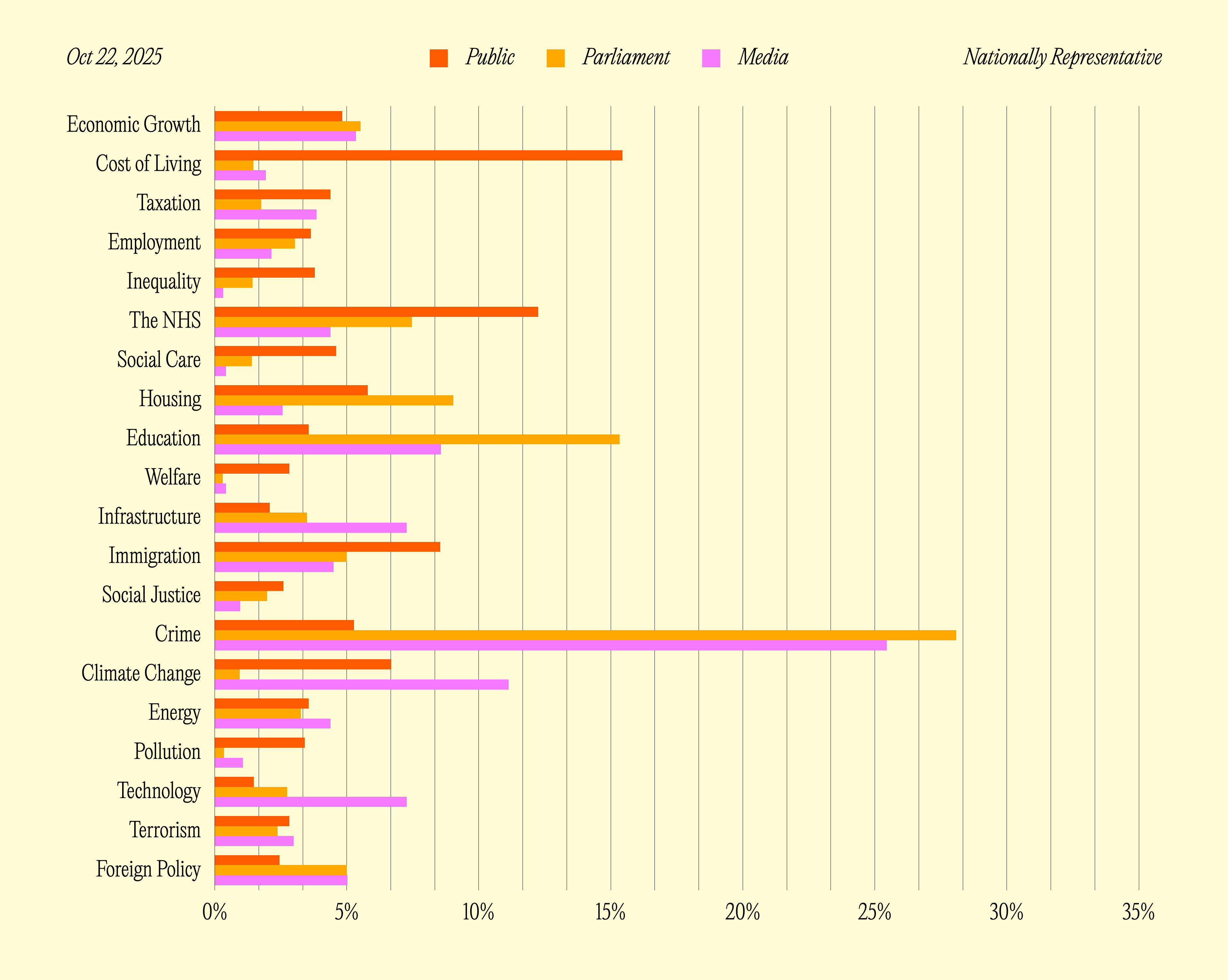
Cost of living remains the dominant public concern at 15.4%, maintaining its position as the most pressing issue for the British public throughout the autumn period. The NHS follows at 12.3%, showing a slight decrease from the previous week's 12.6% but remaining consistently above 12% since early October, reflecting ongoing concerns about healthcare service capacity and winter pressures on the health service. Immigration stands at 8.5%, representing a modest decline from last week's 9.2% but continuing the sustained upward trajectory observed since mid-July, when it stood below 7.5%. This multi-week rise suggests growing public concern about border policy and asylum processing, though the slight weekly dip indicates some stabilisation of attention on this issue. Crime registers at 5.3%, down from 6.2% the previous week, whilst housing holds at 5.8%, marginally higher than last week's 5.5%. Climate change records 6.7%, maintaining relatively stable concern levels seen throughout September and October. Education stands at 3.6%, taxation at 4.4%, and economic growth at 4.8%. The persistence of cost of living at the top reflects ongoing household budget pressures amid continued economic uncertainty and inflation concerns. The gap between public priorities and parliamentary focus remains particularly notable on cost of living, where public concern at 15.4% vastly exceeds parliamentary attention at just 1.5%, suggesting a significant disconnect between citizen priorities and legislative debate during this period. Crime dominates media coverage at 25.5%, far exceeding public concern at 5.3%, indicating a substantial gap between press focus and citizen priorities. Parliamentary attention has concentrated heavily on crime at 28.1% and education at 15.3% this week, whilst giving minimal attention to cost of living despite its overwhelming public salience.
Oct 29
At the Top:
Cost of living ranks highest at 14.6%, followed by the NHS at 12.3% and immigration at 8.4%
On the Up:
Energy increased by 1.5% from last week, while cost of living decreased by 0.8%
In the Press:
Crime had the most coverage at 19.0%, followed by technology at 8.8% and infrastructure at 8.2%
Energy Concerns Rise
Which challenges facing society today do your social circle feel need the most urgent attention?
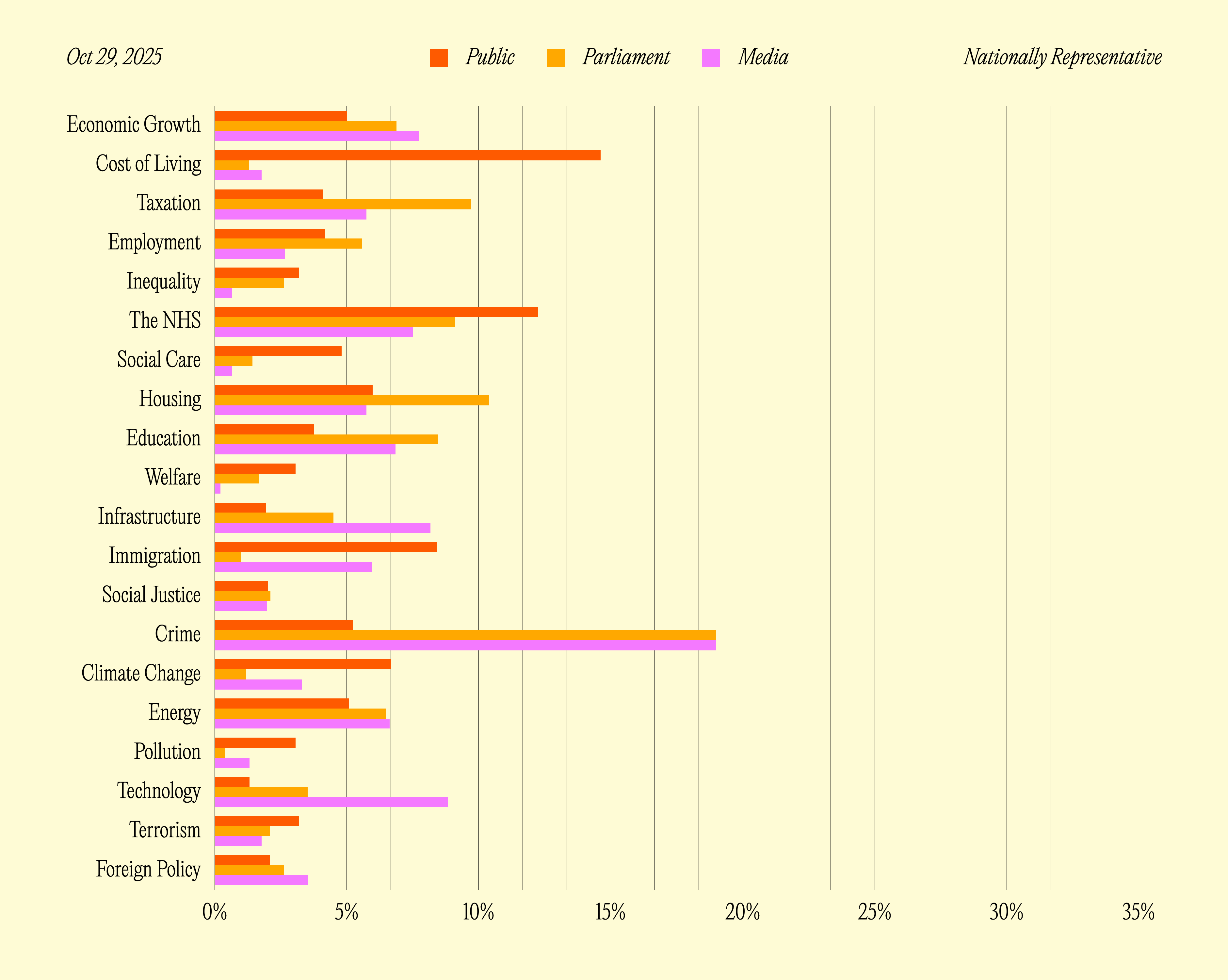
Cost of living remains the dominant public concern at 14.6%, maintaining its position as the issue most urgently requiring attention across recent weeks. The NHS follows at 12.3%, reflecting sustained pressure on health services and consistent public anxiety about healthcare access and quality. Immigration stands at 8.4%, continuing its multi-week presence amongst top priorities, whilst climate change holds at 6.7%, showing relatively stable concern levels. Housing registers 6.0%, demonstrating consistent mid-tier prioritisation, whilst crime sits at 5.2%, maintaining steady levels of public attention. Economic growth reaches 5.0%, marking a modest increase from the previous week's 4.8%, whilst energy concern rises notably to 5.1%, representing the highest level observed in several weeks and potentially reflecting seasonal factors as winter approaches alongside recent policy discussions. Education at 3.8% and taxation at 4.1% remain stable mid-tier concerns, with the latter showing little movement despite ongoing Budget-related discourse. Parliamentary attention during this period demonstrates notably elevated focus on crime at 19.0%, reflecting legislative activity on public safety measures, whilst taxation commands 9.7% of parliamentary time, likely connected to the government's recent Autumn Budget statement and subsequent debates about fiscal policy. Housing receives 10.4% of parliamentary debate, suggesting continued legislative priority in this area, whilst the NHS commands 9.1% of parliamentary time, though this represents considerably less attention than the public priority level would suggest. Education attracts 8.5% of parliamentary focus, somewhat exceeding its public concern level, whilst infrastructure receives 4.5% of parliamentary attention. Immigration garners merely 1.0% of parliamentary time, creating a substantial and persistent gap between public concern at 8.4% and political focus on this issue, a disparity that has characterised recent weeks.
Nov 5
At the Top:
Cost of living ranks highest at 15.4%, followed by the NHS at 11.8% and immigration at 9.0%
On the Up:
Crime increased by 1.5% from last week, while employment decreased by 1.0%
In the Press:
Crime had the most coverage at 26.2%, followed by infrastructure at 10.1% and climate change at 8.8%
Crime Concerns Grow
Which challenges facing society today do your social circle feel need the most urgent attention?
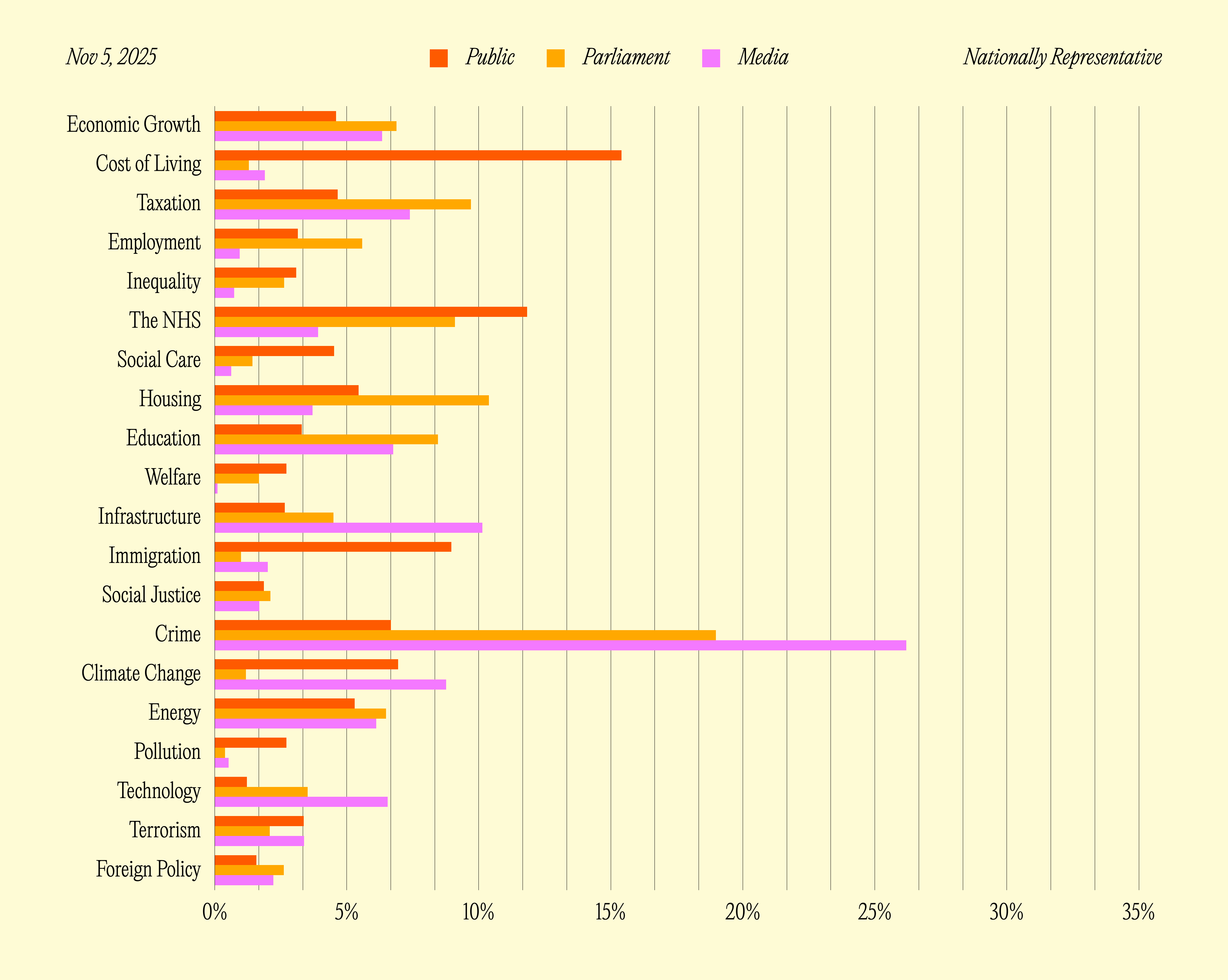
Cost of living remains the dominant public concern at 15.4%, maintaining its position as the most pressing issue facing British households despite a decline of 0.8% from the previous week. The NHS follows at 11.8%, having decreased by 0.4% week-on-week, whilst immigration stands at 9.0%, rising by 0.5% to continue its upward trajectory across recent months. Crime increased notably by 1.5% to reach 6.7%, marking one of the most substantial weekly movements and suggesting heightened public anxiety around law and order. Climate change sits at 7.0%, showing a modest increase of 0.3%, whilst housing decreased by 0.5% to 5.5%, continuing a pattern of gradual decline from earlier in the year. Energy rose significantly by 1.2% to 5.3%, potentially reflecting seasonal concerns as winter approaches, whilst taxation increased by 0.6% to 4.7%, a movement that corresponds with Parliamentary focus on tax policy which reached 9.7% this week. Social care stands at 4.5%, economic growth at 4.6%, and education at 3.3%, all showing relative stability across the recent period. Employment fell by 1.0% to 3.2%, representing one of the sharpest drops amongst mid-tier concerns, whilst terrorism increased by 0.2% to 3.4%. Infrastructure registered at 2.7%, welfare at 2.7%, and pollution at 2.7%, clustering together at similar levels of public attention. Lower-tier concerns continue to attract minimal focus, with technology at 1.2%, social justice at 1.9%, and foreign policy at 1.6%. The gap between public concern for cost of living and Parliamentary attention, which stands at just 1.3%, highlights a persistent disconnect between what worries households most and where legislative focus is directed. Media coverage this week was dominated by crime at 26.2%, followed by infrastructure at 10.1% and climate change at 8.8%, demonstrating substantial misalignment with the public's prioritisation of cost of living issues.
Nov 12
At the Top:
Cost of living ranks highest at 15.0%, followed by the NHS at 12.6% and immigration at 8.9%
On the Up:
The NHS increased by 0.8% from last week, while climate change decreased by 0.5%
In the Press:
Crime had the most coverage at 26.6%, followed by infrastructure at 9.8% and climate change at 9.6%
Parliament Focuses on Education
Which challenges facing society today do your social circle feel need the most urgent attention?
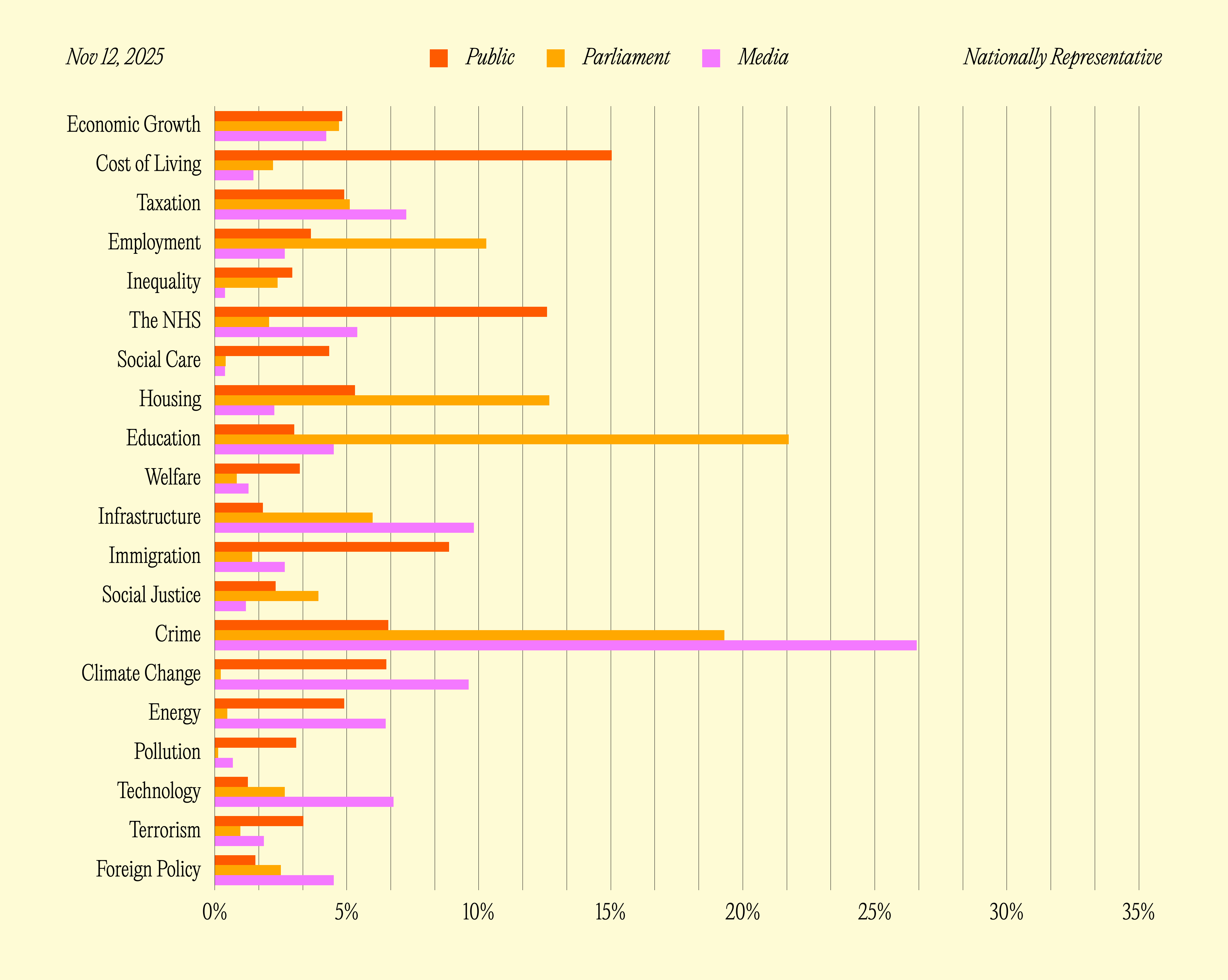
Cost of living remains the dominant public concern at 15.0%, maintaining its position at the top of public priorities across recent weeks and showing remarkable consistency throughout the autumn period. The NHS follows at 12.6%, showing a modest uptick of 0.8% from the previous week and continuing its pattern of sustained public attention throughout October and November, remaining firmly established as the second most pressing concern. Immigration stands at 8.9%, having maintained relatively stable levels around 8.5-9.0% since mid-September, reflecting ongoing public focus on this issue. Crime registers at 6.6%, demonstrating consistent concern after its increase from 5.2% in late October, whilst climate change records 6.5%, showing minimal movement from previous weeks. Housing sits at 5.3%, maintaining stable levels across multiple survey periods. Taxation increased to 4.9%, up 0.2% from last week, whilst economic growth stands at 4.8%, both occupying the middle tier of public priorities. Energy recorded 4.9%, maintaining its elevated position from recent weeks and showing little volatility. Education registers 3.0%, employment 3.6%, and social care 4.3%, all showing relatively stable patterns across multiple weeks without significant shifts. Parliament's focus during the week to 12 November exhibited striking concentration on education at 21.7%, marking a substantial increase from 8.5% the previous week and representing the highest level of parliamentary attention to any single issue. Crime received 19.3% of parliamentary attention, whilst housing commanded 12.7% of debate, substantially higher than its 5.3% public priority, highlighting a significant disparity between parliamentary focus and public concern. Economic growth received 4.7% whilst the NHS garnered just 2.1%, creating a considerable gap with its 12.6% public concern level and illustrating one of the most pronounced misalignments between public priorities and parliamentary attention.
Nov 19
At the Top:
Cost of living ranks highest at 16.1%, followed by the NHS at 11.7% and immigration at 8.1%
On the Up:
Climate change increased by 1.3% from last week, while immigration decreased by 0.8%
In the Press:
Crime had the most coverage at 21.0%, followed by immigration at 10.4% and technology at 9.8%
Climate Concerns Rise
Which challenges facing society today do your social circle feel need the most urgent attention?
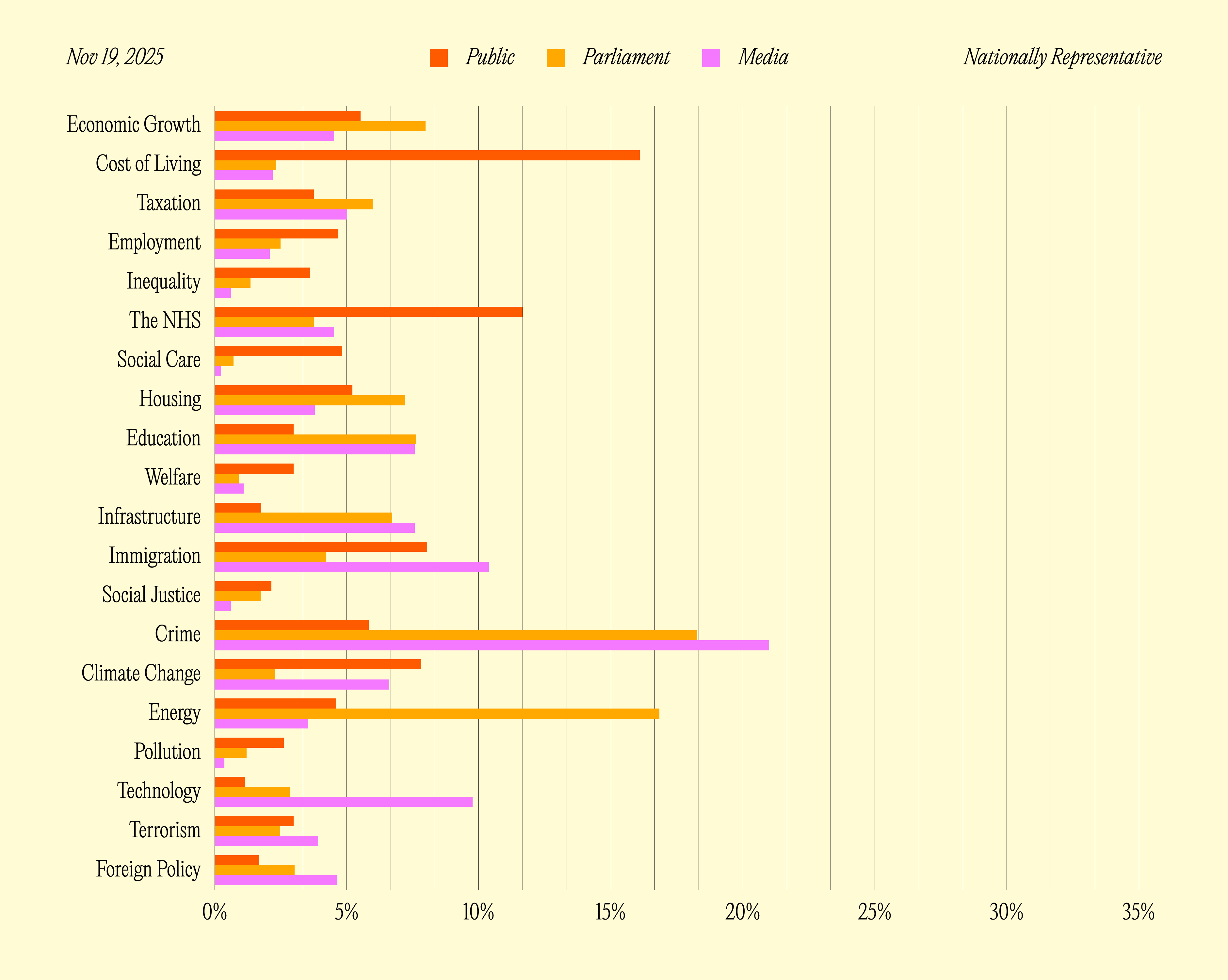
Cost of living maintains its position as the dominant public concern at 16.1%, whilst the NHS stands at 11.7% and immigration at 8.1%. Cost of living increased by 1.1% from the previous week, marking a return to higher concern levels after declining to 15.0% the week prior. Immigration fell notably from its peak of 8.9% the previous week, declining by 0.8%, though it remains substantially elevated compared to its levels earlier in the year, having risen consistently from around 5.6% in March to current levels above 8.0%. The NHS declined from 12.6% to 11.7%, continuing a pattern of volatility in recent weeks, with concern oscillating between 10.4% and 13.3% since late September. Climate change concern rose sharply to 7.8%, increasing by 1.3% from the previous week, representing its highest level since mid-October and suggesting renewed attention to environmental issues. Education concern remains relatively low at 3.0%, whilst housing sits at 5.2%, both showing minimal movement week-on-week. Crime concern declined slightly to 5.8%, whilst energy stood at 4.6% and employment at 4.7%, all maintaining relatively stable positions. Parliamentary attention remained heavily focused on crime at 18.3% and education at 7.6%, whilst cost of living received only 2.3% of debate time despite its overwhelming public prominence, highlighting a significant gap between public priorities and parliamentary focus. Energy jumped dramatically in Parliament to 16.8%, likely following policy announcements on energy security or pricing, whilst climate change received just 2.3% despite rising public concern. Employment debate surged to 10.3% in Parliament whilst housing received 7.2%, both areas receiving considerably more legislative attention than their public concern levels would suggest. Media coverage was dominated by crime at 21.0%, followed by immigration at 10.4%, which saw a substantial increase in press attention compared to previous weeks.
Nov 26
At the Top:
Cost of living ranks highest at 15.9%, followed by The NHS at 12.2% and Immigration at 8.1%
On the Up:
Taxation increased by 1.6% from last week, while Climate Change decreased by 1.8%
In the Press:
Crime had the most coverage at 25.2%, followed by Infrastructure at 9.2% and Education at 9.2%
Cost of Living Coverage Spikes
Which challenges facing society today do your social circle feel need the most urgent attention?
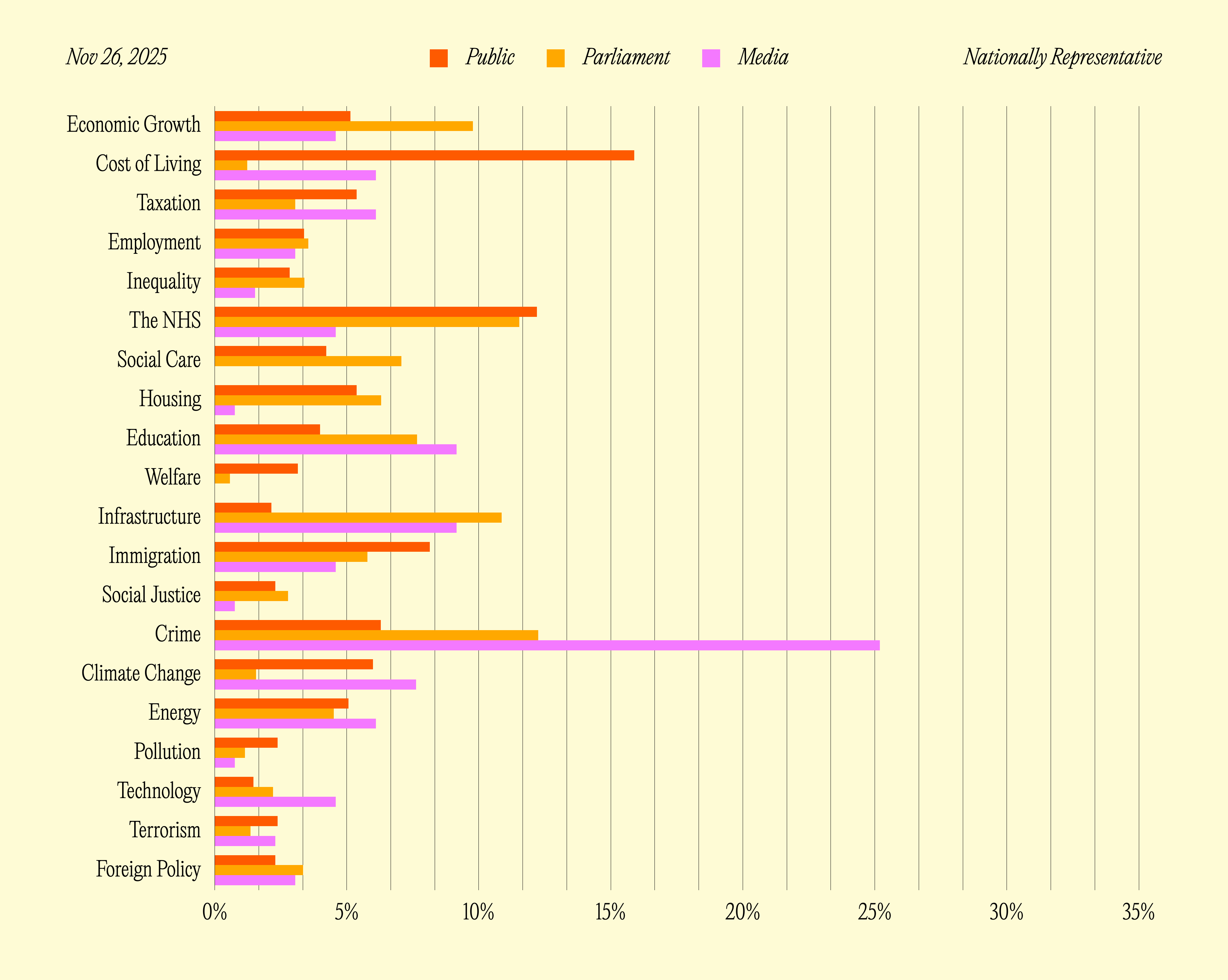
Cost of living continues to dominate public concern at 15.9%, maintaining its position as the most urgent priority for the second consecutive week after rising from 15.0% the previous week. The NHS follows at 12.2%, recovering from 11.7% last week and sustaining its position within the top tier of public concerns that it has occupied consistently throughout the year. Immigration stands at 8.1%, slightly higher than last week's 8.0%, continuing its gradual climb observed since mid-July when it stood around 7.2%, representing a sustained upward trajectory spanning four months. Crime registers at 6.3%, up from 5.8% last week, whilst taxation has increased notably to 5.4% from 3.8%, marking a significant rise of 1.6 percentage points that may reflect recent government announcements on fiscal policy ahead of the Budget implementation. Energy shows at 5.1%, consistent with its position in recent weeks and maintaining stability within the 4.6-5.1% range observed since October. Economic growth registers at 5.1%, similar to the 5.5% recorded last week, continuing its fluctuation around the 4.8-5.5% band characteristic of autumn. Housing stands at 5.4%, maintaining stability around the 5.2-5.5% range seen throughout November after declining from its June peak of 7.5%. Climate change has declined notably to 6.0% from 7.8% last week, representing a significant drop of 1.8 percentage points that breaks from the 6.5-7.8% range maintained since mid-October. Education remains at 4.0%, consistent with recent weeks and stable within the 3.0-4.0% range typical since September. Social care registers at 4.2%, showing little movement from its typical 4.0-4.8% range observed throughout autumn, whilst employment stands at 3.4%, down from 4.7% last week. Foreign policy has risen to 2.3% from 1.7%, whilst terrorism remains steady at 2.4%, and technology sits at 1.5%, all maintaining relatively modest positions in public consciousness compared to the dominant economic and health concerns.
Dec 3
At the Top:
Cost of living ranks highest at 15.7%, followed by the NHS at 11.8% and immigration at 8.6%
On the Up:
Social care increased by 1.4% from last week, while immigration increased by 0.4%
In the Press:
Crime had the most coverage at 25.6%, followed by infrastructure at 8.3% and climate change at 8.6%
Parliament Focuses on Taxation
Which challenges facing society today do your social circle feel need the most urgent attention?
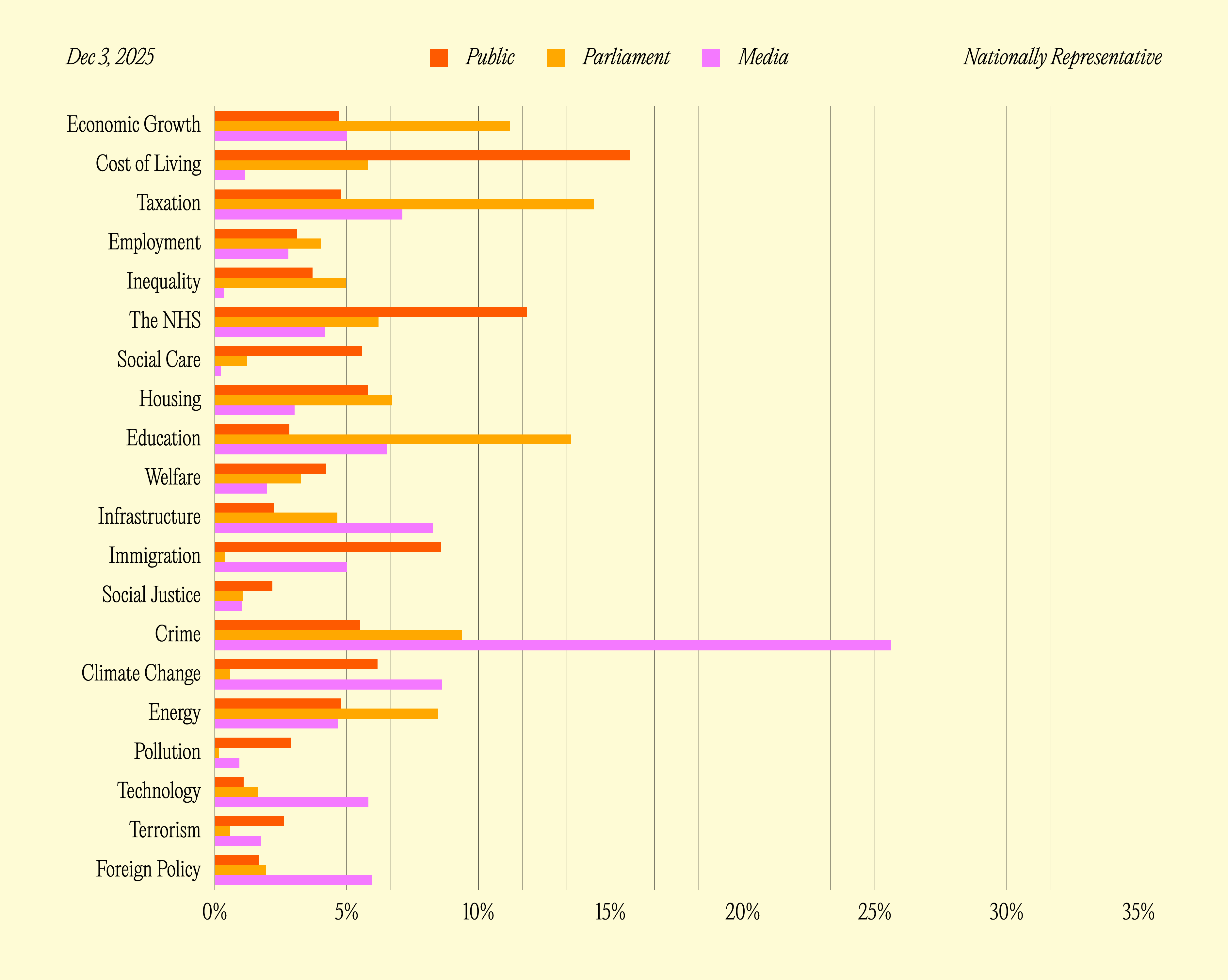
Cost of living remains the dominant public concern at 15.7%, though this represents a modest decline from the previous week's 15.9%, maintaining its position as the most pressing issue for the British public. Immigration has risen to 8.6%, continuing its sustained upward trajectory across recent months to establish itself firmly as the second-highest public priority, having climbed from around 8.1% just a week earlier. The NHS registers at 11.8%, maintaining relatively stable levels around 12% throughout the autumn period, though this marks a slight decrease from the previous week's 12.2%. Crime stands at 5.5%, showing week-to-week volatility but remaining consistently within the 5-6% range that has characterised public concern about this issue throughout the latter months of 2025. Climate change measures 6.2%, having declined notably from peaks above 8% recorded earlier in the year, whilst housing concerns rest at 5.8%, persisting at broadly similar levels since October. Taxation sits at 4.8%, representing a decrease from last week's 5.4%, and social care has increased notably to 5.6%, marking one of its higher readings in recent weeks and suggesting growing public attention to this policy area. Parliamentary attention diverges sharply from public priorities, with taxation receiving 14.4% of debate time despite commanding just 4.8% of public concern, whilst cost of living receives only 5.8% of parliamentary time against its 15.7% public weighting. Economic growth attracted 11.2% of parliamentary debate, considerably exceeding its 4.7% public priority level. Media coverage shows crime dominating at 25.6%, substantially exceeding its 5.5% public priority rating and continuing the pattern of disproportionate media focus on crime-related stories throughout recent months. Infrastructure receives 8.3% of coverage despite registering merely 2.3% public concern, whilst climate change attracts 8.6% of media attention, noticeably above its 6.2% public priority level.







































